–
文苑 雜俎 題贈 頌祝 表
FOR THE JINGWU ASSOCIATION: CONTRIBUTIONS FROM FAMOUS WRITERS, A MIX OF OFFERINGS, GIFTS OF CALLIGRAPHY, CONGRATULATORY POETRY, LISTS OF MEMBERS
[Parts Seven–Eleven of 精武本紀 The Annals of Jingwu, published Dec, 1919]
[translation by Paul Brennan, Dec, 2019]
–
文苑
[PART SEVEN] CONTRIBUTIONS FROM FAMOUS WRITERS
–
▲文
PROSE
☉技擊叢刋序 吳敬恆 稚暉
PREFACE FOR THE “MARTIAL ARTS SERIES” [which was included in Jingwu’s Tantui manual, alongside the larger piece below] by Wu Jingheng, called Zhihui
先秦射御與書數並重。漢魏載籍。狀人性行。亦每稱讀書。卽並言擊劍。或云學書不成。學劍。又不成。或射。或御。或擊劍。隨各期之風尚。其實皆卽一種鍛鍊體魄之修養術。性情務極美善。智識務極精微。體魄務極強勁。德智體三要素之薰育。新式教育家。類能言之矣。顧在世界開明。人類皆能平均發育。而吾人則狃於宋元以來之儒懦主義。號稱偏尚德。智次之。抑體而不言。馴至以薄弱之體魄。不惟智識得其粗忽。而道德亦遂不能不苟且。縱近今二十年。太半皆痛悟其非。然學校中增設體育一科。猶不過以裝飾品視之。仍屛與射御擊劍同等之體魄修養術若拳術之類者。為江湖外道。甚矣錮蔽之習之不易除也。惟精武體育會。以朝陽一鳴鳳。而以講習會之形式。實立一體魄修養術專門學校之基礎。其印行之技擊叢刊。卽體魄修養術之講義也。春間陳先生鐵生。曾囑敬恆弁一言於簡端。今連先生均度又命之。余甚愧久為儒懦主義養成之一人。體魄不完具。智識道德。遂一無所似。故雖讀叢刊。不能悉通。輒舉吾意。以告相說以解者。
Prior to the Qin Dynasty, archery and charioteering were considered to be equally as important as literature and mathematics. During the Han and Wei Dynasties, books were used to shape a person’s character, but as much as they talked of studying books, they also talked of fighting with swords. It is said [in Historical Records, annals of Xiang Yu]: “[In his youth,] he studied books, but he did not complete his studies. He quit to study the sword, but he did not complete his studies with that either.”
Archery, charioteering, and swordsmanship all followed the prevailing custom of the time. Although they are each mainly a means of physical training for cultivating a skill, they also refine the temperament, deepen knowledge, and strengthen the physique, training the three essentials of virtue, intellect, and body. Modern educators are at last able to discuss all of these things, open-minded about all that they see in the world, and people are all able to develop to the same level. But ever since the Song and Yuan Dynasties, when the effete scholar became a fixture of society, this balanced approach had become distorted. The priority was given to virtue, intellect was made secondary, and the body ceased to even be talked about. And so their bodies gradually weakened, their intellects became cruder, and their ethics inevitably slipped.
By the twentieth century, most have realized this error, and yet schools have been adding physical education courses to their curricula almost just to keep up appearances. Physical training equivalent to ancient archery, charioteering, and swordsmanship is still looked down upon, what with boxing arts being seen as the outlandish ways of itinerant performers with their rather obnoxiously arcane practices, and this view is not easy to get rid of. However, the Jingwu Athletic Association provides the clarion call to correct this course with formalized classes, establishing a foundation by way of being a specialized school for physical education.
They are now publishing a “Martial Arts Series” to supply written explanations for the physical training. During the spring, Chen Tiesheng urged me to write a few words of introduction for it. Lian Jundu has now demanded the same of me. I have long been ashamed that I have trained myself to be one of those effete scholars, weak of body, as well as intellectually and ethically inadequate. Therefore although I have read the books in this series, I am incapable of fully understanding them, and so I can only put forth my own thoughts and tell you to read what they say for yourselves.
–
☉潭腿序 汪兆銘 精衞
A PREFACE FOR TANTUI by Wang Zhaoming, called Jingwei
今之篤舊者。好言保存國粹。而騖新者則多非之。愚以為但當問其粹焉與否而已。如其粹也。豈惟當保存之。且當發輝而光大之。蓋於此世界中。知其國之粹者。莫其國之人若。知其為粹而發輝光大之。此非人類對於過去之責任宜爾。而對於將來之責任。尤不能不爾也。若徒言保全而已。則其界說。舍納商彝周鼎於博物院外。無有他義。是豈所以對於國粹之道乎。技擊者。國粹之一種也。說者謂火器興而技擊可廢。於是有倡為不必保存之說者。此其為說。無異謂舟車興而徒步可廢。其不中於事理。可以無辨。然徒言保存而已。則技擊之為物。初不能如商彝周鼎。可舉而納之博物院中。愚誠不知將操何術以保存之也。善乎精武體育會諸君子所以取技擊之術發輝而光大之者。為能見其遠而能得其要也。往者技擊之術。祕傳而已。私相授受而已。精武體育會諸君子。則易之以普及。是故昔之以為支離怳惚。累月窮年。莫可究詰者。今則知其秩然有條。可以循序而致之矣。昔之以為矯揉造作。小之傷肢體。大之傷生命者。今則知其準於生理。不惟無害。而且有益矣。惟其如是。所以方術則以研而彌精。傳布則以恢而彌廣也。邇者精武體育會諸君子。本其公開與普及之志。彙其所得。著之於書。蓋有慨夫昔之作者。非為荒誕神奇之說。卽為暴戾恣睢之言。不足發技擊之奧祕。而揚精華也。愚知此書之出。其有裨於發揮光大之用者。殆無疑矣。抑愚猶有言者。泰西人有言曰。中國之民族。平和之民族也。斯言國人樂道之。然一反顧國內陵替之狀。則又羞稱焉。夫旣曰平和。則不平之必不和可知。平和云者。處平等之地位。行互相之事業。由博愛以進於大同之謂也。故苟且偸安者不足以言平和。屈伏隱忍者尤不足言平和。明乎此。則中國民族之精神可見矣。強其筋骨。殖其能力。以貫澈其道義上之主張。不為強食。亦不為弱肉。立於世界。凜乎其不可犯也。坦乎其非不可近也。儻亦精武體育會諸君子之所望於國民者耶。敢以為序。
Nowadays, those who earnestly look to old ways love to talk about preserving our cultural essence, while those who seek out new ways usually do not. But I have to ask whether or not this stuff actually is the essence of our culture. If it is indeed our cultural essence, why merely preserve it instead of developing it and spreading it further? Throughout the world, those who understand what the “essence” of their culture is do not seem to be the ordinary people, and so it usually up to those few to spread it to the rest. However, if past generations fail in their duty to spread it, then future generations will have to take on the responsibility to do so.
If we become obsessed only with the thought of “preserving” these arts, then people will think of them as having no other significance beyond being “Shang Dynasty wine vessels and Zhou Dynasty cauldrons” [i.e. antiques]. In what way therefore are they our “cultural essence”? Our martial arts would seem to be just one aspect of the essence of our culture. It is said that because of the invention of firearms, martial arts can be discarded. Apparently there are people promoting these arts who are of the opinion that we do not need to preserve them. Their statement is just like saying that because of the invention of boats and cars, walking can be abandoned. The reasoning is no different. To talk simply of “preserving” these arts reduces them to mere objects, and yet if we cannot treat them as antiques to be put in museums, I honestly would have no idea how else to preserve them.
The experts are the gentlemen at the Jingwu Athletic Association, who take these skills, develop them, and carry them forward, able to see far ahead and do what needs to be done. Previously, these arts were passed down secretly, transmitted in private. The gentlemen of the Jingwu Association have reversed this, intent on instead spreading these arts everywhere. They have taken the jumbled mess that has been left by previous generations and worked with it, month after month, year after year, so that what could not even be examined before has now been made understandable in an orderly and systematic way, and can be learned in a proper sequence.
What was made in the past was at its least a means of injuring and at its most a means of killing. But now with an understanding of physiological principles, these arts are not only are not harmful, but are in fact beneficial. Because of this, documenting them means that they will get studied more and thus will become even more refined, and spreading them means that they will be revived and thus will get spread even further. Recently, the gentlemen of the Jingwu Athletic Association, aspiring to share and popularize these arts, are gathering what they have learned and writing it into books. Annoyed by earlier authors, they have avoided using any absurd or mystical explanations, since aggressively pretentious language cannot really express the wonders of these arts or promote their true essence. I know that when this book comes out, it will admirably fulfill the function of promoting these arts, of which I have no doubt.
I have something else to address. Westerners say that the Chinese people are a calm and peaceful people. My fellow countrymen love to repeat this, but when they actually take a look around at the nation, they instead see a state of domestic decline and are too embarrassed to admit it. When saying there is a sense of “calm” and of “peace”, it is obvious that if there is no calmness, there can be no peacefulness. “Calm and peaceful” also implies an equality of status, a mutual undertaking, a universal love on its way to becoming a utopia. To accept a situation for the sake of some sense of stability does not really qualify as a “calm peacefulness”, and to submit to circumstances and patiently endure especially does not, but it is indeed in these qualities that the spirit of the Chinese people can be seen.
They strengthen their bodies and develop their abilities to achieve a greater justice. They are not aiming to obtain tastier food or the tenderest meat, but to stand tall in the world. Looking up in fear, people do not dare to upset those who are placed above them, but when on the same level, people cannot help but go forth to face their equals. This is what the Jingwu Association hopes for the people of our nation, and it emboldens me to write this preface.
–
▲詩
POEMS
☉贈精武諸子 辛亥六月三十 李葭榮 懷霜
A GIFT OF POETRY FOR EVERYONE AT JINGWU by Li Jiarong, called Huaishuang (48th year of the cycle, 6th month, 30th day [Aug 17, 1911])
武當風歇少林遙。奪槊英雄更寂寥。十萬橫磨今一冶。可能斷臂制天驕。
輪指籠椎殺敵時。國威先取莫離支。此仇不復非黃裔。舊有張(子房)顏(習齋)兩健兒。
The winds of the Wudang Mountains have died down, and the traditions of the Shaolin Temple have become so distant.
Heroes have taken up their spears only to become the loneliest of people.
Hundreds of thousands have been wiped away and are now blurred together into this single thought,
even though they were able to stop the arms of rival forces.
Over and over again comes the call to kill an enemy,
but national prestige starts with not sacrificing domestic stability.
Revenge against other countries will do no good if there are no descendants left in our own.
Long ago there were men such as Zhang Liang and Yan Yuan, examples of heroes who learned wisdom.
–
☉題鐵生肖像 潘飛聲 蘭史
A PORTRAIT OF CHEN TIESHENG IN WORDS by Pan Feisheng, called Lanshi
秀才天下關憂樂。儒將胸中富甲兵。莫撫龍泉談往事。錚錚猶作不平鳴。
同是香江舊酒徒。燕南擊筑共嗚嗚。袖中吳越新詩本。好換金臺駿馬圖。
A true scholar in the world closes himself off from both sorrow and joy.
A scholarly general possesses in his heart an abundance of armor and weapons.
He does not merely sit around polishing a dragonwell sword and talking of past deeds.
The clanging of his sword is still to be heard, its ringing sound never fading.
He was my old drinking buddy in Hong Kong,
and in banquets he played the zither so well that everyone had to sing along.
In his pocket he keeps a new book of old poems. [This line is borrowed from “Old Shirt” by Bai Juyi, Complete Tang Poems, volume 447, poem 24, which in that case would be read as “In my sleeve is Wu Prefecture, represented by a book of new poems,” and is then followed by the line “and on the front of my jacket is Hangzhou, in the form of wine stains I got there.”]
He is worth a tower of gold and is every bit the proverbial excellent horse.
–
雜俎
[PART EIGHT] A MIX OF OFFERINGS
–
☉此中人語 盧煒昌
SOME THINGS PEOPLE SAY by Lu Weichang
(一)人謂拳術只配粗人學。
1. People say that boxing arts are only suitable for uncouth ruffians to learn.
我謂拳術非心思極縝密者不能學。蓋一拳之出。一腿之動。規律綦嚴。前後左右。斜直高低。一絲不亂。失之豪釐。謬以千里。苟非用細針密縷之手段練之。鮮有不成江湖賣藝者。拳術同志。其愼旃哉。
I say that boxing arts cannot be learned by people who do not have a very meticulous mentality. This is because for every punch and every kick, there are strict rules. Whether going forward or back, left or right, diagonal or straight, high or low, the movements are a single tidy continuity. [From the Book of Rites, chapter 26:] “Miss by an inch, lose by a mile.” Unless you are detail-oriented in your training, you will become no better than a street performer. My martial arts comrades, I hope you will take great care indeed.
(二)人謂拳術亦體操之一。體操之法甚多。奚必專心致志以研究之。
2. People say that boxing arts are just another kind of exercise, and that since there are many forms of exercise, there is no reason to give special attention to studying this one.
我謂體操之法雖多。而求其精氣神三者均能貫澈。運動時手眼身步法。同時並用者。除拳術外。余不敢贊一辭。十年來。以拳防病。以拳祛病之妙用。非身詣斯境者。其奚能知。其奚能言。環顧四周。欲言而止者再。蓋恐斥余患神經者衆也。
I say that although there are many kinds of exercise, only this kind equally involves the three aspects of essence, energy, and spirit, as well as employing methods of hand, eye, body, and step all at the same time. I cannot really bring myself to recommend any other kind of exercise beyond boxing arts. Ten years ago, I used boxing arts training to fend off illness, for which it is marvelously effective. Unless you have personally experienced this, how can you understand or have anything relevant to say about it? I would suggest that whenever people want to speak on the matter, they should simply observe and say nothing, but I suspect they would ignore my advice anyway.
(三)人謂人生以食飯為最重要。故有民以食為天之語。
3. People say that food is the highest priority in life, as it is said [Historical Records, chapter 97]: “People treat food as God.”
我謂練拳實較食飯為尤重。故生平最服膺羅斯福一言。彼謂生平一日不食者有之。從未有一日不體操者。吾國人專嗜食而不求所以消化之方。又何怪病夫徧全國。而賣藥廣告。幾占各報篇幅之太半耶。余少多病。幾致不起者屢。卒以練拳而恢復其食飯機關。故視拳較食飯為重。而飯量又藉拳而遞增。世不乏食不甘味者。盍亦移易其輕彼重此之心。而保持其天賦之眞趣乎。
I say that practicing boxing arts are actually more important than eating. I have always kept in mind something that Theodore Roosevelt remarked: that there were times in his life when he went a day without food, but that he never went a day without exercise. Our countrymen are addicted to eating and yet are not interested in methods of improving digestion. Is it not strange that there are sick people everywhere in our country and that advertisements for medicines take up half of the space in newspapers? I rarely get ill, but on those occasions when I have succumbed to illness, it is my boxing arts practice that has restored my ability to eat again. Therefore I look upon boxing arts as being primary over food, for it is the key to restoring appetite. There are people in the world who have little interest in food. Why not change their minds and help bring them back to the delight of their true nature?
(四)人謂練拳太過辛苦。幷過劇烈。
4. People say that practicing boxing arts requires too much work and is too strenuous.
我謂練拳雖苦。一經換氣之后。(練拳一月以內。四肢酸楚。名為換氣。)則覺身輕如燕。矯健無倫。久之。則鎭日如牛馬走。亦弗減其身心愉快。辛苦云乎哉。至謂劇烈。則更無當。蓋習之者。初時旣不善用力。則充其量。亦不過耗其固有氣力之半而已。以此而云劇烈。則非盡其力不飽之勞働界。早無噍類矣。冰天雪窖中之歐美戰士。將不戰而自斃矣。生理逼人。恆置之死地而後生其結果。每超出尋常理想之外。吾人其毋自餒也。
I say that practicing boxing arts is indeed hard work, but once you have gone through the experience of “converting energy” (which is used to describe the period of soreness in your limbs during the first month of the training), you will feel as if your body is as light as a bird’s, and you will be strong and vigorous no matter what comes your way. After a long time, you will be able to endure laboring all day long without feeling physically or mentally drained. Does this sound like “too much work”?
As for it being “strenuous”, that is even more inaccurate. Beginners do not really know how to exert themselves, and so they never spend more than half their energy. Can something really be called “strenuous” if people are not fully exhausting themselves and collapsing early on in their labor? During the most bitterly cold days [in the midst of WWI], European and American soldiers had to throw themselves into combat in order to keep from freezing to death. Life compels people. When put into a deadly situation, people find a way to live. The result is that they do more than they imagined they could. Never allow yourself to be discouraged.
(五)人謂習拳者必好動而喜鬧事。致為德性之玷。
5. People say that practitioners of boxing arts are restless and enjoy making trouble, lacking a sense of moral conduct.
我謂練拳只恐誤投劣師耳。否則無有鬧事者。不觀精武會十年來之成績乎。旣以體育為宗旨。其好動也只益其身心耳。庸何傷。抑有進者。每日練拳之發汗排洩。不啻濾淸其渾身之血液。血液旣淸。身心恬靜。則德性潛滋矣。精武勵志團之表示。不幾為斯語之確鑿左證乎。
I say that the only thing practitioners are worried about is getting inferior instruction and are otherwise not causing any fuss. Have you not seen the achievements of the Jingwu Association during the past ten years? The very purpose of physical education is simply to address a restlessness for benefiting body and mind. Where is the harm in that? With progress, every day of practicing boxing arts involves sweating out toxins, thereby purifying the blood of the whole body. Once the blood has been cleansed, body and mind are at peace, and then moral conduct develops by itself. This is displayed by the Jingwu Association’s Encouragement Club, demonstrating the validity of these words.
(六)人謂不體操亦可求生活。故人無體操之必要。
6. People say that because people who do not exercise also manage to stay alive, we therefore do not need to exercise.
我謂人無體操。則乏活潑進取之精神。故世界最強盛之國。無不注重體操。吾國衰弱如此。而民族又萎靡如彼。長此以往。將欲居三等國之列。亦不可得。書竟為之擲筆三嘆。
I say that people who do not exercise lack a lively and industrious spirit. This is why the most powerful nations in the world all give particular attention to exercise. Our nation is weak because of this neglect for exercise, and our people are consequently dispirited. If things go on in this way, we will never be able to escape from being a third-rate nation. This makes me want to throw my pen away from the page in disgust.
(七)人謂老年及稚年人均不宜練拳。否則必受其害。
7. People say that the elderly and children should not practice martial arts, because they will get hurt.
我謂老年及稚年人練拳。比壯年者尤為重要。因老年人筋骨日就鬆懈。苟非勤加鍛鍊。則脂肪日長者有之。肌肉漸削亦有之。不觀本會之年老會員乎。鶴髮童顏。精神飽滿。而耐苦習勞。更有甚於靑年萬萬者。至稚年適當發育之際。藉鍛鍊以暢其生機。利且無藝。害云何哉。
I say that it is even more important for the elderly and children to practice martial arts than for those in the prime of life. The muscles and bones of the elderly diminish by the day. If they do not exercise, they will gain fat and lose muscle. Why are there no “old” people to be seen in the Jingwu Association? Because those here who have gray hair also have youthful complexions, are full of spirit, and can endure hard work, sometimes even more than the younger students. As for children, they are in a time of development. If they engage in physical training at such a stage, it will boost their vitality, and the benefits of that will be unlimited. How then is this hurting anyone?
(八)人謂練拳人肢體粗壯。不能另習他種美術技能。故拳術不適合各界人士。
8. People say that practicing boxing arts toughens the body so much that it makes one incapable of engaging in other more beautiful arts, and therefore such training is not suitable for people of all walks of life.
我謂拳術為滌蕩體內汚濁之絕技。且為淸腦濾血之利器。擅此者無往不適。有學必精。歷觀各校學生成績。精於拳者。非但各科分數超越庸流。且德性之流露。亦自出衆超凡。有非他人所可比擬者。此殆生理之趨勢使然。非矯揉造作者之取快於一時也。
I say that boxing arts are uniquely capable of cleansing the body of toxins within, and are an excellent means of clearing one’s mind and purifying one’s blood. Therefore one who is good at these arts can do anything. With study comes refinement, and then you will be able to see the students in every school making great achievements. One who has mastered a boxing art is not only able to surpass ordinary people in many fields, they also have uncommonly good moral conduct. This is because going beyond the capacities of others is based on establishing physiological habits, not some artificial quick-fix.
(九)人謂練拳者終難免有藉技欺人之弊。故不如練各種普通體操。
9. People say that practitioners of boxing arts always find it difficult to avoid becoming bullies, and therefore such training is inferior to engaging in ordinary kinds of exercise.
我謂稍曉拳術門徑。當知拳為自防之技。遇敵必弗肯先事動手。反是者。必為一知半解之門外漢無疑。此拳術入門。所以貴有恆心。藉以剗除其浮燥之積習。而養成其沉毅之美德也。至普通操與拳術之比較。特於下列第十條詳述之。體育同志。幸留意焉。
I say that those who come to understand boxing arts even a little will know that it is a skill of self-restraint: when encountering an opponent, you have to be willing to not be the first to act. To contradict this idea requires the certainty of the layman – that of knowing something despite only half understanding it. It is fundamental to boxing arts that perseverance is required to get rid of habits of impetuousness and instead cultivate the virtue of being calm. About comparing ordinary exercises with boxing arts, I hope you will give attention to the content of the next item.
(十)人謂練拳四肢運用。一如普通操。何必積極提倡拳術。
10. People say that practicing a boxing art works the body in the same way as ordinary exercise, and so we do not to be so adamant about promoting these arts.
我謂此種外行語。只可向門外漢道。不足為識者言也。試一詢略得斯術之益者。拳術之好處何在。彼必答曰。其好處在氣力之出發有收束。卽技擊術語之所謂定點。練拳一生。只爭此些子定點。便足以償鍛鍊之辛苦而有餘。然此語亦只可為識者道。與習普通操者。言雖曉音瘏口。終莫可使之領會也。至運動之妙用。肢胲幷作。氣力兼施。猶裨益中之微末者耳。
I say that these are the words of a layman. Such words will only matter to other laymen and will not impress knowledgeable people. Try asking one of them what the benefits of boxing arts are and the answer will be that they develop energy and strength, having to do with what is called in martial arts “precision of touch” [explained in number 23 of the following section]. If you practice a boxing art your whole life, the hard work of training will make you more than capable of comprehending what is meant by “precision of touch”. But these words will only matter to the knowledgeable. When talking with practitioners of ordinary exercise about such things, they can understand the sounds, but the words have no meaning, and so to speak about what makes this kind of exercise special by using grand vaguenesses such as “it works all of the parts of the body together” or “it trains both energy and strength simultaneously” can end up making the benefits seem somewhat insignificant.
鐵生按。煒昌吾畏友也。鐵生號稱崛強。生平畏友。只有三人。煒昌卽其一。煒昌之令吾生畏者。非以其有力如虎也。彼能堅持戒體。不打誑語。而應世接物。固藹如焉。其道德勝我。胡能弗畏。
(Note by Chen Tiesheng: Lu Weichang is a colleague I have tremendous respect for. I call him a “pinnacle of strength”. He is one of only three people in my life that I have thought of with such esteem. What earns him my great respect is not that he is as powerful as a tiger, but that he is persistently principled. He is always honest and yet knows how to deal with worldly affairs. He is a truly amiable man, and with a sense of ethics far superior to my own. How could I not have great respect for him?)
–
☉盾墨餘瀋 陳鐵生
SOME INK SPILLINGS [i.e. written ramblings] by Chen Tiesheng
▲十八般武藝
[1] Eighteen Kinds of Martial Skills
吳枚菴東齋脞語曰。十八般武藝。一弓。二弩。三槍。四刀。五劍。六矛。七盾。八斧。九鉞。十戟。十一鞭。十二鋧。(卽鐧)十三撾。十四殳。十五叉。十六巴頭。十七綿繩套索。十八白打。(卽拳術)
Wu Meiyan [Yifeng] wrote in his Sayings of Dong Zhaicuo: “There are eighteen kinds of martial skills: 1. bow & arrow, 2. crossbow, 3. spear, 4. saber, 5. sword, 6. lance, 7. shield, 8. hatchet, 9. ax, 10. halberd, 11. whip-rod, 12. cudgel (i.e. mace), 13. swinging pen, 14. long spear, 15. fork, 16. rake, 17. lasso, 18. striking (i.e. boxing arts).”
▲與皇帝決鬭
[2] Anti-Emperor
法儒囂俄愛自由。崇尚共和。常稱皇帝拿破崙三世為蒲那伯吩先生。不曰陛下。巴西皇帝道姆庇特魯慕其才。求一見。囂俄以其為帝竟拒絕之。普法之戰。法大敗。普軍長驅而入圍巴黎。囂俄大憤。欲與普王威廉一世決鬭。以定戰局。嘗語人曰。普魯士王為歐洲之大王。而吾維克都囂俄則為歐洲之大詩人大小說家。吾二人固平等也。鐵生謂專制氣燄。已鄰末運。今更不足畏矣。
The French scholar Victor Hugo loved liberty and supported republicanism. He always called Emperor Napolean III “Mr. Bonaparte” and would not say “Your Majesty”. Even for the Emperor of Brazil, Dom Pedro II, who went to meet Hugo because he so admired his talent [and who Hugo admired in return], Hugo still refused to refer to him as “Emperor”. In the Franco-Prussian War, France was suffering a crushing defeat, the Prussian army pushing all the way through and invading Paris. Hugo was so angry that he wanted to have a duel with Kaiser Wilhelm to put an end to the war. He once told people: “The King of Prussia is one the greatest of Europe’s kings, but I, Victor Hugo, am one of Europe’s greatest writers, therefore the two of us are equal.” In my opinion, the flame of autocracy is now fading out and we finally no longer need to worry about it.
▲囚籠中之獨夫
[3] The Autocrat & the Cage
十八變之梁啟超。昔日盛稱威廉二世。譽之曰世界之鐵腕皇帝。以吾所聞。則大謬不然。威廉直一沒膽漢子。三十年前。曾見美國人撰著之萬國公報一則。謂威廉好虛譽。雅慕搏虎勇名。迺命其弄臣。預築一堅固鐵籠於上苑。威廉手獵鎗。匿焉。使圉人逐猛虎越籠前。威廉乃於籠中發鎗殪虎。惟德律最苛。有齒及温室樹者。視為大不敬。所以德人篏口結舌。外間鮮知之者云。余於獨夫隊裏。尤惡威廉。蓋多一層鄙視之印象在腦海中也。
The mercurial Liang Qichao previously praised Kaiser Wilhelm II as “the world’s iron-fist emperor”. From what I have heard, he was entirely mistaken. Wilhelm was in fact a coward. Thirty years ago, there was an article written by an American in A Review of the Times reporting that Wilhelm enjoyed a false reputation of sophistication and admiration for “having fought a tiger with his bare hands”.
Apparently he had ordered his favorite courtier to have a sturdy iron cage built in the royal garden. Having hid a shotgun nearby, he had his equerries drive a tiger into the cage, and then he went up to the cage and shot the tiger while it was inside it. However, German laws at the time were very severe against gossiping about the actions of royalty, which was considered greatly disrespectful to one’s superiors. Therefore the German people kept quiet about it and the outside world has barely heard of this event at all. As autocrats go, I particularly despise Wilhelm, who in my mind is contemptible on many levels.
▲刺客之拳術家
[4] A Boxing Arts Master who was an Assassin
刺孚琦之烈士温生才先生。粵東梅縣人。工詠春派拳術。其哲嗣偉琴君。今猶在五羊城為技擊教員。
Wen Shengcai, the martyr who assassinated Fu Qi, was from Mei County, Guangdong. He was skilled in the Wing Chun boxing art. His son Weiqin is now a martial arts instructor in Wuyangcheng [another name for Guangzhou].
▲革命黨之拳術家
[5] A Boxing Arts Master in the Revolution
黃花崗七十二雄鬼中。有拳術家。吾知之者曰林尹民先生。福建閩侯人。號靖菴。字無我。撲攻督署時。君任前鋒。彈盡繼之以拳。故能殺傷過當。
Among the Seventy-Two Martyrs in the Second Guangzhou Uprising was a boxing arts master we knew called Lin Yinmin. He was from Minhou County, Fujian, and was also called Jing’an, as well as Wuwo [“Selfless”]. When they made their attack on the governor’s office, he was right in the front, shooting until he was out of bullets and then using his fists, and therefore he was able to inflict the most casualties.
黃花崗七十二烈士中之拳術家 林尹民先生
Boxing arts master among the Seventy-Two Martyrs in the Second Guangzhou Uprising, Lin Yinmin:
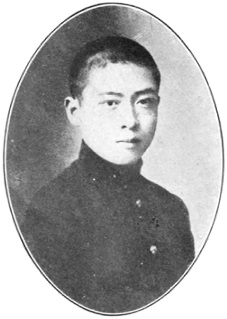
▲拆穿西洋鏡
[6] A Writer Reveals his Craft
林琴南本名羣玉。今名紓。號畏廬。平生好小說譯著。幾二百種。至佳者。技擊餘聞。金塔剖尸記。香鈎情眼。塊肉餘生述。孝女耐兒傳。賊史。滑稽外史。冰雪姻緣。其塊肉餘生而下之五種。以詼諧勝。技擊餘聞。以簡練勝。埃及金塔剖尸記。以雄渾勝。惟香鈎情眼之一種。則以拆穿西洋鏡之手段。作苦海之慈航。使彼孽海中之可憐蟲。知往古來今。不操戈矛之大盜。殺人不見血之可惡的小說家。不過自命多情。作孽害人。其所謂佳人才子。美滿姻緣。到底亦十九如香鈎情眼之悲慘結局。彼小說家。特掩住後半截。不肯講出來。騙一騙你們。弄得一時微名。搶得半甌冷飯耳。琴南此譯。特作當頭一棒。吾願今之空心才子。半截佳人無再自賊也。
Lin Qinnan, whose given name is Qunyu, but is nowadays known as Lin Shu or Lin Weilu, is addicted to translating works of fiction. He has now done close to two hundred, the most celebrated being Martial Arts Tales I’ve Heard [not so much a translation as his own notes], Cleopatra [by H. Rider Haggard] Antonine [by Alexandre Dumas (fils)], David Copperfield, The Old Curiosity Shop, Oliver Twist, Nicholas Nickleby, and Dombey and Son [each by Charles Dickens]. His writing for the five Dickens novels is wonderfully jocular, for his Martial Arts Tales I’ve Heard is wonderfully terse, for Cleopatra is wonderfully vigorous, but it is with Antonine that he most reveals his craft.
He provides a ferry of salvation across the sea of woes, giving pitiful wretches who have been marooned on it access to timeless wisdom. Just as the most artful thieves go in unarmed and the most sinister murderers kill without drawing blood, he is that kind of writer: the most. He understands that it is simply our own passions that harm others, the way a happy marriage between a beautiful woman and a talented man will most of the time end as tragically as in Antonine. Those writers who hide feelings that should be shown in the end, teasing instead of sharing, are cheating you all just for the sake of a moment of fame and half a bowl of cold rice. When Lin translated Antonine, he made a bull’s-eye. I hope the rest of today’s mindless “talents” and ugly “beauties” will stop kidding themselves about their abilities.
▲假癡假呆
[7] “Playing the Fool”
或曰。二十世紀乃有盛德壇靈學會。南人信鬼。誠不誣也。不知此正滬諺所謂假癡假呆。其手段遠出巫覡三姑六婆之上。今云盛德壇靈學會信鬼者。便是受欺。便是雙料獃子。
Someone said: “It’s truly absurd that in the twentieth century there is the Spiritual Society at the Grand Virtue Temple, a bunch of southerners who still believe in ghosts.” That person is clearly not aware of a saying we like use in Shanghai: “playing the fool”. The tricks of the Spiritual Society are not witchcraft and wizardry. Its members do not actually believe in ghosts, they simply pretend that they are that stupid. They lied about what they believe, you believed what they said, and by pretending to be fools, they have made you their idiot.
▲靈學會之變戲法
[8] The Deceit of the Spiritual Society
今日談鬼。必受通人譏誚。彼市儈旣營文明事業。又欲借鬼欺人。實無兩全之道。乃用狙公手段。以對付所謂樓臺海客金銀氣之俗物。然幻術開場必須強扯一二有名人物。以震讋此海客。故靈學雜誌第一期。卽有吳稚暉君所撰之八大人覺經箋註序一篇。惟序佛經固尋常事。不能遂云吳稚暉信鬼也。其中復有吳信一函。中有警句曰。鬼神之勢大張。國家之運告終。其預兆乎。弟甘心常隨畜道以入輪回。不忍見科學不昌。使我家土壁蟲張目。先生欲以挽世道人心。(鐵生曰、其然、豈其然乎、稚暉老友、為有道之士、以忠厚待人耳、)於鄙意所屬。適得其反云。如上所述。則吳君豈特不肯受騙。且直提撕而警覺之矣。詎料彼傖。竟藉吳稚暉三字為市招乎。當日曾通告吳君。勿再受彼傖之利用。吳君答曰。(上略)(靈學雜誌。係吾鄕某氏所編集。此等野蠻游戲。弟所不好。且對於幽室中之香燭淸供。卽起惡感。常因話舊過某氏談笑。適彼等為此。則以好奇之故。亦曾數次旁觀。總以所謂乩仙者之鄙俚。不願覩其惡狀。三月來未一往也。不識彼等近來如何。雜誌中之所載。實係事實。且某氏為弟總角狎習之友。彼以游戲登載。止之不可。故函諷之。亦具載册中。弟恐彼等揚扇迷信。已屢諷諫之。皆拒不聽。此亦守舊反動潮流中之怪現象也。聞貴會將刋雜誌。渴望早顯見於社會。亦聊可與此等不良印物針對救濟。弟何人。敢附文卷末。獎飾之處。尤汗顏。老朋友豈堪以此揶揄之耶。頃因族人修譜。暫回常州。大刋出。俟伏誦久。或有所貢獻。再求采登第二期之尾則幸矣。吳敬恆叩。)此函仍存篋中。本擬攝影刋登此册。因體吳君忠厚待人之本旨。幷彼傖之名氏亦削去。然彼傖欲以吳稚暉三字。為市招。吾亦揭櫫吳稚暉之主張於此。以破其詭謀。無使毒吾社會。
Nowadays, whenever there is talk of ghosts, it is sure to receive derision from knowledgeable people. Sordid merchants who peddle pieces of “culture” like to make use of ghosts to cheat people. It is apparently not beyond the bounds of either side [the admittedly materially-minded or the supposedly spiritually-minded] to use sneaky tricks in the vulgar pursuit of obtaining the gold and silver of naïve passersby. A session of conjuring always begins with invoking the names of a few famous characters from the past to pique the interest of the guests.
In the very first issue of Spirituality Magazine appeared Wu Zhihui’s article “A Preface to the Commentary to the Eight Mature Feelings Sutra”. His preface to this Buddhist scripture was very down-to-earth and it cannot be suggested on the basis of it that Wu Zhihui believes in ghosts. Also appearing within the magazine, there was even a letter Wu wrote, containing this admonition: “When spirits come alive, apparently it will somehow be an omen that the nation is coming to an end. While I could handle something like my soul being reborn into the body of an animal, I cannot bear to see scientific reasoning being ignored and thereby leading to pests eroding the walls of our homes.”
As for the idea that has been put forth that Wu wants to dispose of the manners and morals of the time, I do not see how this could be the case. My old friend Wu is a virtuous man, kind toward other people, and so in my humble opinion, the opposite is true. And as is made clear by his words above, Wu is someone who is not willing to be deceived, and therefore he has roused attention to make people beware such nonsense. It was a surprise then that the Spiritual Society was so rude as to actually put “Endorsed by Wu Zhihui” on their signboard! But once he was informed of this, he did not take it as rudeness. Instead he laughed and expressed himself in this way:
Concerning this issue of Spirituality Magazine, which contains some willfully misinterpreted writings by a neighbor of mine [i.e. himself], I do not care for these uncivilized games, and I have been brooding in a candle-lit room, feeling a bit malicious. I often reminisce about times he and I talked and laughed, and so for the makers of the magazine to behave in this way makes me very puzzled. I have looked it over objectively several times, and the sum of my opinion on it is: the vulgarity of spirituality is that there is such an unwillingness to look at its corrupt side that many months can go by without facing up to it even once.
I do not know what those people are cooking up lately, but at least those writings of his that they put within their magazine were based on facts. Because he has been my friend since childhood, when we used to play together ceaselessly, I feel it my duty to write this somewhat flippant letter. Alas, some things they have read in books have caused them to develop a degree of blind faith, and although I have repeatedly given admonishment for this, they will always refuse to hear. Perhaps this is just a conservative reaction on my part against strange current trends.
When I heard that this illustrious Society was publishing a magazine, I longed to quickly find out what the Society was all about, and then simply had to say something to counter their harmful ideas. But who am I to judge good or bad? I am just someone who wonders how my old friend can stomach such ridicule. Because a relative of his has recently written a book [probably still talking about himself], he will be temporarily returning home to Changzhou [in Jiangsu] to help get it widely published, and I look forward to reading it. Perhaps there will even be something in it that would be a worthy contribution to their magazine’s second issue. Yours, Wu Jingheng [i.e. Zhihui]
I still have this letter in a chest [indicating that it was written to playfully vent to a friend rather than actually sent to the Society]. I had intended to photograph it and share the image of it within this book in order to demonstrate Wu’s consideration for others, even those who have exploited his name, but although they were rude to use Wu Zhihui’s name on the shop sign, I have simply shared some of the text of his letter, thereby discrediting their scheme while not sullying the Jingwu Association by stooping all the way to their level.
▲靈學會之搗鬼
[9] The Fraud of the Spiritual Society
靈學會。盛德壇。自云能用影相鏡攝取仙靈眞象。吾精武攝學會員。見其登載於報紙者。模糊殊甚。陳公哲等。曾於七年十月三日。致函所謂盛德壇。約期試驗。(曾登載上海民國日報、本埠新聞欄中、)及期至壇。而彼所謂主任者。已用土遁法。不知何往矣。曷弗試顯彼濟顚祖師之神通。而乃竟效法土行孫耶。可笑。夫宗教兩字。能否永遠存在。猶屬一疑問。何有於鬼鬼崇崇之妖術歟。然而彼狗肉和尚。與伙居道士。又多一爭食之大敵矣。
The Spiritual Society at the Grand Virtue Temple claimed they can see spirits in their photographs. The members of the Jingwu photography class saw some of these photos published in the newspaper, which showed very blurred areas in the images. Chen Gongzhe and the others sent a letter to the Grand Virtue Temple on Oct 3, 1918, asking to schedule a time to do the experiment for themselves. (They also had the letter published in Republican Daily News of Shanghai, as well as other local newspapers.)
Once they arrived at the Temple, they were told that their director had used the art of becoming invisible and so nobody knew where he was. Chen promptly suggested they try to get his image to appear with some photographs, but this was met with another excuse, that the director had followed the example of Tu Xingsun [a fictional dwarf character who the power to disappear straight down into the ground], utterly ridiculous. How is it that religious ideas linger on even though they are always in doubt? There is no sorcery of demons and spirits, and yet Buddhist monks and Daoist priests continue to be like enemies fighting over the same scraps of food.
▲人道主義
[10] Humanitarianism
人參肉桂。號稱補品。信石馬錢。望以生畏。用之不當。其害也均等。然多人多怨信石而恕人參。則又何也。今日之日。人間何世。揭去文明之畫皮。卽是黑暗之地獄耳。孰為人道主義。孰為姑息養姦。當分別個淸淸楚楚來。不當如庸醫發藥。罔辨寒熱也。證之國手。以為何如。
Ginseng and cinnamon are known to be tonics, while arsenic and maqian are known to be poisons. When used inappropriately, any of them are harmful, but people somehow are always quick to blame arsenic and forgive ginseng. Oh what a world we are living in today. Pull away the mask of civilization and what is exposed is humanity’s hellish dark side. Who is it who is really a humanitarian? And who is simply an enabler of evil? If we guess correctly, the difference will be crystal clear, but if we guess incorrectly, it is like a charlatan who prescribes medicine even though he cannot tell the difference between a cold and a fever. How then are we to know a hero when we find one?
▲運氣
[11] About Wielding Energy
世人好言運氣。不知運氣多猴胸拱背。於專門技術中固當有此一格。然在體育上言。則外功可強健軀體。且人人能之。老的少的。男性女性。無不合宜。故持普及主義者。必主外功。
Everyone loves to talk about wielding “energy”. But they do not understand that such exercise tends to hollow the chest and round the back. Among the skill training of certain schools, this is the correct standard, but when it comes to physical education in general, it is the “external” training that is best for strengthening the body. Everyone can engage in this kind of training, and it is suitable for all, whether young or old, men or women. Therefore in the interests of popularizing these arts, we should instead be emphasizing external training first of all.
▲闢劍仙謬說
[12] Refuting Absurd Notions About “Sword Immortals”
神仙二字。絕對荒謬。況於食飯神仙哉。小說家喜言劍仙。弄成不人不鬼。總而言之。統而言之。作偽欺人耳。山華君曾撰劍血眉痕一書。其言曰。夫劍術家之所以必用劍者。取其便且利也。非謂舍劍之外。無他器可用也。今人譚劍術家。輒津津然稱道其一劍。甚或神奇之。以為劍能自飛自落。一若與人無與者。不亦傎哉。夫三尺頑鐵。豈有靈魂遽能自主。運用操縱之者。究在人而不在物也云。此等論調。便能刋落陳言獨標眞諦。
The term “immortal” is already completely preposterous in and of itself, especially in the case of those who become immortal because of something they ate. Authors of fiction love to write about “sword immortals”, turning them into characters that are somewhere between human and ghost, doing nothing more than filling the heads of readers with falsehoods. There is a book by Shan Hua called The Sword Marks the Forehead with Blood, which has some commonsense things to say, such as: “Sword masters choose to use swords because they are convenient and effective, and this does not mean that they can use no other weapon.”
However, when people nowadays discuss the sword art, they are overflowing with praise for the weapon, so much so that they can get swept away in magical tales of swords flying up and coming down by themselves, as if there is somehow no one controlling the weapon at all! Three feet of mindless iron does not have a soul or an ability to move of its own volition. The controller of its movement is the person wielding it, not the object itself. Such views can be ignored as banalities that simply distort the truth.
▲技擊
[13] Our Martial Arts
精武會。技擊之大會堂也。博物院也。南宗北派。並蓄兼收。惟於初等修業時期。有所限制。蓋植基之始。不能不再三審愼也。現在以潭腿、工力拳、節拳、接潭腿、八卦刀、五虎槍、大戰拳、套拳、羣羊棍、單刀串槍之十套為必要科。蓋經數次會議而決定者也。潭腿為基礎。其可寶貴自不待言。此蓋畢生之不可或輟者。工力拳大戰能增力。節拳能長氣。接潭腿使手足增抵抗力。套拳則競爭之實施法門矣。五虎槍為槍中之最多手法而最完善者。熟習之則臂力。腰力。足力。不覺自增。八卦刀為刀中之最難學。而最敏妙者。熟習之。將來再學對手八卦刀。則單刀之妙用。思過半矣。羣羊棍變化無窮。且活潑潑地而不犯實。雙頭棍中之不可多得者。單刀串槍。最難走步。然敏捷之至。殊妙技也。單刀與槍棍易得。而最利用。故當先習。以余觀之。尚有單拳中之十字戰、短戰、練手拳、少林拳、伏虎拳、二郎拳、對手拳中之合戰、短打、開門豹、湧步捶、兵器、之綈袍劍、雙舌槍、春秋大刀、雙鐧、九節鞭、兵器對戰之對槍、降龍棒、金剪刀槍、對手八卦刀、對手大刀、雙刀串槍、空手奪刀、皆可喜也。
The Jingwu Association’s martial arts practice hall is a museum for both the northern and southern traditions, both of which are equally cherished here. However, beginners are limited in their choices of things to work on in order to build a solid foundation. They have to carefully practice the basic sets over and over again. We currently use these ten sets as the basic requirements (decided upon through repeated discussion in Jingwu Association meetings): [1] Tantui, [2] Gongli Boxing, [3] Articulated Boxing, [4] Two-Person Tantui, [5] Eight-Trigrams Saber, [6] Fifth Tiger’s Spear, [7] Large-Scale Fight, [8] Trapping Boxing, [9] Shepherd’s Staff, and [10] Single Saber Versus Spear.
[1] Tantui is fundamental. It is something to cherish, but this of course goes without saying, and that is because it should be practiced for one’s whole life without interruption.
[2 & 7] Gongli Boxing and Large-Scale Fight can increase power.
[3] Articulated Boxing can develop energy.
[4] Two-Person Tantui causes one’s arms and legs to develop the strength for resisting against opponents.
[8] Trapping Boxing teaches practical fighting techniques.
[6] Fifth Tiger’s Spear has the most and best techniques among the spear arts. Once you have practiced it so much that you have become skillful at it, strength in your arms, waist, and legs will have developed without your even noticing it.
[5] Eight-Trigrams Saber is among the more difficult of the saber arts to learn, but is one of the most ingenious. Once you become skillful at it, you will be equipped to learn Two-Person Eight-Trigrams Saber in the future, for you will already have a good understanding of the subtleties of the weapon through the solo saber training.
[9] Shepherd’s Staff transforms endlessly and moves in a way that is very animated but not unrealistic. It is something unique among the arts of double-head staff [meaning it has same thickness at both ends instead of tapering at one end].
[10] Single Saber Versus Spear involves rather difficult footwork, but this results in nimbleness and a subtlety of skill. Single Saber Versus Spear and Single Saber Versus Staff are both easy to learn and extremely useful, but this is the one to start with.
Further sets that are also a joy to practice are: solo boxing sets such as Cross-Shaped Fight, Low-Posture Fight, Handwork-Training Set, Shaolin Boxing, Taming-Tiger Boxing, and Second Son’s Boxing Set; two-person boxing sets such as Cooperative Fight, Short Fighting, Gate-Opening Leopard, and Surging Steps Boxing; weapon sets such as Silk-Robe Sword, Double-Tongued Spear, Spring & Autumn Halberd, Double Maces, and Nine-Section Whip; two-person weapon sets such as Two-Person Spear, Descending-Dragon Cudgel, Golden-Scissors Sabers Versus Spear, Two-Person Eight-Trigrams Saber, Two-Person Large Saber, Double Sabers Versus Spear, and Empty-Hand Versus Saber.
▲都督歟苦力歟
[14] A Commander Who Worked as Hard as a Coolie
吾編精武本紀。至會員名錄。則陳其美三字赫然見於目中。因而有感焉。英士先生之任滬軍都督。每晨七時卽須到署。至夜三時。方能回寓。(先生仍寓革命總機關之馬霍路寓所、)由辛亥九月就任都督。至民國紀元之夏盡秋初。日日如是。時滬為聯軍總兵站。南方各軍。皆向之索服裝。索餉需。卽滬軍亦多至五萬。而督府初無地丁關稅。日以借款支拄軍民兩用。其苦萬狀。駕車之馬。奔命而死者兩頭。方購一汽車。以供奔走。而不知者。以為出鋒頭。當時吾輩同事舊人。日日坐候小口粮。(每兵每日銀元一角、每日發給、今日不知明日、眞是啞子吃黃蓮、)然苟欲稟呈軍事。則必偕同營軍官十餘人。齊至公寓。或督署。一見先生。卽以十餘人前後左右包而圍繞之。方能面語。否則一瞥之間。已為他人牽率他去。此何如景象也。辛亥冬。先生三入醫院。德醫克禮嘗曰。都督再不略事休息。將得腦涸病。然先生究竟不能休息至四十八小時。計當日各省飽受兵變之苦。惟上海無是。乃滬人反以惡聲報之何也。(當都府初成立時、有保皇黨人某、(姑隱其名)往求一月八十金之差事、為先生所峻拒、某遂藉其黨之機關報、肆其簧鼓、曰陳英士辛亥之冬、飲花酒至四百檯、試問如我上文所述之景况、能有此暇晷否、事不離實、水落終須石出也、)五濁世界。毀譽曾何足重。吾特憤夫國人之以耳為目。顚倒黑白耳。當時人皆視袁世凱如天帝。動曰非袁則亂。今何如哉。以兩者印證之。卽知無識者之善於吠形吠聲。
While we were putting together The Annals of Jingwu, we were astonished and very moved to find Chen Qimei among the list of members [having joined the Jingwu Association in 1910]. Chen Yingshi [Qimei] was appointed military governor over Shanghai. Every morning at 7am, he had to go to his government office, where he was occupied until 3pm, after which he was at last free to go home (his residence at the time still being the Revolutionary Headquarters on Mohawk Road [now North Huangpi Road]). From 48th year of the cycle, 9th month [i.e. Oct, 1911] until the beginning of the autumn in the 1st year of the Republic [Aug, 1912], his life was like this every day.
At that time, allied Republican forces were garrisoned in Shanghai. The troops in the southern part of the city were all in need of uniforms and provisions. The soldiers in Shanghai amounted to about fifty thousand. Because the governor’s residence initially owed no rent, he was constantly lending that extra money to support both soldiers and civilians. He was extremely overworked, rushing around so much that two of the horses pulling his carriage died, and so he purchased an automobile. While he rushed around in it, those who did not know him thought he was showing off.
In those days, our colleagues had a moment each day to sit down with a small amount of rations. (Each soldier was given a daily stipend of 1 silver yuan and 1 jiao, but since they were not sure each day if there would be a tomorrow, they silently made do with what they received.) When they wanted to discuss their troubles with their commander, they went in the company of dozens of other officers to the governor’s residence or the governor’s office to see him. Once there, they found themselves surrounded in all directions by dozens more, and so they were barely able to catch a glimpse of him when it was their turn. As soon as one person was brought forth, another was being led out, such a busy scene it was.
In the winter of 1911, he ended up in the hospital three times. A German doctor told him: “If you don’t take a rest, your brain will dry up.” But he had no chance to rest for another forty-eight hours after being given this advice. During that time, there were soldiers in mutiny throughout the provinces, but not in Shanghai, where the citizens vociferously criticized the mutineers.
(When Chen’s governorship had been established, there was a certain royalist (too cowardly to give his name) who came to Chen seeking a whole 80 gold yuan per month to run errands for him, which Chen outright rejected. The royalist then went to his party’s newspapers to spread false reports, saying: “In the winter of 1911, Chen Yingshi gave a banquet full of prostitutes, who were servicing four hundred tables. Can we in our current situation afford to be presided over by this kind of libertine? Such deeds will have an impact, the same way floodwaters will move rocks.”)
In this world of impurity [the “five impurities” of being surrounded by the disorders of the age, being prone toward a biased interpretation, getting emotional, simply being alive, and being destined to die], it is hard to truly assign praise or blame, and we are especially annoyed with our countrymen who [from Nine-Tailed Turtle, chapter 170] “pretend they have seen what they have only heard and try to turn black into white”. [Chen was assassinated in 1916 on the orders of Yuan Shikai.] In those days, everyone had looked upon Yuan Shikai as a divine ruler, saying: “Without Yuan, there is ‘luan’ [chaos]!” No one thinks this nowadays, on either side, and it is only the ignorant who parrot those words.
▲珠江派之拳術
[15] Pearl River Styles of Boxing Arts
粵東拳術。最著名者有五。曰劉、洪、蔡、李、莫。現在最流行者為蔡洪莫三家。李劉殆已失傳。或曰李卽金剛李鬍子。黃隱林。(卽黃飛龍)之所自出也。是否不可辨矣。
Among the boxing arts of eastern Guangdong, the five most famous are: Lau Gar, Hung Gar, Choy Gar, Li Gar, and Mok Gar. The most popular of them these days are the three styles of Choy Gar, Hung Gar, and Mok Gar, while Li Gar and Lau Gar are almost lost. Some say that Li Gar comes from “Golden Hooks” Bearded Li [Li Suicheng, a late Qing Dynasty martial arts master] and Huang [Wang] Yinlin (also known as “The Flying Dragon”) [a Buddhist monk who learned from Li], but whether or not this is so cannot really be determined.
▲八卦棍
[16] Eight-Trigrams Staff
蔡國祥。蔡國喜。南海人也。兄弟皆前淸記名提督。而兩人之功名。皆出於其萱堂之一枝八卦棍。從戰陣上打出來。亦一奇女子也。
Cai Guoxiang and Cai Guoxi were brothers from Nanhai [district of Foshan, Guangdong], both of whom are recorded as being provincial military commanders during the Qing Dynasty. The rank they achieved was due to their mother, herself a remarkable woman, who had taught them Eight-Trigrams Staff, which was based on a battlefield formation.
▲五點梅花
[17] Five-Petal Plum Blossom Staff
吾鄰鄕之外海。有茶菴寺。住持僧名意誠。善長棍。號稱五點梅花。意誠年八十餘而圓寂。以技授其徒曰秉心。曾卓錫海幢寺。吾粵人喜學長棍。五點梅花。剛柔相濟。誠長棍中之不可多得者。
In my hometown of Waihai [in Jiangmen, Guangdong], there is the Cha’an Temple. An abbot there named Yicheng was an expert at the set for the long staff called Five-Petal Plum Blossom Staff. Yicheng died at more than eighty years old. About his skill, his students said that he “had a firm grip on his emotions”. He once also lived at the Hoi Tong Temple [in Guangzhou]. We Cantonese people love to practice Five-Petal Plum Blossom Staff, for it uses hardness and softness complementing each other. It is something truly rare among long staff methods.
▲頭搥
[18] About Headbutting
或曰、少林寺至善禪師善用頭搥。有諸曰、此齊東野語也。然破頭捶之手法至易。彼以頭撞我。我用兩掌按其頭使往下。而提膝蓋以撞其頷。斯可矣。紮拳有此法也。
Someone said: “There’s a zen master at the Shaolin Temple who’s an expert at headbutting, but many say that his reputation is unfounded.” I said: “Well, it is after all very easy to defeat headbutting techniques.” He then used his head to try to strike me, so I used my palms to push down on his head in order make him lean forward and then lifted my knee to smash his chin, which worked just fine. This is a technique from the Tying Boxing set.
▲附會
[19] On Imagination
有喜稗官者。善附會。常曰此羅家之鎖喉槍也。此秦瓊之撤手鋧也。余曰無論稗官野乘。不足徵信。卽姑如子意。而每技必取陳死人之名而實之。何不憚煩也。吾第知此技之善。而取法之。斯已足矣。
There is a delightful storyteller who is brilliant at making things up. He would often say thing like “This is the Luo Family’s Throat-Stabbing Spear” or “This is the Hand-Hacking Lance made of Qin Dynasty jade.” I said to him: “No matter what wild tales you tell, you never have any proof. You might as well say that a girl is a boy. And you always try to back up what you claim by invoking the name of some dead person. Aren’t you afraid of getting into trouble?” I nevertheless understood there is a quality of genius to his skill and have tried to learn it ever since, and I guess that validates what he does.
▲兵器
[20] Weapons
兵器種類最多。不勝枚舉。然一器必有一器之手法。必有其獨到處。如大刀槍與方天戟三器。凡先習大刀及槍。然後習方天戟者。必易入手。蓋方天戟乃合槍與大刀之長。而參之以變化也。惟雖用槍及刀之手法。究竟與槍刀不同。分辨得出來者。方許入道。否則野狐禪耳。雙用之短兵。余最愛鐧。蓋雙刀類多擱一用一。有時竟如多一贅疣焉。單刀最妙。活潑非常。昔人有一刀化五者。惜不可考耳。一刀化三。吾黨猶有能之者。術語謂刀劈連環刀不見刀。凡對手單刀而聞鐵聲相觸者。不足學也。單刀以解腕為上法。旣已解腕。豈聞鐵聲耶。盤龍棍卽三節棍。相沿以為趙匡胤所創。或以齊眉棍為盤龍棍者非也。
There is such a variety of weapons that there are too many to list. However, any weapon will have techniques unique to that weapon, for each weapon has its own unique characteristics. Take for instance the large-saber halberd, spear, and crescent-moons halberd. If you first train with the large-saber halberd or spear, the crescent-moons halberd will be easy to learn, because it has a similar length, and so switching from one weapon to another will be rather smooth. Although you can make use of the techniques of the spear or large saber, remember that those weapons are actually different from each other. If you can express those different qualities, then you will able to perform with the crescent-moons halberd correctly, and it would not be authentic otherwise.
Of the double short weapons, my favorite is the mace. The double sabers often feel like one is put aside while the other is being used, and so it sometimes seems like one of them is too often superfluous. The single saber is exquisite, for it is extraordinarily lively. In older days, there were supposedly people who could “turn one saber into five”. Unfortunately such a level of skill cannot be verified. My colleagues seem to be able to turn one saber into three at most. This refers to the act of continuously chopping with a saber so fast that the saber just turns into a blur. The two-person single saber set commonly produces the sound of the sabers clanging against each other, which means it has not been learned well enough. The highest technique with the single saber is cutting the wrist, but when doing a cut to the wrist, there should be no sound of metal clanging against metal.
The “coiling-dragon staff”, i.e. three-section staff, was passed down from Zhao Kuangyin [the founding emperor (“tai zu”) of the Song Dynasty, hence the Taizu art]. Some people think that the eyebrow-height staff is the coiling-dragon staff, but this is incorrect.
▲男女平等
[21] Equality of Men & Women
丈夫原不受人憐。此男兒之牢騷崛強語也。獨怪今之喜言男女平等者。偏以憐惜扶助等名詞加之女界。夫男子人也。女子亦人也。同具手足耳目。苟非疲癃殘疾。何以必須憐惜扶助。而女界亦恬不為怪。受之泰然。此云平等。直欺人語耳。吾則謂苟非女子有自立之能力。必無平等之一日。而今也何如。其所謂姨太太小姐奶奶之舊界人物無論矣。卽以新人物自命者。亦復衣服鞋襪。一一講究精美。必求肖雅動人。其意何居。是亦以不平等自待而已。是乞人憐而已。易言之。則仰人顏色。仰給於人而已。吾不欲以輕薄子之中國主人婆的名詞罵人。吾竊願女界中有人格思想者之自重也。同此圓顱方趾。人人當自食其力。男女一也。仰給於人。安能平等。汪精衞先生曰。毋咎強食。勿為弱肉。古人云。夫人必自侮。然後人侮之。曷三思乎。
Men never used to accept pity from others. They expressed their complaints with strong language. It is strange that nowadays there are men fond of talking about “male and female equality” who say that women need our pity and assistance in order to have it. Look, if men are people, then women are people too. Both have hands and feet, ears and eyes. As long as they are not crippled with a physical disability, why should we pity them and give them any extra help? And yet women calmly take it for granted that they will receive such support. This kind of “equality” is just a way to cheat people.
I say that unless women are capable of standing on their own two feet, there will never be a day in which there is equality. And how do things stand at present? Regardless of what women used to be called in the old days, be it “concubine”, “prostitute”, or “housewife”, women who now consider themselves to be people with modern ideas somehow also manage to turn their attention toward clothes, shoes, stockings, becoming picky about the elegance of one item after another, in an attempt to imitate fashionable and interesting people.
Where does this kind of thinking reside? It lies in quite unequally thinking oneself to be deserving of extra favors, exploiting the sympathy that is granted to beggars. In other words, to look toward others with a face hoping to receive is nothing more than to depend on others to give. I have no wish to rail against any Chinese madams for being “frivolous”, I simply hope that among women there are indeed those who have enough character and thought to conduct themselves with dignity.
We are all the same in being a bunch of “round-headed square-toes” [i.e. human beings]. Everybody has the ability to feed themselves, men and women alike. If they depend on others for support, how can there be equality? Wang Jingwei said: “Do not blame food for being too rich, nor meat for being flavorless. [i.e. It’s down to you for how you prepared it.]” As an ancient man said [Mengzi, from Mengzi, 4a]: “A man first has to bully himself in order for other people to be able to bully him.” [For “man” here, read “woman”, the intention now being “a woman who feels that she needs special treatment will only end up making men look down on her”.] Does this topic really require any further thought?
▲八母十三槍
[22] Eight Basics Thirteen-Postures Spear
劍如飛鳳。刀如猛虎。槍如游龍。槍法為武術中之最難者。吾聞槍法有八母十三槍。所謂八母。卽劄、打、拉、劃、弸、挑、劈、鍘、也。神而明之。槍法非常矣。
The sword is like a flying phoenix. The saber is like a fierce tiger. The spear is like swimming dragon. Spear methods are the most difficult skills in martial arts. I have heard that among spear methods there is an Eight Basics Thirteen-Postures Spear art, the “eight basic techniques” being stabbing, striking, pulling, scratching, flicking, carrying, chopping, and scything, and that once these have been mastered, one’s spear art will be extraordinary.
▲定點
[23] Precision of Touch
武家言拳術貴得竄勁。吾輩易稱曰定點。蓋竄勁之竄字。意謂力到恰好。必震動而略有回勢。如礟彈出膛。礟身必有退回之餘勢也。故武術程度旣深者。拳到定點。亦復如是。以對敵言。則拳沾敵身。始發勁。未及敵身而發勁。是虛耗也。以獨習言。如直出之拳。必手臂將打直時。方用勁一衝。苟得法者。其勢必有竄回震動之餘響。俗語所謂拳風者此也。竄勁兩言。本北地土音。是否此字。不可考矣。惟再三討論。意不外此。
Martial arts masters say that boxing arts emphasize an “expelling power”. We have switched this to “precision of touch”. The idea of the “expelling” of “expelling power” is that force is applied perfectly. There should be a shock and a slight recoil, like the way an artillery shell leaving the chamber sends the barrel of the cannon back. Therefore martial artists who have attained a deep level send out their fists with “precision of touch” and then express power in this way.
When dealing with an opponent, the fist has to first touch his body in order for power to be issued. To be issuing power before touching the opponent’s body is wasted power. When thrusting your fist out during solo practice, this means that power is being expressed only at the end of the movement as your arm is straightening. Once you grasp the method, the expelling of power will vibrate back to you with a leftover sound, what is commonly called a “fist wind”. (“Expelling power” seems to have originally been a northern term. Although this cannot be verified, repeated discussion of the point indicates that this is probably the case.)
▲趙芝蓮
[24] Zhao Zhilian
趙先生直隸景縣之虎頭莊人。其師為薛先生。名字已不可考。數十年前。北地健兒。無不知趙芝蓮者。今精武會所習之潭腿、工力拳、節拳、五戰拳、八卦刀、五虎槍、皆先生所授於趙連和李振江李健民趙觀永諸君。而再傳於我輩者也。
Zhao Zhilian is from Tiger’s Head Village, Jing County, Hebei. His teacher was a certain Master Xue, a great fighter in the north many decades ago, whose first name is somehow now unknown. But everyone now knows of Zhao Zhilian, for he brought the Jingwu Association Tantui, Gongli Boxing, Articulated Boxing, the five “Fight” sets, Eight-Trigrams Saber, and Fifth Tiger’s Spear, teaching all of these things to Zhao Lianhe, Li Zhenjiang [Liancun], Li Jianmin, and Zhao Guangyong, who have since passed them on to the rest of us.
▲軟鞭
[25] Soft Whip
軟鞭最便於攜帶。而實用最難言。惟纏足之一技為最妙。一纏一拉。得心應手矣。
The soft whip is very easy to carry around, but very difficult to use. However, the skill of coiling it around an opponent’s feet is quite superb. After coiling it and then yanking him off his feet, you can do anything you want.
▲國民會
[26] Words from the Citizens’ Association
民國前一年。辛亥歲。四月。有傅豪蔣夢巖兩君。秉留東學生會之命。來滬設立國民會。作國民會進行略策。登載各報紙中。有一節曰一、宜振興國技也一國有一國之特長。能參以新法。而又能振興其特長。橫絕今日可也。夫以日本之柔道劍創術。此卑卑不足道者耳。而舉國上下。命之曰大和魂。尊之曰武士道。日俄之役。短兵肉薄。卒以制勝。可見片長薄技。苟有保存發揮之價値。萬不能聽其湮滅也。夫以中國之拳之棒之刀之鈀之弓石騎射。此中國之特長也。顧以今日。火器時代。而猶議及此。可笑實甚。不知平日旣足以鍛鍊體魄。兩軍相接。大兵之後。繼以白刃。日本因利用彼國國技而收勝俄之功。至今軍隊與各學校。朝磨夕鍊。孜孜不衰。而謂中國之國技。而無保存發揮之價値。不足以言利用也。天下有是理乎。宜創設一會。諸流並集。每流選一老師。擇德技兼優者統制全流。凡習技者。經其認定後。許於各州縣開館授徒。每年春秋兩季。羣集競技。評定甲乙。榮賞有差。各營各校。各傳習所。均須附設國技一門。如是則不至甚費。而國技武風。兩者並揚。孰便於此。近上海精武體操會之設。專以保存國技為主旨。吾國國技之振興。將濫觴於此矣。
In April, 1911, two gentlemen by the names of Fu Hao and Jiang Mengyan received orders from the Preserving-the-East Students’ Association to come to Shanghai and establish a Citizens’ Association. To advance the Citizens’ Association, their strategy was to publish articles in various newspapers. One such article was called “First We Should Promote Our Martial Arts”:
A nation has its own specialties. It can absorb new methods, but it can also further develop its specialties, even if they seem to have nothing to do with modern trends. In the case of Judo and the sword arts of Japan, this goes without saying. Everyone in their nation, upper class and lower class alike, proudly speak of Yamato-damashii [“national spirit”] and reverently speak of Bushido [“way of the warrior”]. In the Russo-Japanese War [1904–1905], it was short weapons and mere flesh that were ultimately used to achieve victory. It is clear from this that as long as “lesser skills” are considered worth preserving, they will never be lost. China has had its fists, staffs, sabers, rakes, pellet-bows, horseback archery, and so on. These are specialties of our nation.
There are those who find it laughable to discuss such things in this era of modern firearms, but they do not understand that the everyday practice of such arts is a perfect means of training the physique, not to mention that when two armies meet, the conclusion of a grand battle involves the use of naked blades. Because Japan made use of its nation’s martial arts to achieve victory over Russia, its armies and its schools now train with them from dawn to dusk, working hard and never slacking. Why then does everyone in our nation have the idea that Chinese martial arts are not worth preserving, much less actually using?
We should establish an association where all styles can gather, each style represented by a teacher selected for his superior ethics and skill. Once practitioners reach a high level, they should be permitted to open branch locations and teach students in other regions. Then every year, in both spring and autumn, there should be competitive gatherings to judge who is progressing the best, and to appreciate the differences between styles. Every barracks, school, and institute should also have a martial arts course attached to it. In this way, the goal would be achieved without great expense, and both a martial skill and a heroic attitude will spread. Who then is doing this? The Shanghai Jingwu Calisthenics Association was recently established expressly for the purpose of preserving our martial arts, and thus this is where the promoting of our nation’s martial arts begins.
▲步法
[27] Stances
技擊家之步法。粵人稱子午馬。四平馬。燕魯人則稱弓式。(弓式卽弓箭步)騎馬式。其實一耳。惟近來弓式。其弓形之足。大腿竟橫如一字。成正勾股形。以為美觀。不知大腿太低。則全身已下陷。其勢死煞。倘欲用在後之箭足。(弓箭步本稱前弓後箭、)以踢人。必有所不能。又如騎馬式。其大腿亦多作一字形。亦犯陷下之病。苟以手推之。或牽之。則仰天而倒。蓋騎馬式全憑大腿之斜勢。以支拄全身也。故慣家之弓箭步。其弓形之足。大腿斷不低下至橫平。(九十度)只可作(四十五度)之斜角。蓋小腿直垂。大腿作斜角。始得支點之支持力。(騎馬式亦然)此中有數理存焉。不能矯揉造作也。箭足須全蹠壓地。不能使蹠之外沿及足踵離地。此最易犯。常見數十年老拳師。猶不免此。且箭足多橫置。此則眞死着。苟為敵踐。必且折足。故箭足必順置而趾尖向前。則雖被踐而可乘勢跪下。斯無害矣。
When martial arts masters talk of stances, Cantonese masters say “pointing horse” and “level horse”, whereas masters from Hebei and Shandong say “bow stance” (i.e. bow & arrow stance) and “horse-riding stance”, though they are actually taking about the same stances.
However, the bow stance has recently developed the standard that the thigh of the bow-shaped leg [front leg] should be flat, the leg making a right angle, in order to be more pleasing to the eye. But it is not noticed that the thigh is therefore too low, the body already being sunk too far, rendering it a dead posture. If you want to then use the rear arrow-shaped leg (the original name of “bow & arrow stance” being “front bow, rear arrow”) to kick an opponent, you would not be able to do so.
This has always been happening to the horse-riding stance, for which the thighs are now expected to be flat, also making the error of being too low. If someone uses a hand to push or pull you, you will simply end up leaning forward or back. The horse-riding stance instead needs the thighs to be diagonal in order to properly support the whole body.
In the bow & arrow stance of the old masters, the thigh of the bow-shaped leg should never be so low that it is flat (the leg making a ninety degree angle), but should only be making an oblique angle (the thigh going only as far as forty-five degrees). With the lower leg vertical and the upper leg at an oblique angle, only then will it be a strong support (the same being true for the horse-riding stance). Simple geometry confirms this, and so it cannot be pretended that this is not true.
The arrow-shaped leg has to have its foot pressing fully onto the ground and must not allow the foot to point too far outward or the heel to come off the ground. It is very easy to violate this principle and it is often seen that even seasoned masters cannot keep themselves from doing so. The arrow-shaped leg often ends up so low that it too is almost flat, but this is again a dead posture. If the leg positioned in this way is stomped on by an opponent, it would get broken, and therefore the leg has to be positioned with the toes pointing more forward so that the leg can bend downward if stomped on, thereby preventing injury.
▲長拳短拳
[28] Long Boxing & Short Boxing
太祖長拳。綿長短打。此說由來已舊。現在燕魯間多長拳。而短拳已不多。所謂長短者。長拳用柔。短拳用剛。不能偏廢。如本會所習之少林拳、穿拳、插拳、關西拳、套拳、躺步捶、踴步六捶、劈山刀等。長拳也。潭腿、接潭腿、工力拳、合戰、大戰、短戰、脫戰、十字戰、二郎拳、孫臏拳、臥地豹、伏虎拳、節拳、紮拳、開門豹、五虎槍、羣羊棍、八卦刀、等。皆短拳也。
The original names are “Taizu Long Boxing” and “Continuous Short Fighting”. Nowadays within the area of Hebei and Shandong, there are mostly Long Boxing styles and not very many Short Boxing styles. It is said that Long Boxing emphasizes softness and Short Boxing emphasizes hardness, but really you cannot have only one without the other. Some examples of Long Boxing practiced in the Jingwu Association are Shaolin Boxing, Piercing Fists, Charging Punches, Western-Pass Boxing, Trapping Boxing, Drop-Down Boxing, Leaping-Steps Six Punches, Mountain-Chopping Saber, and so on, while some examples of Short Boxing practiced here are Tantui, Two-Person Tantui, Gongli Boxing, Cooperative Fight, Large-Scale Fight, Low-Posture Fight, Escaping-Techniques Fight, Cross-Shaped Fight, Second Son’s Boxing Set, Sun Bin Boxing, Crouching Panther, Taming-Tiger Boxing, Articulated Boxing, Tying Boxing, Gate-Opening Leopard, Fifth-Tiger’s Spear, Shepherd’s Staff, Eight-Trigrams Saber, and so on.
▲大同平等
[29] Utopia & Equality
大同世界。人類平等。此吾輩所日夕仰望者。然平等必有階梯。必去其不平者而使之平。吾輩以為。非從根本上做工夫。先使人類各個身體康健。乃以道德智識灌輸之。成就完全人格。必無大同之一日。故謂運動中之技擊術。卽平等之階梯。大同之涂徑也。
Utopia and equality of all people – this is our constant hope. However, there are steps to take to get to equality, chipping away at aspects that make us unequal in order to reach an equal footing. We believe that if we do not go through the fundamental work of first making everyone physically fit, as well as imbuing them with better ethics and knowledge, thereby building a complete moral character, then there will surely never be a day when there is any kind of utopia. Therefore we say that practicing martial arts is a means of exercise that provides a step toward equality, and thus a path toward a utopia.
–
☉謁紅花崗記 陳鐵生
VISITING SAFFLOWER RIDGE by Chen Tiesheng
紅花崗在羊城之東郊。刺客温先生生才。林先生冠慈。陳先生敬岳鍾先生明光。歸骨之所也。民國八年春。回粵剏辦精武會。與煒昌公哲蟾伯仁機漢佳唯一嘯璈踵墓前。申一瓣之心香焉。墓前有聯曰。碧血千年壯。紅花此日香。中列石槨四。(自圖之左方起。一林、二温、三陳、四鍾、)林先生炸李準於雙門底。以身殉焉。温先生槍殺滿人孚琦於東郊。陳先生亦欲炸李準而未遂。鍾先生則謀炸龍濟光而死事尤慘者也。五嶺以南。鍾靈毓秀。誕育四先生焉。迺四先生以生命購來之中華民國。見象竟如此。後死者其有負四先生矣。當時吾粵有公祭紅花崗文。曰、嗚呼。杜鵑茹恨。血花紅映珠江。精衞啣寃。汗簡靑紆玉軸。繫春郊之驄馬。低頭崇拜英雄。屠大陸之龍蛇。含笑同歸廣漠。洩天地不平之氣。增河山無上之光。先七十二士以成名。趁廿四番風而致祭。會城之東。高岡之麓。巍巍高塚。矗矗豐碑。或揮博浪之椎。或奮荆軻之劍。或擲黃衫之彈。或運聶政之鋒。倚笑城樓。忍令胡兒得志。繁興黨獄。何堪酷吏尋仇。弓在手而箭在弦。放蒼鷹之一擊。血欲沸而眦欲裂。遺梟鳥以雙丸。成敗雖有不同。功烈實相比並。喚起三百年酣夢。繼開岡上黃花。破除四千載威權。贏得墓門碧草。棠梨慘淡。知毅魄之所樓。柳絮纏綿。惜韶光之易逝。適値煙生楡柳。粥煮緋桃。正當洒熟茶薇。饌陳紫筍。旣矢誠而矢敬。其來格而來歆。邦國永寧。實勞憑式。人天不遠。鑒此悃忱。
Safflower Ridge is in the eastern suburbs of Guangzhou [about five miles east of Chrysanthemum Ridge]. The remains of the assassins Wen Shengcai, Lin Guanci, Chen Jingyue, and Zhong Mingguang are buried there. In the spring of 1919, while establishing the Jingwu Association in Guangdong, Lu Weichang, Chen Gongzhe, Yao Chanbo, Zhuo Renji, Huang Hanjia, Guo Weiyi, and Luo Xiao’ao, together with myself, visited the graves to express their devotion toward the martyrs. In front of the graves is written this couplet: “They shed their blood to keep us strong forever, making the safflowers fragrant to this day.” The graves are a line of four stone coffins (from right to left in the photo below: 1. Lin, 2. Wen, 3. Chen, 4. Zhong).
Lin tried [on Aug 13, 1911] to blow up Li Zhun [commander of the Guangdong navy] at a double-door entrance, and was killed in the attempt [by being shot to death]. Wen shot the Manchu Fu Qi [general of the Guangzhou army] to death in the eastern suburbs [April 8, 1911, and was then executed for it a week later]. Chen was part of the failed attempt to blow up Li Zhun [Aug 13, 1911, and was executed three months later]. Zhong plotted to blow up Long Jiguang [who was at that time the military governor of Guangdong], but the day after the attempt [Aug 27, 1915], he was executed.
The environment south of the Nanling Mountains produces great talents. It raised these four gentlemen who gave their lives to bring about the Republic of China. Considering the end result, the rest of us owe them a debt. At that time, we participated in a public memorial ceremony at Safflower Ridge, in which this eulogy was read:
The cowardly cuckoo swallows its suffering, but the blood of these men flowed red into the Pearl River. The mythical jingwei bird keeps filling its mouth with more rocks, but their sweat glistened as it curved away to soak the ground. With as much feeling as if we are offering a white horse in a springtime sacrificial ceremony, we lower our heads and venerate these heroes. They set to work to slay serpents slithering within the nation, rejoicing in their task even though they knew their reward would be a vastness of nothing.
To drain away some of the injustice in the world is to attain the highest glory in the land. The Seventy-Two Martyrs have earned their renown, just as the twenty-four kinds of flowering winds have spread the fragrance of spring. Gathered in the eastern part of the city on this high ridge, these proud graves are towering monuments. One of them [equating them with famous ancient assassins] swings Bo Liang’s hammer, while another lifts Jing Ke’s sword, one shoots with Huang Shan’s pellets, and another wields Nie Zheng’s knife.
Sending ridicule from atop the city walls, they decided to stop tolerating the barbarians from the north. Factions sprouted up to oppose and seek revenge against the unbearable oppression of officials. With bow in hand and arrow on bowstring, the release was like the strike of a goshawk. With blood boiling over and eyes bulging with rage, they gouged like the talons of an owl.
Whether they succeeded or failed in their attempts, the achievement in either case was the same. For awakening us from a three hundred-year dream [of bringing the Qing Dynasty to an end], there are the chrysanthemums blooming on that ridge. For smashing more than four thousand years of tyranny [bringing Imperial China as a whole to an end], the reward is graves among the greenest grass.
The birchleaf pear trees strive to thrive and we can see how determined they are to grow. The willow catkins droop in confusion and we can feel how they are destined to die young. Once the mist rises through the elms and willows, it is time to cook the ripest peaches. When the rose-petal tea has been steeped, it is time to present the freshest bamboo. They pledged their devotion and commitment. They set an example to be admired. The nation will forever have peace, thanks to their deeds. People are not that far from being divine. Just examine the sincerity of these men.
廣東紅花崗刺客墓
The graves of the assassins at Safflower Ridge, Guangdong:
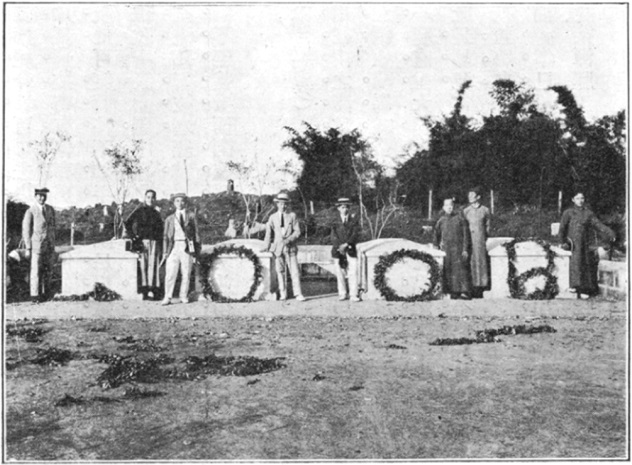
[graves from right to left:]
(一)林冠慈先生
1. Lin Guanci
(二)温生才先生
2. Wen Shengcai
(三)陳敬岳先生
3. Chen Jingyue
(四)鍾明光先生
4. Zhong Mingguang
–
☉新靑年雜誌主筆聽者 陳鐵生
SOME WORDS SENT TO THE EDITOR OF LA JEUNESSE [OR “NEW YOUTH MAGAZINE”] by Chen Tiesheng
[This is a response to 鲁迅 Lu Xun, a famous writer who was an outspoken critic of traditional Chinese martial arts.]
前面有一個極樂世界。但是要往此世界。所經過的路塗。荆棘很多。有拿火槍的強盜。有拿毛錐子的強盜。有戴禮帽穿禮服的強盜。我們欲往極樂世界。如果各個都是手無縛雞之力。就是要去。也走不動。故此先要練得一副好身手。才可以起程。才可以刈除路上的種種強盜。若然天天想望極樂世界。只是用兩片唇皮來吹。那些強盜。斷斷不會大發慈悲的。我請現在新靑年雜誌裏。那些反對拳術的人。也要聽聽我的說話。
Before us lies Sukhavati – a land of bliss. But to get to this blissful world requires passing down a path that is strewn with thorns. There are bandits with guns, bandits with pens, and bandits with fashionable clothes [i.e. people who will try to harm you with violence, others who will try to break you with eloquent insults, and others who will try to humiliate you by making you feel like you are a low-class nothing]. If we want to reach the world of bliss and yet everybody is a wimp [“hands too weak to tie up a chicken”], running away as soon as there is trouble or just too tired to keep on walking, then the first thing to do is find a means of training ourselves to be more fit. We will then be able to handle the journey, trimming away the foul weeds as we go. Wishing every day for the world of bliss is no better than mouthing the words. Meanwhile, those bandits will never show you any mercy. I now invite the contributor to La Jeunnesse who is opposed to practitioners of boxing arts to take a moment to consider my words.
–
☉試與霜風戰一場 翁耀衡
GOING OUTSIDE TO SEE HOW MUCH WE CAN WITHSTAND THE FREEZING WIND by Weng Yaoheng
韓蘄王策蹇驢於灞橋風雪中。查孝廉知強項立雪者之必能建樹。蓋有由也。精武會員。曾於八年春首。於雪中作飲冰立雪等試驗。少長咸集。怡怡如也。
From the sight of Han Shizhong, King of Qi, whipping at his lame donkey in the famous painting “On a Bridge Over Ba River in Wind and Snow”, the scholar Zha Jizuo understood that one who has the fortitude to withstand the elements will be able to make a true contribution. Based on this, some members of the Jingwu Association in the beginning of spring [i.e. early February], 1919, attempted to withstand the elements by going outside in the snow [wearing hardly anything] and drinking iced water, both younger ones and older ones gathering in cordial brotherhood.
[This is the painting that is being referred to, showing the tiny figure of Han Shizhong on his donkey in the lower right:]
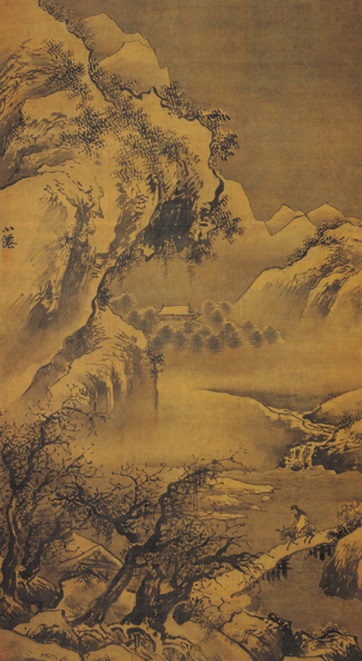
試與霜風戰一場(在舊會時)
Outside on the grounds seeing how much we can withstand the freezing wind (at the older location [1912]):
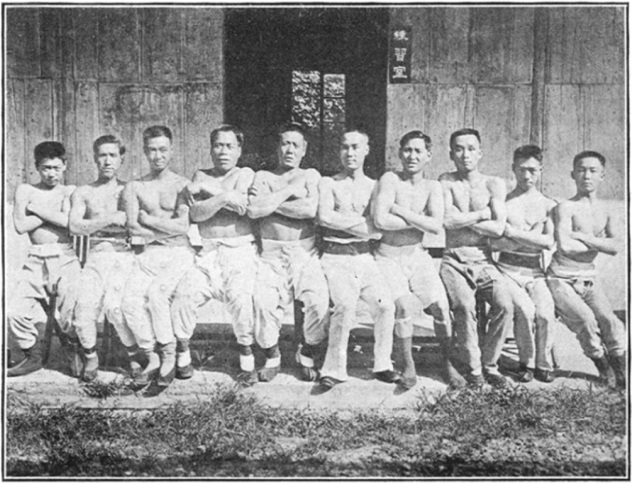
試與霜風戰一場
Seeing how much we can withstand the freezing wind [1919]:
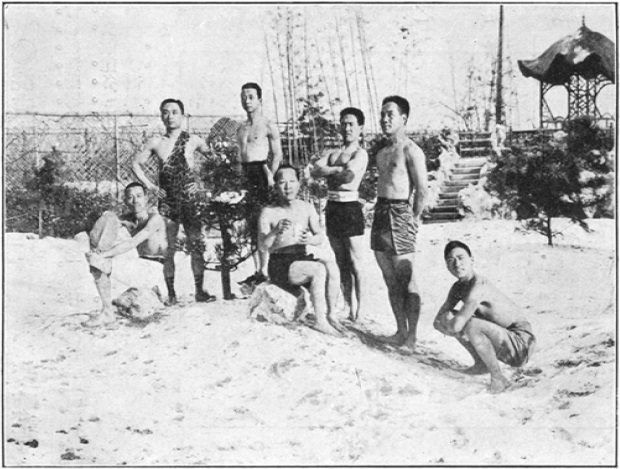
–
☉雪將軍 王漢禮
OUR SNOW GENERAL by Wang Hanli
古有雪羅漢。雪美人。宗教美術。各行其是。今以潔淨聰明之質。為英雄敵愾之姿。不因人而熱。無趨炎之心。獨於朔風凜冽中。摩頂露刃。兀然自立於此。可見一般人之心理。有今昔之殊焉。
In ancient times there was a “snow arhat” or “snow sage”, depicted in a variety of ways in religious art works. Here we have used a clean and bright material to show him in a heroic and defiant pose. Unaffected by human concerns, free of agitated thoughts, he faces the bitter north wind alone, with shaved head and naked blade, standing tall. This demonstrates the different mentality that ordinary people had in the past.
雪將軍
Our “Snow General”:
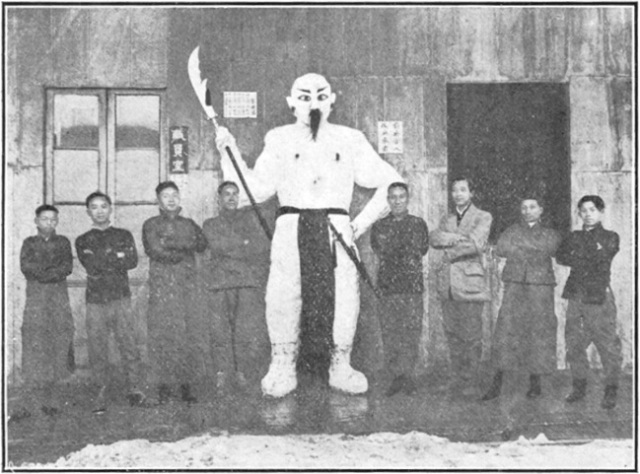
–
☉混成之游戲 黃畹香
PLAYING WITH THE TOYS by Huang Wanxiang
本會各種運動器械罔不具備。五年雙十節日。會員各手一器。以為游戲之具。儀態各各不侔。如夷退之畫記。亦佳話也。
The Jingwu Association has a comprehensive variety of exercise equipment. On “Double Tenth” [Oct 10 – China’s Independence Day], 1916, Jingwu members each grabbed random pieces of equipment to fool around with, everyone looking completely at odds with each other, like in an exaggerated painting or a charming folktale.
混成之游戲
Playing with a mish-mash of equipment [such as halberd, hook sword, spear, tennis racket, basketball, roller skate, and so on]:
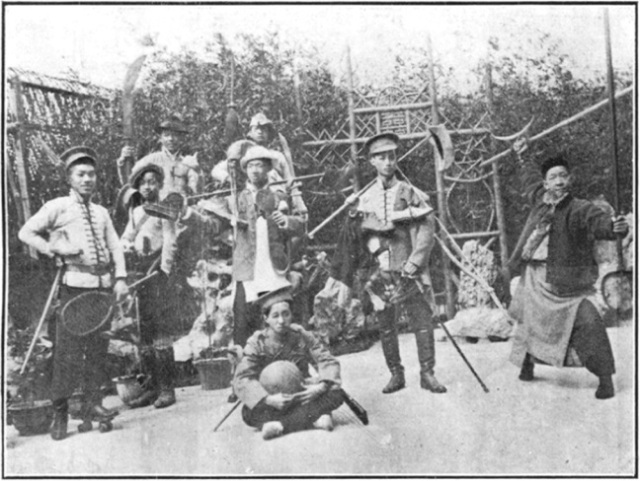
–
☉會員赴學之小車代涉 黃善祥
STUDENTS GOING TO CLASS IN WHEELBARROWS by Huang Shanxiang
本會前在王家宅。沿途多低陷地。積水盈尺。會員赴學。晨夕轆轆。以羊角車代步。此卽當時之眞象也。
When the Jingwu Association was located in the Wang Family Neighborhood, the ground was often softened under a foot of floodwater, so students went to their classes in the mornings and evenings by rumbling along in wheelbarrows instead of trudging through the muddy water – true story.
小車代涉
Riding rather than wading:
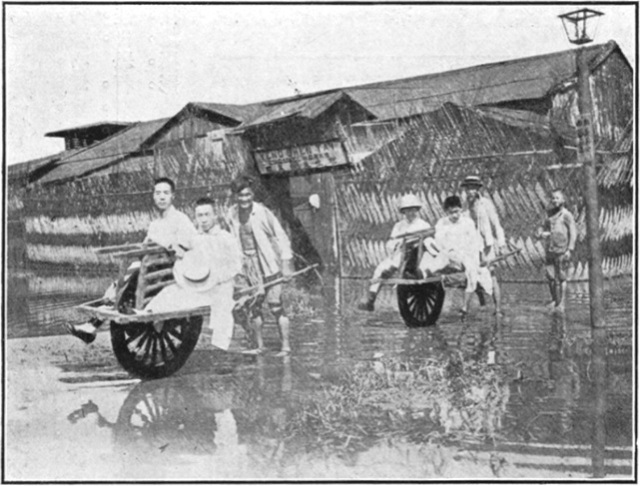
–
☉靴陣 黃癡
BOOTS IN FORMATION by Huang Chi
孔子言無恆之人。不可以作巫醫。况體育工夫之不可略有閒斷者乎。本會開幕至今。已歷十年。會員中有經年不一假者。勤劬力學。良有足多。本會為提倡勤學起見。特裒集舊靴。以資觀感。此正與桑氏鐵硯同一韻事。
Confucius said [Lun Yu, 13.22]: “A man without perseverance will never become a shaman.” It is even more true in the physical training of gongfu that one must never sit idle. Since the Jingwu Association opened, already ten years ago, the students have never slackened, diligently learning, always ready for more. To encourage hard work, the students have gathered up their old worn-out pairs of practice boots in order to make an impression. This is the same sentiment as Sang Weihan expressing his determination in ink [by writing the poem 《日出扶桑賦》 “The Sun Rises from the East” (using a term indicating the east that coincidentally contains his name, producing a pun that makes the meaning “rises from me”), after which he eventually passed the imperial examinations despite all setbacks].
靴陣
Boots in formation:
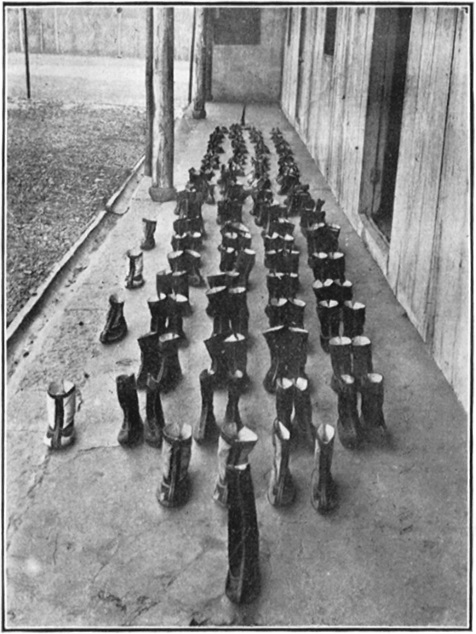
–
☉聚餐會 莫甘棠
THE DINNER PARTY GATHERINGS by Mo Gantang
本會會員。歲有增益。職業所繫。不能朝夕聚晤。亦一憾事。故本會每年就春秋佳日。舉行聚餐會。藉以聯絡友誼交換智識。誠盛舉也。此為本會聚餐後之攝影。
Membership at the Jingwu Association has only increased over the years. Regretfully, everyone gets pulled away by the duties of their occupations, and this means that people are here at different times and thus they do not all get a chance to meet each other. Therefore every year during a fine day in the spring and then another one in the fall, we gather together for a dinner party in order to make friends and exchange knowledge, a grand occasion indeed. Below is photo from one such event.
聚餐會
A dinner party gathering:
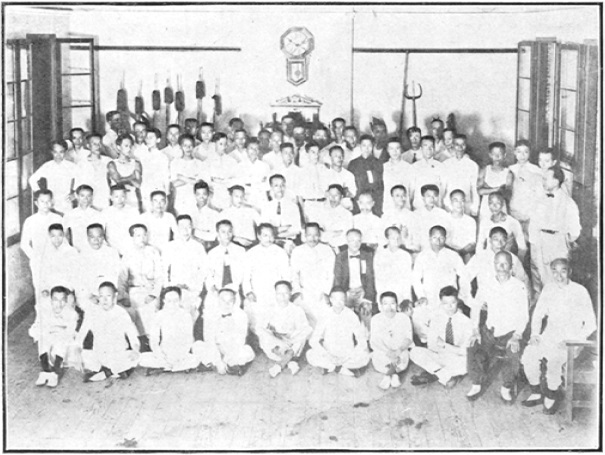
–
☉體育場之平民大會 簡偉卿
A RALLY OF THE COMMON PEOPLE ON OUR SPORTS GROUND by Jian Weiqing
今夏因外事。滬上平民。特開大會於西門之體育場。此卽其時之眞象也。然因體育場與大會。遂生一聯想焉。夫國民欲擔當事業。必自鍛鍊體魄始。物競天擇。適者生存。無可僥倖。然則國民當知所從事矣。
This summer, the common people of Shanghai actually held a rally at the western gate of our sports ground due to concern about the foreign powers. By holding their rally on our sports ground, they associated us with their cause. The citizens were demanding that there be a program of training their bodies in order to win in the struggle for survival of the fittest. Surely this could not have been a fluke. Surely they must have known that this is exactly what we do here already!
體育場平民大會
Rally of the common people on our sports ground:
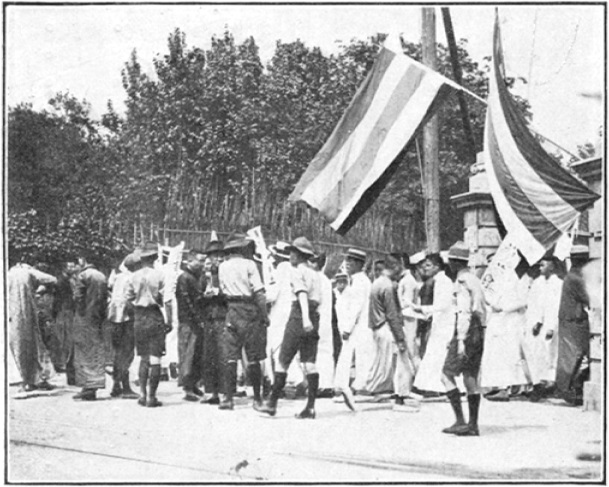
–
題贈
[PART NINE] GIFTS OF CALLIGRAPHY
–
孫中山先生題贈
A gift of calligraphy from Sun Yat-sen:
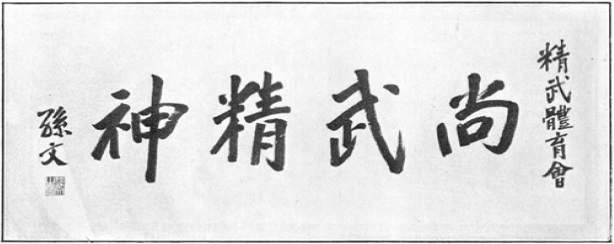
精武體育會
For the Jingwu Athletic Association:
尚武精神
“Martial spirit!”
孫文
– calligraphy by Sun Yat-sen
或曰孫先生為中華民國第一任臨時總統一經品題頓增榮寵陳鐵生曰否不然吾精武無政治臭味吾第知先生足跡遍天下為富有學識之醫學博士此旣贊成技擊必於生理上有百利而無一害增一科學上之確切證明耳
Someone said: “Because Sun is the first president of the Republic, you’re just using him to get governmental favor.” Chen Tiesheng replied: “Not at all. We at the Jingwu Association have nothing to do with the stench of politics. Nevertheless, we are of course aware that he has left his mark everywhere. As a highly knowledgeable Doctor of Medicine, he has endorsed martial arts as conforming to physiology, and has declared that these arts have countless benefits and not one harm. Such an opinion when coming from someone with such scientific qualifications means that much more.”
–
林隱靑君題贈
A gift of calligraphy from Lin Yinqing [Lin Hu]:
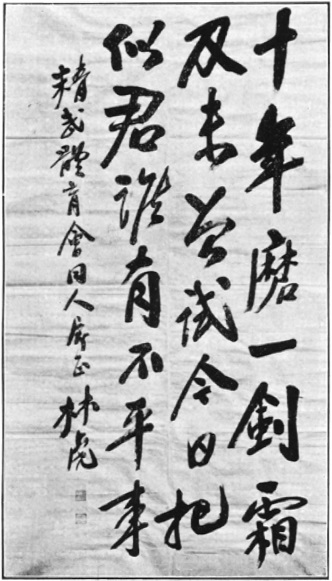
十年磨一劍
霜刄未曾试
今日把似君
谁有不平事
[“Swordsman” – by Jia Dao (from Complete Tang Poems, volume 571, poem 6):]
For ten years he has polished his sword,
but its blade has never been tested.
Now he offers his services to you,
ready to tackle injustice.
精武體育會同人存正林虎
– calligraphy by Lin Hu, loyal supporter of the Jingwu Athletic Association
林隱靑君粵東精武會之贊成人也有飛將軍之稱旣工八法尤擅技擊
Lin Yinqing [Lin Hu] is praised as an accomplished gentleman at the Guangdong Jingwu Association, where he is known as “Brave General”. He is skillful at calligraphy and is especially good at martial arts.
–
王秋湄君題陳公哲像
Calligraphy by Wang Qiumei, in praise of Chen Gongzhe:
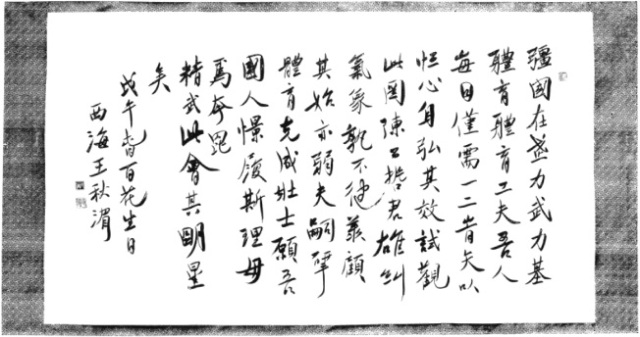
彊國在武力武力基軆育軆育工夫吾人每日僅需一二旹矢以恒心身弘其效試觀此岡陳公哲君雄纠氣象孰不徤羡顧其始亦弱夫嗣揅體育克成壯士願吾國人憬履斯理毋焉本昆
精武此會其明星矣
戊午旾百花生日 西海王秋湄
The strength of a nation lies in its military force. But the might of a military is based in physical education. Physical education requires hard work, but our people only want to go through an exercise once or twice each day, which is just not enough. Perseverance in mind and body will bring vast results. Just look at Chen Gongzhe. How can we not deeply admire him? He started out with a frail body, but then he studied physical education and became a man of heroic stature. I hope our countrymen will start following his example and stop being such fools. He is a shining star of the Jingwu Association.
- calligraphy by Wang Qiumei of Xihai, 55th year of the cycle, spring, Flower Festival [12th day of 2nd month] [i.e. Mar 24, 1918]
–
朱執信先生題贈
A gift of calligraphy from Zhu Zhixin:
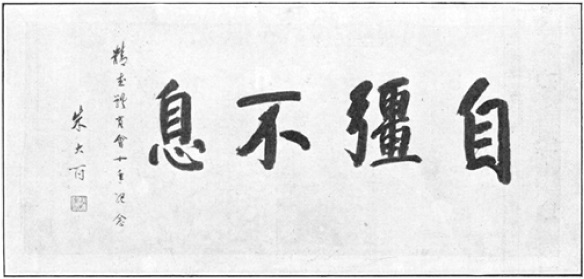
精武體育會十年紀念
In commemoration of the Jingwu Athletic Association’s tenth anniversary
自彊不息
“Ceaselessly improve yourself.” [Book of Changes, hexagram 1]
朱大符
– calligraphy by Zhu Dafu [Zhixin]
–
浙江魏君題贈
A gift of calligraphy from Wei Yu of Zhejiang:
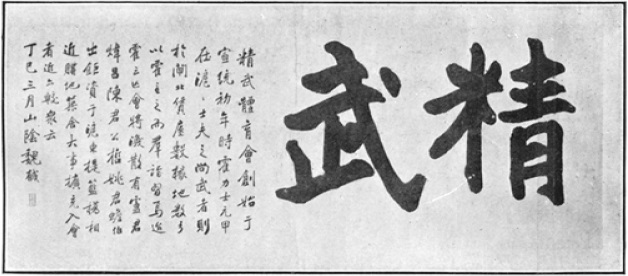
精武
Jingwu!
精武體育會創始于宣统初年時霍力士元甲在滬•士夫之尚武者則於閘北賃𡢏掾地数弓以霍立之而羣詣會焉迨霍去世會將渙散有𩄅君煒昌陳君公哲姚君蟾伯出鉅資于滬東提籃橋相近購地築舍大事擴充入會者近無較衆云
丁巳三月山隂魏戫
The Jingwu Athletic Association was founded in the first year of the reign Emperor Xuantong [1909] by the mighty Huo Yuanjia in Shanghai. He had a reverence for martial arts, and so he rented a building in the Zhabei District, together with the adjacent grounds, in order to establish a place where people could come to learn. Alas, he soonafter passed away, and his Jingwu Association might have faded with him were it not for Lu Weichang, Chen Gongzhe, and Yao Chanbo. They have contributed huge sums of money to purchase grounds in the Tilanqiao Neighborhood in eastern Shanghai, building a space even bigger than before, and membership has now expanded to numbers almost beyond counting.
– calligraphy by Wei Yu of Shanyin County [in Zhejiang], 54th year of the cycle, 3rd month [Apr/May, 1917]
–
會長題詞
Commemorative calligraphy made by Jingwu Association president Zhu [Qinglan]:
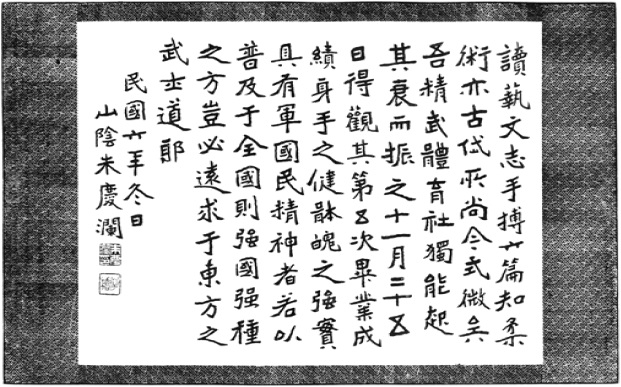
讀蓻文志手搏六篇知柔術亦古岱㪽尚今式微矣吾精武體育社獨能起其衰而振之十一月二十五日得觀其第五次畢業成績身手之健骵魄之強實具有軍國民精神者若以普及于全國則強國強種之方豈必逺求于東方之武士道耶
民國六年冬日 山陰朱慶瀾
In the “Bibliographical Records” [of the Books of Han], there is mention of “six chapters on bare-handed fighting”. From this we can know that the “soft arts” were held in esteem in ancient times. But today they are in decline. Our Jingwu Athletic Association alone is able to rouse us from our feebleness. On Nov 25, I got to see their 5th Graduation Ceremony celebrating the achievements of the students, their fitness of limb, their strength of body. Indeed they possess the spirit of dedicated soldiers and proud citizens. If what they are doing is spread throughout the nation, we will be on our way to being a strong nation and a strong people. Why should we look any farther east to find Bushido?
- calligraphy by Zhu Qinglan of Shanyin, winter solstice, 1917
–
花籃 崇德女校籌款補助學生會時贈本會者
Here is also a flower basket presented to us from the Chongde Girls’ School as part of a fund-raising campaign to subsidize their Student Union:
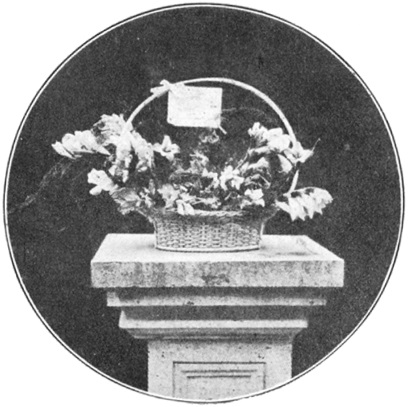
各界贈品
Other gifts we have received from various organizations:
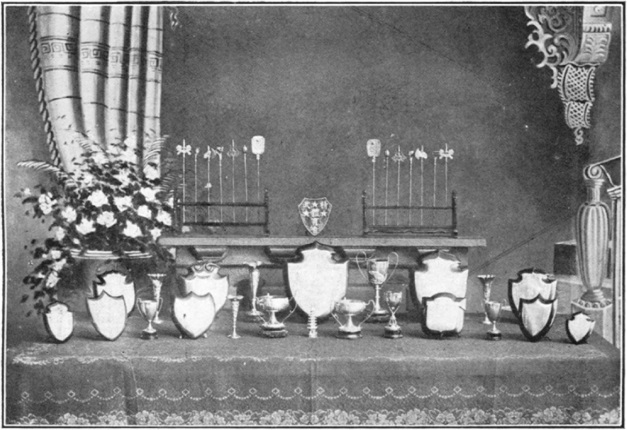
–
頌祝
[PART TEN] CONGRATULATORY POETRY
–
▲頌詞
WORDS OF PRAISE
☉上海中區商團
From the Shanghai Central Business Group:
維中華民國元年十月二十七日為精武體操會畢業大會之期敝同人猥荷柬招幸何如之茲舉代表詣前仰瞻盛典敬進一詞以為之頌曰
On Oct 27, 1912, the Jingwu Calisthenics Association held its graduation gathering. Many of our colleagues received invitations to it, and so we sent representatives to attend the grand occasion. We respectfully offer this poem in honor of the event:
巍巍精武起振雄風桓桓衆士遑恤我躬
縱橫南北馳驅西東貴會畢業世界爭雄
衞我同胞咸仰諸公前途進步懽祝無窮
The great Jingwu Association
inspires a heroic bearing.
To all of these mighty warriors,
we bow in deep respect.
Their reputation has raced north and south,
galloped east and west.
This noble assembly of graduates
can compete against the whole world.
Defenders of our compatriots,
we admire them all.
For their future progress,
we heartily offer our endless good wishes.
☉韞懷商團
From the Store & Cherish Business Group:
中華民國元年歲在壬子十月為精武體操會舉行畢業盛典迺荷柬招無任欣忭敝會同人恭逢斯盛曷勝榮幸敬獻頌詞略伸鄙忱
In Oct, 1912, the Jingwu Calisthenics Association held its grand graduation ceremony. We were all overjoyed to receive invitations to such a grand occasion and could help but feel honored. We respectfully offer this poem to give some sense of how deeply impressed we are:
造新中國翳維共和惟我精武技藝進步
晨夕習練精神尚武茲屆畢業如龍如虎
桓桓壯士赳赳武夫拳術採新韜略貫古
高山景仰欽佩羨慕觀光盛典全體歡呼
The act of building a new China
is made of working together.
Because we have the Jingwu Association,
we see that martial arts are the way forward.
From dawn to dusk they have trained,
steeped in martial [“wu”] spirit [“jing”].
Now they are graduating,
having become like dragons and tigers.
They are martial heroes,
valiant warriors.
Their boxing arts may have a touch of the new,
but their military strategies are steeped in the old.
As though looking up at mountains,
we are filled with respect and admiration.
The ceremony is a grand occasion
and the whole assembly erupts in acclaim.
☉洋布商團
From the Machine-Woven-Cloth Business Group:
精武體操會霍元甲先生之所組織也先生以勇力著聞上年在張園比武中西人士咸敬仰之後辦精武體操會一時海內健兒聞風而至者頗不乏人後先生於夏間感冒暑氣致疾而歿今日體育完備舉行畢業皆先生首創之功也是不得不有以頌之頌曰
The Jingwu Calisthenics Association was formed by Huo Yuanjia. His powerful skills made him famous. During a martial arts competition held in Zhang’s Garden [in Shanghai, named after Zhang Shuhe who built the park], both Chinese people and Westerners all praised him. Then once he had set up the Jingwu Calisthenics Association, the best fighters throughout the nation were soon coming to visit him, hardly a day going by without them. He later caught a cold during the summer, and the summer heat then exacerbated it into a more serious illness and he died. But the state of our physical education is now in excellent condition, complete with demonstrations and graduations, all due to his pioneering work. We think this at least deserves a few lines of praise:
旣精且武有力如虎操法整齊爭先快覩
軍樂洋洋彩旗飛舞勇悍絕倫實堪禦侮
Both spirited and martial,
the members of Jingwu are as powerful as tigers.
With their methods of training in good order,
they strive to be the best and have a keen eye for what it takes.
Their military music fills the air.
Their colorful banners are flying high.
They are bold and peerless.
This is how we will resist foreign aggression.
中華民國元年十月二十七日
(Oct 27, 1912)
☉復旦大學祝詞
Two poems of congratulations from Fudan University:
(一)
Poem 1
先聖尚六藝射御皆必修文事與武備古人恆並優
降及晚近世士風習惰偸蜷伏蠹簡中毛錐弄纖柔
縛雞力不贍聞雷箸或投又其下焉者聲色恣盤游
志氣自昏憊生命同蜉蝣坐是種自弱國土虧金甌
東亞病夫名錫我良有由桓桓衆英豪申浦樹徽猷
設會究體育國技窮源流精誠貫日月武力移山邱
揭櫫曰精武名實而不浮教澤思廣被先為吾校謀
洸洸趙夫子材器雄無儔多士得良師進步超驊騮
晨鍛復夕鍊體魄自精遒可以禦寒暑孱弱今無憂
六年冬之孟氣候猶淸秋大開運動場萬衆豁雙眸
技也進乎道觀者舌不收方知大華風泱泱冠五洲
吁嗟國步艱未雨宜綢繆干城有公等庶足同戚休
所望亟推廣徒侶徧九洲揚我大漢聲一洗文弱羞
敝校雖不敏願言修干矛鼙鼓一朝鳴與子賦同仇
Ancient wise men valued the six classical arts,
among them archery and charioteering being given particular emphasis.
In both civil and military matters,
ancient people had perseverance and excellence.
Moving ahead to more recent times,
scholars had developed a habit of idleness,
hunched over old books
or making overly timid calligraphy.
They became too weak to tie up a chicken,
or dropped their chopsticks in fright upon hearing thunder.
These inferior men
also lost themselves in debauchery.
Their ambitions dried up
and their lives shortened.
And while they sat around until their bodies atrophied,
the nation started to lose territory.
The “sick men of Asia” we were called,
and quite rightly.
It is martial prowess that makes men heroes.
Thus a banner has been hung in Shanghai near the Huangpu River [the main Jingwu location being about half a mile north of the river].
The Jingwu Association was established for studying physical education
and bringing martial arts all the way back to their source,
with the kind of spirited sincerity [“jing”] that makes the sun and moon shine,
and the martial [“wu”] prowess that can move mountains.
And so its name became “Jingwu”,
a name with meaning instead of superficiality.
To have such a strong influence through education
is likewise a basic strategy of our own school [the name Fudan meaning “renewing the light”].
Master Zhao [Lianhe] shines.
His abilities are without peer.
Many students have obtained good teachers,
but he can help students advance past the fastest horse.
He trains in the morning, and then practices in the evening,
and so naturally his body is incredibly fit.
Able to fend off either the bitterest of cold or the most oppressive heat,
he once had delicate health, but now he has nothing to worry about at all.
First month of winter [i.e November], 1917,
when the climate is still made of crisp autumn air,
the sports ground opens up
and the crowds are everywhere to see.
Seeing skill that approaches the very Way itself,
the spectators cannot stop cheering.
For the first time, they feel the greatness of Chinese culture,
a magnificence that tops the rest of the world.
Alas, our nation’s true condition remains one of great difficulty,
a case of hoping for a crop even though it has not rained.
Defending our cities depends on all of us,
many feet marching off to face our joys and sorrows together.
We hope to spread these arts far,
to everyone everywhere in the nation.
Let us call out with a proud Chinese voice
and wash away the shame of ever having been so frail.
Although our school may not be the best,
we want to repair our weapons,
beat the drum to announce a new dawn,
and together fight the common enemy.
精武體育會諸先生以尚武之精神保中華之國粹義務施教口不言勞本校技擊部諸生荷貴會教員趙振羣先生熱忱教授成效日彰六年十一月貴會秋季大運動同人瞻仰之餘心悅誠服賦茲頌美兼謝嘉惠焉
Everyone at the Jingwu Athletic Association has a martial spirit, is intent on preserving Chinese culture, and attends to their teaching duties without ever complaining about how exhausting it must be. All the martial arts students in our school have enormous esteem for Jingwu Association instructor Zhao Zhenqun [Lianhe], whose enthusiastic instruction has produced results that show each day. In Nov, 1917, during the Jingwu Association’s big autumn athletic meet, we wanted to show him further appreciation, and so we joyfully presented him with this poem as a way to praise his achievements, and to express our gratitude for the benefits we have received.
(二)
Poem 2
技擊為國粹學之一所以強體魄習勤勞免六淫禦暴客道至要也自戰器革新軍中以是為無用棄而不講久矣抑知兩軍相見窮夜搏鬭苟無堅強之魄力耐勞苦之精神寧易言最後之勝利乎是則新軍之中正未可盡棄舊學矣同人於普習兵操外多有志研究茲術藉植練身衞國之基特以良師難得物色有年今歲春始蒙趙振羣先生涖校施教先生為精武體育會教員國技絕倫尤熱忱於教育鑒本校經濟之絀願不受俸資義務教授對於諸生循循善誘以故不數月而成績煥然同人欣感之餘敬綴俚辭藉揚盛美頌曰
Martial arts are the essence of our culture. Learning even one of these arts gives you a vital means of strengthening the body, becoming accustomed to hard work, fending off the “six extremes” that cause illness [heat, cold, dampness, dryness, wind, and “fire”], and resisting against attackers. Unfortunately since the modernization of the military, these arts became seen as useless and are hardly even talked about anymore. But it has to be understood that when two armies fight in the darkest of night, the one that lacks a bold audacity and a hardworking spirit will have the most difficulty in achieving victory. Therefore the modern military must not entirely abandon this ancient knowledge. Colleagues who are engaged in military training often aspire to complement it with a study of these arts, understanding that it is the basis for training the body and defending the nation.
However, it is very difficult to find good teachers and we spent years looking for one. Then finally this spring, Zhao Zhenqun [Lianhe] came to us. An instructor from the Jingwu Athletic Association, his martial skills are peerless. He is also a particularly enthusiastic teacher, so much so that upon noticing that our school was having financial difficulties, he insisted on not receiving a salary. He teaches students patiently and systematically, and therefore after just a few months, we have had amazing results. To show our deep appreciation, we have put together a poem in very direct language in order to better express our praise for him:
先生之德恭儉温良先生之貌端厚齋莊
先生之技虎躍龍驤先生之教春雨秋陽
易我筋骨反弱為強益我膂力用柔摧剛
靜以蓄氣動必有方內以衞生外禦強梁
茲道不廢邦家之光猗歟先生嘉惠曷忘
His attitude
is gracious and kindhearted.
His behavior
is sincere and respectful.
His skill
is like a tiger leaping, a dragon soaring.
His instruction
is like spring rain and autumn sunshine.
He has transformed our sinews and bones
from weak to strong,
making us so powerful
that a response of softness is enough to defeat hardness.
In stillness we will store energy
so that in movement we will perform perfectly.
Internally this produces health
so that externally we can resist tyranny.
These arts are not useless,
they are the glory of our nation.
And this great man
has brought us benefits without end.
☉廣肇公所祝精武體育會十週紀念
Good wishes from the Guangzhou-Guangdong Public Affairs Office, in commemoration of the tenth anniversary of the Jingwu Athletic Association:
國於斯世 貴在尚武 優勝劣敗 弱奴強主
繄我中華 立國已古 文化雖優 弗強奚補
偉哉茲會 大勇可賈 率義守常 武德是輔
力挽狂瀾 中流砥柱 磨劍十年 聲施彌溥
國威孔張 民氣斯吐 咄彼羣雄 孰敢予侮
勗哉斯會 國民先導 於萬斯年 昭茲來許
Our nation in this generation
values a martial sensibility,
because only the strong survive,
whereas the weak will end up enslaved.
Our Chinese nation
was founded so very long ago,
and although our culture is superior,
it seems not quite tough enough, and how do we fix this problem?
With the mighty Jingwu Association!
There is great courage on offer,
a tradition of leadership
with martial virtue to back it up.
It stands amidst the pounding waves,
centered and immovable.
After polishing their swords for ten years,
their fame will only extend ever farther.
Their prestige has spread throughout the nation.
Public morale is boosted when people speak of it.
Insult such a potent organization?
No one would dare!
Encouragement lies with the Jingwu Association,
setting the people an example.
Forever
it will shine.
–
▲贈詩
GIFTS OF POETRY
☉贈盧君煒昌 徐峙崧
A Gift of Poetry for Lu Weichang from Xu Zhisong
敕勒聲中壯志存。高樓一曲月無痕。隨身匣裏龍泉在。此是平生未報恩。
That poem about the voice of the Chi’le people manages to retain lofty ideals, [This is referring to “Chi’le Songs Fill the North” by Wen Tingyun (Complete Tang Poems, volume 577, poem 56).]
but he leaves the moon of that “lofty tower” poem completely outshined. [This is referring to a line from Wen’s poem “Gift to a Youth” (Complete Tang Poems, volume 579, poem 3): “The moon shines, a lofty tower, and a (drunken) song to it is sung.”]
Inside the case he gave me is a dragonwell sword.
For the whole of my life, I will never be able to express my gratitude.
☉贈陳君鐵生 徐峙崧
A Gift of Poetry for Chen Tiesheng from Xu Zhisong
時艱空抱賈生憂。曾上元龍百尺樓。話到滄桑同感慨。昂頭誰與白雲游。
翩翩裘馬憶當年。蒿目中原猛着鞭。却羨此身經百鍊。不須換骨也神仙。
In troubled times, there is nothing to rely on, and so businessmen start to worry.
He preferred instead to “ride the primal dragon to the top of the hundred-foot tower” [which is the first line of a piece of verse by Shu Wei, from volume 15 of his Diet of Water collection of writings].
But it is said, and how true it is, that “seas recede to become mulberry fields” [meaning that time brings great changes, the first version of the saying appearing in Ge Hong’s Bios of Immortals],
He looked up no longer recognized himself wandering in the clouds.
Seeing parade of decadence as he looked back through his years,
he then gazed into the distance and decisively changed his path.
Now we admire him because he has gone through such hard training.
He does need to be turned into an immortal, for he has already become one.
☉贈陳君公哲 徐峙崧
A Gift of Poetry for Chen Gongzhe from Xu Zhisong
愛國男兒好身手。肯容湖海一投閑。憑君高唱天山曲。月照弓刀雪滿關。
He is a patriotic man, a great athlete,
willing to take on burdens at the expense of his leisure.
Praise him loudly, echoing all the way to the Tian Shan mountains in the west.
He is like the moon shining with its a curved blade, brightening the snow that falls on the passes.
☉贈周君錫三 徐峙崧
A Gift of Poetry for Zhou Xisan from Xu Zhisong
時局如棋尚未休。憑將舌劍遏橫流。漫言傲骨難諧俗。策馬高歌滿地秋。
He looks upon the current situation like a game of strategy and will not rest until it is won.
With his silver tongue, he could even hold back the tide.
With his lofty speech and noble bearing, he can hardly be classified as an ordinary person.
Instead he is more like one who is racing along on a horse and singing out with such gusto that everywhere the leaves fall to the ground.
☉贈羅伯夔君 徐峙崧
A Gift of Poetry for Luo Bokui [head of the medicine class] from Xu Zhisong
曾聞席上稱才子。又見壺中隱姓名。豪傑沈淪良相少。且留教澤惠羣英。
I once heard of a scholar that everyone called a genius,
and then I saw him amidst his pots for cooking medicines, shying away from fame.
Heroes have faded away and good men are now few,
but the influence of education is clearly able to produce more.
☉俠士行 為精武體育會作 沈夢軒
“Heroic Deeds” – written for the Jingwu Athletic Association by Shen Mengxuan
造物無情何足數。生生滅滅自今古。名世輩出無定期。千年碧血成焦土。
牧馬南下憶淸廷。叔季以還令不行。人為刀俎我魚肉。頭顱有價嘆無能。
河嶽精靈鍾義俠。霍子挺生曰元甲。講武願以衣鉢傳。濟濟英才受惠洽。
風雨雞鳴日未長。名師殂謝啓彷徨。衆心肯把前功棄。夙夜憂勤謀始臧。
而今赫然在耳目。精武子弟自多福。三遷往事堪回首。歷劫幸免滋謗讟。
春江尚武樹先聲。學子工商相抗衡。帝業旣隨流水去。雄風常與曙光爭。
吳粵健兒身百鍊。馳馬吹笙資排遣。偶及文事也臨池。蛟龍戲水經萬變。
英雄何必起屠狗。好客胥稱萬戶侯。遹皇典麗一登堂。列㦸更兼戈與矛。
多土咸能知自奮。十年生聚古有訓。百尺竿頭覘進步。盍且以之占國運。
Nature has no mercy and does not care if we fade away.
It has been producing and destroying since time immemorial.
Every new generation emerges with no guarantee of time,
through thousands of years of shedding blood and building war-torn lands.
Heading south on their horses, the Manchus established their government,
but since the end of their dynasty, their ways no longer matter.
When some people become like knives and chopping blocks, the rest of us become like fish flesh,
though while the heads are considered to the best part of a fish, human heads turn out to be useless once cut off.
The spirits of the rivers and mountains have brought forth chivalrous warriors.
One such upright gentleman was named Huo Yuanjia.
He trained in martial arts and then passed down his legacy.
Numerous heroes have received the benefits of his teachings.
Falling into alarming ill health, his time did not last long.
When this famous teacher passed away, it left his students in confusion.
They all wondered if they should just let his achievements die with him,
then after spending days and nights in constant anxiety, they at last came up with the ways to continue.
And now they are so impressive to eyes and ears.
The Jingwu students have received many blessings indeed.
Having to move their location many times has not discouraged them at all,
nor any amount of misfortunes, close calls, or slanders.
A renewed esteem for the martial quality is setting the tone for what is to come,
though students and businessmen may be at odds with each other over how best to proceed.
The imperial ways have flowed away like water,
but still a strong wind often contends with the new dawn [by moving clouds in front of the sun, i.e. there are still looming threats to deal with].
These athletes from Jiangsu and Zhejiang, Guangdong and Guangxi, have trained their bodies to perfection.
They can run around like horses and still have enough breath to play reed pipes, so much fun are they having.
They also study literature, as well as calligraphy,
for when “the flood dragon plays in the water”, it transforms endlessly.
Heroes do not need to slaughter dogs,
instead they are amiable and treat others as gentlemen.
They behave as if climbing steps toward an audience with an emperor,
calmly passing along lines of weapons.
Their abilities prove their determination,
their ten years of hard work steeped in ancient wisdom.
Always forging ahead, their progress is clear,
and they reveal the destiny of the nation.
–
東亞體育學校祝詞
CONGRATULATIONS FROM THE EAST ASIA ATHLETIC SCHOOL
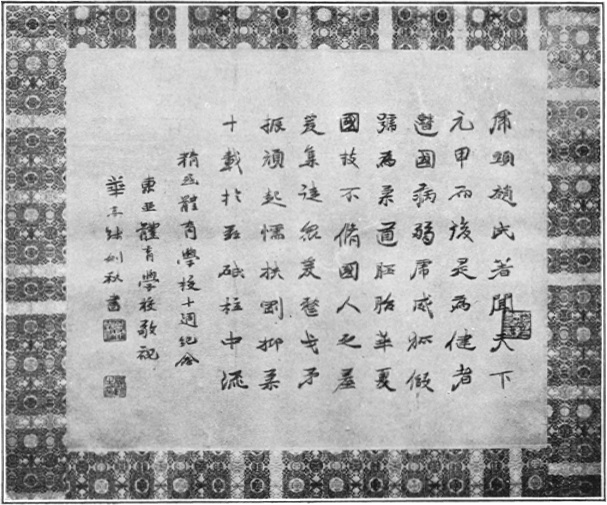
虎頸趙氏著聞天下
元甲而後是為健者
𨙠國病弱虎威狐假
號為柔道胚胎華夏
國技不脩國人之羞
爰集從衆爰整戈矛
振頑起懦扶剛抑柔
十載於磊砥柱中流
Your powerful presence
is famous everywhere.
Following on from Huo Yuanjia,
you are the mighty ones.
To deal with the illness of the nation,
you use power and ingenuity.
What is called Judo
actually began in China.
If we do not cultivate our martial skills,
shame on all of us.
Gather the masses!
Sharpen the weapons!
Let us awaken those who have been frivolous or cowardly.
Let us increase our strength and diminish our weakness.
After ten years down this honorable path,
may you unstoppably maintain your course.
精武體育學校十週紀念 東亞體育學校敬祝
華工錢劍秋書
To commemorate the tenth anniversary of the Jingwu Athletic School, with best wishes from the East Asia Athletic School.
- calligraphy by Qian Jianqiu while working abroad
–
愛國女學頌詞
A POEM FROM THE PATRIOTIC GIRLS’ SCHOOL
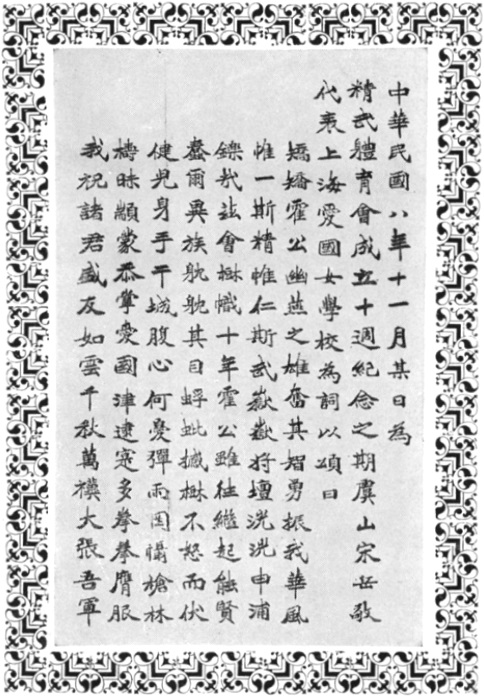
中華民國八年十一月某日為
精武軆育會成立十週紀念之期虞山宋岳敬代表上海愛國女學校為詞以頌曰
A poem made in Nov, 1919, to commemorate the tenth anniversary of the Jingwu Athletic Association, by Song Yuejing of Yushan [in Changshu, Suzhou, Jiangsu] on behalf of the Shanghai Patriotic Girls’ School:
矯矯霍公幽燕之雄奮其智勇振我華風
帷一斯精帷仁斯武嶽嶽將壇洸洸申浦
鑠哉茲會𣗳幟十年霍公雖往繼起能賢
蠢爾異族躭躭其目蜉蚍撼𣗳不怒而伏
健兒身手干城腹心何憂彈雨罔懾槍林
檮昧顓蒙恭掌愛國津逮寔多拳拳膺服
我祝諸君盛友如雲千秋萬模大張吾軍
Mighty master Huo,
hero from Hebei,
raised up his wisdom and courage
to rouse our Chinese culture.
The banner says “Jing”!
The banner says “Wu”!
Let it be proclaimed to the mountains
and all the way down the rivers.
He forged the Jingwu Association,
hoisting its banner ten years ago.
Although he is gone,
his virtue goes on.
Foolish foreigners
tried their skill against his.
But it was like “an ant trying to shake a tree” [from Han Yu’s poem “Mocking Zhang Ji” (Complete Tang Poems, volume 340, poem 19)].
Without anger, he defeated them all.
He was a valiant fighter in body and hands,
a defending army in belly and heart.
He had no fear of a hail of bullets,
would never have cowered before a crowd of rifles.
We may still be naïve and ignorant,
but we salute for love of our country.
There are many gateways toward knowledge,
and it is now the time for boxing arts to show the way.
We wish you all
so many new members that they are like clouds forming in the sky.
You will set an example forever
and be the inspiration for our soldiers.
–
☉精武體育會十周紀念頌詞
A POEM TO COMMEMORATE THE TENTH ANNIVERSARY OF THE JINGWU ATHLETIC ASSOCIATION
聞之韓子曰賁育之不戒童子之不抗魯雞之不期蜀雞之不支備之不可以已也有是哉夫以我中華數千年來右文之國惟敦詩說禮之是尚其文治炳焉與三代同風固已久矣乃自歐亞溝通而後遽相形見絀貽積弱之誚豈以我軍艦之不足與等量槍礮之不足與競精兵隊之不足與比數哉而抑知否否是皆不揣其本而齊其末之說也余以為器之不備惟其人人而不備則驅病夫而執堅率白徒而披銳不待衝陣交鋒早顚頓而僵仆矣欲祛其弊要惟體育為亟亟焉蓋授以技擊教以拳術而坐作進退疾徐疏數之方寓乎中精神以振武藝以練強身可強國亦可此精武之名所由昉也且吾尤喜是會之成績昭著師以授弟弟復有師資而相互遞嬗引之弗替行見武力鼎士風颷雲湧時會丕變一人善射百夫決拾昔年呰窳疲𦮕之弱態一掃空矣所謂有文事而不廢武備者此也故是會成立至今累積有十年之久尚如火始然如泉始達其方興未艾可知也他日波及全國盡人知此精武會為改造新中國之良導師豈不懿歟因為之頌曰
Han Yu wrote [in “Guarding Against Forbidding”]: “When the tutor forbids nothing, the pupil does not resist his instruction. If a rooster in the east misses his cue, a rooster in the west will eventually take up the slack.” But martial training is not something that can function in this way. China is a nation of several thousand years of appreciation for artistry, and so we have had a sincerity in our poetry, a respect for rituals, and an esteem for the beauty of governing through culture. This was the custom for generations, until cross-communication between Europe and Asia happened, and then we rapidly became mocked as being inferior and weak.
How can we think that our navy is inadequate, just a drop in the ocean compared to theirs, or that our firepower is inadequate, not enough to put up a fight, or that our troops are inadequate, somehow outnumbered? Looking closer, we can know that these things are not the case, this is simply a matter of [from Mengzi, chapter 6b:] “arranging the tops of things without first measuring the bases” [i.e. coming to a conclusion according to a superficial understanding]. We think it is our weapons that are not prepared, but instead it is our people themselves. We must first drive out our illness! Stubbornly commanding the untrained common people to draw weapons and needlessly rush into the fray, they would only quickly fail and fall.
If we want to eliminate our drawbacks, we have to urgently push for physical education. Teaching martial arts, particularly boxing arts, requires time to devise methods of advancing and retreating, moving at varying speeds, and using a variety of techniques. These methods are imbued with spirit to rouse a martial mentality. Such training can strengthen the self and also strengthen the nation. This is what has made the Jingwu Association so famous.
We are especially delighted that it has achieved so much success. The teachers teach students, then the students become teachers. Skills are passed down without the material being getting corrupted and powerful warriors are produced. When the wind blows and storm clouds amass [i.e. when there are radical new circumstances], there will be great changes. It is said [in Speeches from the Kingdoms, speeches of Wu:] “Once one person is good at archery, a hundred others will decide to take it up.” We will thus get rid of the slander we have received in former years of being worn out and weak.
It is also said [from Historical Records, book 47]: “Attend to civil affairs, but do not neglect military preparations.” It has now been ten years since the Jingwu Association was established, and yet it is still like a fire burning, a spring gushing, on the rise. Someday it will have spread to the whole nation and everyone will know that it was the Jingwu Association that led the way, transforming us into a new China. To express our great admiration, we have made this poem:
專攻曰精止戈為武
名至實歸十周化溥一道同風海濱鄒魯
干城腹心如貔如虎緬古聖賢墨翟尼父救宋舉關餘勇可賈
借鏡師資捍禦外侮勿謂無人亡秦三戶
劍拔弩張赫然震怒炎黃子孫眉揚氣吐振我國魂斯會鼻祖
Concentrated study makes it “jing” [sincere/spirited].
Stopping an enemy’s weapons is what makes it “wu” [martial]. [This is true in the very construction of the character (and is in fact the definition given in the Shuowen Jiezi, China’s earliest dictionary): 止 (stop) + 戈 (weapon) = 武 (martial).]
This forms their name and they have lived up to it,
spreading their transformative message for the last ten years,
a unifying way, a common custom,
which has reached every shore and touched the birthplaces of Mengzi and Confucius [i.e. the ancient states of Zou (in what is now the southwest of Shandong) and Lu (in the northeast of Shandong)].
They are like a defending army, with bellies full of heart,
like bears, like tigers,
and like ancient sages
such as Mozi and Confucius.
Mozi rescued the kingdom of Song by implementing a key strategy rather than combat,
and so he had plenty of resources left to fight with if it became necessary.
It is by learning from the wisdom of teachers
that we will protect ourselves against foreign aggression.
Do not think that there is no one here to do it.
“Even if there are only three families left in Chu, Chu will still defeat Qin.” [Historical Records, chapter 7]
Swords drawn, crossbows loaded,
full of fiery fury,
we descendants of the Yan Emperor and Yellow Emperor [i.e. the Chinese people]
will widen our eyes and roar with anger.
The rousing of our nation’s soul
was started by the founder of the Jingwu Association.
工界靑年勵志會謹頌
- sincerely written by the Encouraging-the-Workers’-Children Association
–
☉培本小學頌詞 朱企民
A POEM FROM THE DEVELOPING FUNDAMENTALS PRIMARY SCHOOL by Zhu Qimin
精武諸賢於霍子元甲升徂之餘殫精竭慮講武累年而於世所盛稱之道德學問尤力行不怠寒暑遞更於今十稔縱無好大喜功之心宜有勸人化俗之舉僕不敏敬於其十週紀念馨香以頌其辭曰
All of the virtuous members of the Jingwu Association look up to the example of Huo Yuanjia. He devoted all his energy and thought over the course of many years into training in martial arts. His ethics and knowledge have been praised everywhere, and especially his perseverance, training regardless of bitter cold or oppressive heat. It has now been a decade since he passed away. He was never ambitious for himself and was only intent upon encouraging people to improve society. Although I am not literate, I have made a poem which I sincerely offer to you all in commemoration of your tenth anniversary:
有淸之季東海之濱英才濟濟陶冶性靈
巨俠升徂多士銜怨萬夫齊奮作育成才
旣威且武偉業豐功鼎革以還聲譽尤隆
凡我士庶保此曙光同仇敵愾外禦豪強
During the last days of the Qing Dynasty,
near the shores of the eastern sea,
there were many talented men
who were molding their character.
When a hero finally arises,
he often gets resented
by other men struggling
to make something of themselves.
Huo was impressive and mighty
in his many achievements,
and since the Revolution,
his fame has only grown even higher.
All of our nation’s gentlemen and commoners alike
now hold him up as a beacon of hope
against the shared enemy:
the threat of foreign tyranny.
–
表
[PART ELEVEN] LISTS OF MEMBERS
–
☉職員
STAFF MEMBERS
本會會長肖像 副會長聶其杰先生字雲臺 正會長朱慶瀾先生字子橋
Portrait of Jingwu Association president Zhu Qinglan, called Ziqiao [left], and vice president Nie Qijie, called Yuntai [right]:
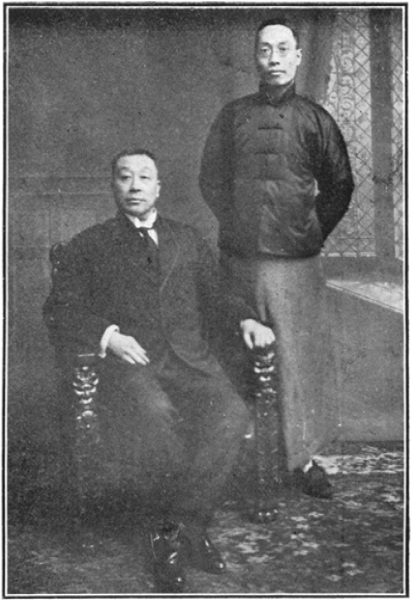
本會久任董事 前任會長 袁恆之先生
Long-time director and former president of the Jingwu Association, Yuan Hengzhi:
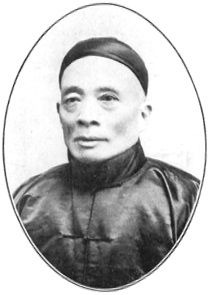
副會長 王閣臣先生
Vice president Wang Gechen:
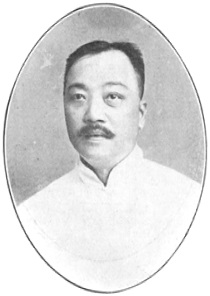
–
董事
Directors:
霍守華先生
Huo Shouhua:
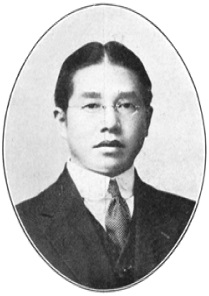
梁麗藻先生
Liang Lizao:
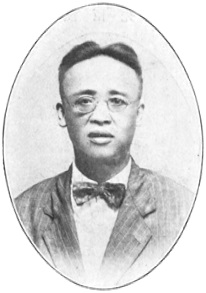
林錦華先生
Lin Jinhua:
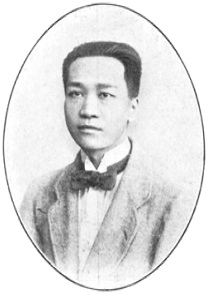
甯竹亭先生
Ning Zhuting:
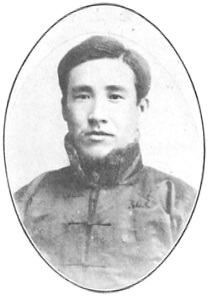
温欽甫先生
Wen Qinfu [Zongyao]:
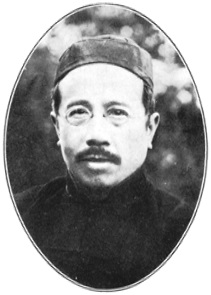
胡耀庭先生
Hu Yaoting:
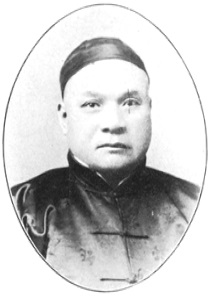
黃伯平先生
Huang Boping:
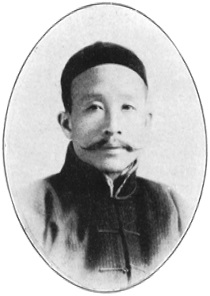
譚海秋先生
Tan Haiqiu:

孫新甫先生
Sun Xinfu:
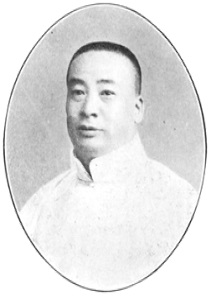
馮少山先生
Feng Shaoshan:
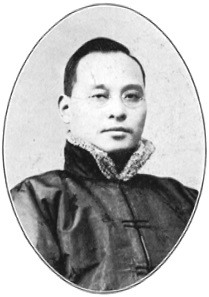
湯節之先生
Tang Jiezhi:
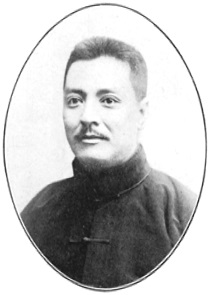
尹鶴林先生
Yin Helin:
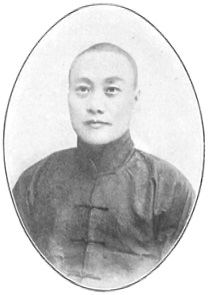
劉少筠先生
Liu Shaoyun:
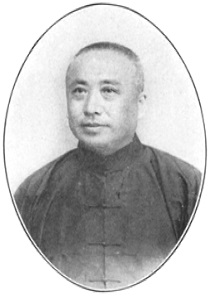
唐耐修先生
Tang Naixiu:
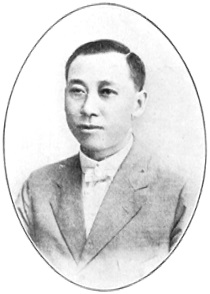
王維藩先生
Wang Weifan:
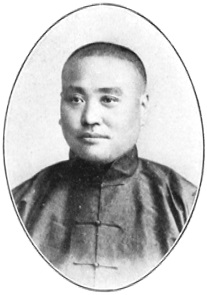
黃季植先生
Huang Jizhi:
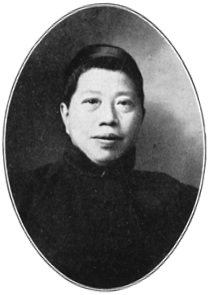
王晉臣先生
Wang Jinchen:
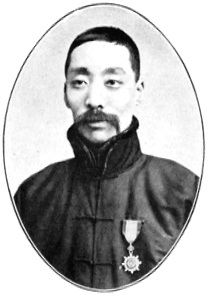
陳陞堂先生
Chen Shengtang:
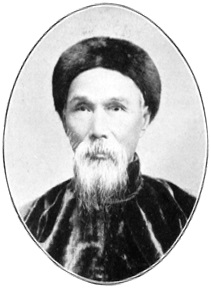
–
職員
Staff members:
盧煒昌
Lu Weichang:
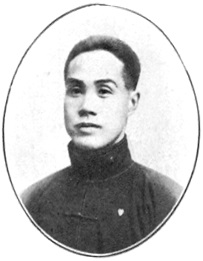
黎惠生
Li Huisheng:
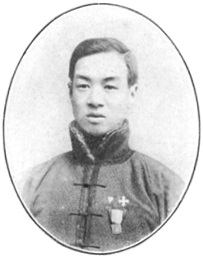
鄭灼辰
Zheng Zhuochen:
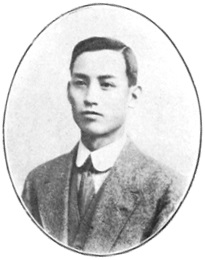
姚蟾伯
Yao Chanbo:
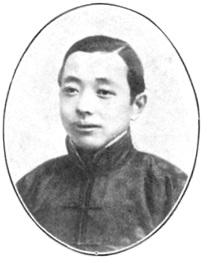
劉扆臣
Liu Yichen:
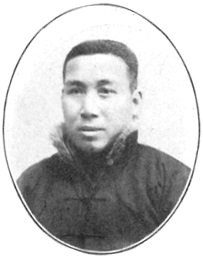
陳鐵生
Chen Tiesheng:
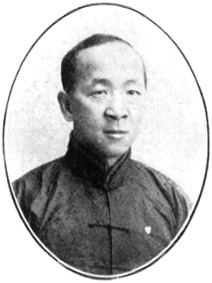
陳公哲
Chen Gongzhe:
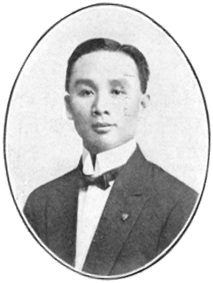
邱亮
Qiu Liang:
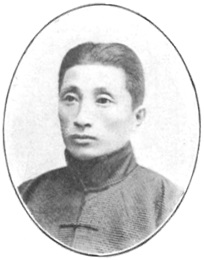
翁耀衡
Weng Yaoheng:
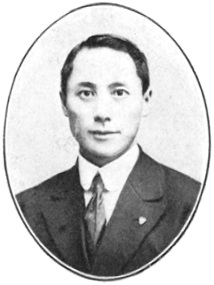
程子培
Cheng Zipei:
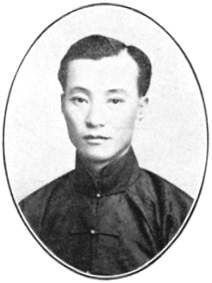
李國荃
Li Guoquan:
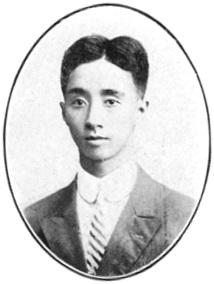
唐琼相
Tang Qiongxiang:
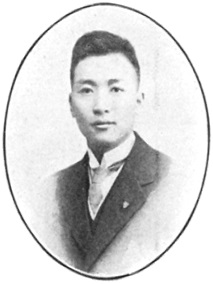
陳啟英
Chen Qiying:
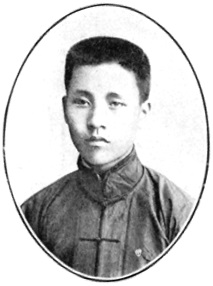
黃怡生
Huang Yisheng:
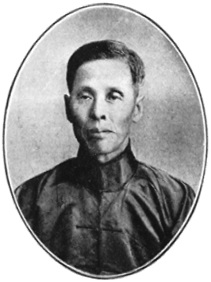
周錫三
Zhou Xisan:
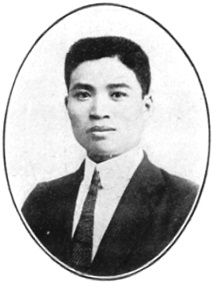
浦闊亭
Pu Kuoting:

葛榮先
Ge Rongxian:
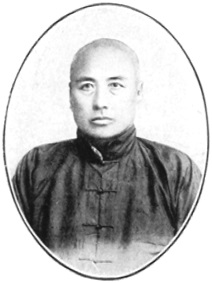
陳壽之
Chen Shouzhi:
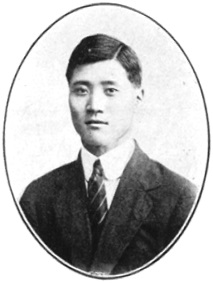
雲作丞
Yun Zuocheng:
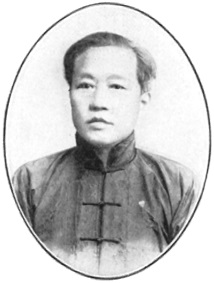
羅伯夔
Luo Bokui:
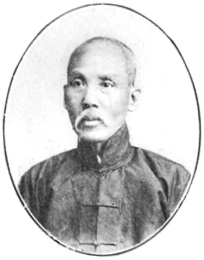
黃漢佳
Huang Hanjia:
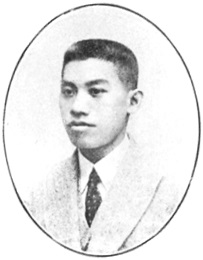
馮蘭皋
Feng Lan’gao:
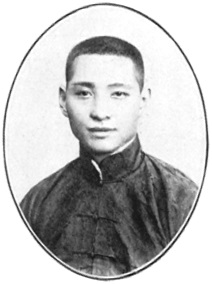
曾啓文
Zeng Qiwen:
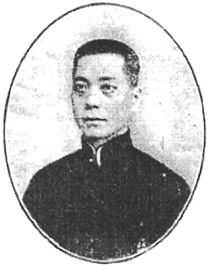
金光曜
Jin Guangyao:
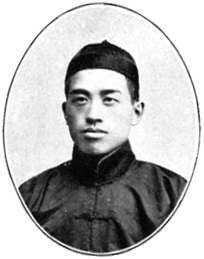
羅克己
Luo Keji:
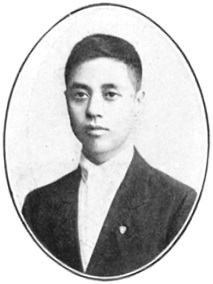
呂啟明
Lü Qiming:
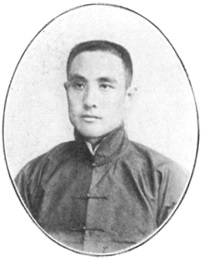
黃維慶
Huang Weiqing:
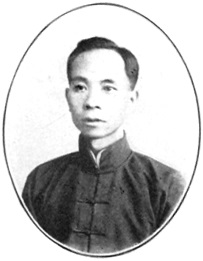
–
職員及教員
People who are both staff members & instructors:
黎永錦
Li Yongjin:
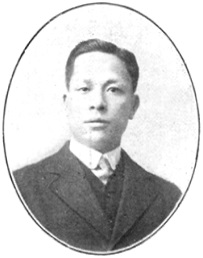
吳見眞
Wu Jianzhen:
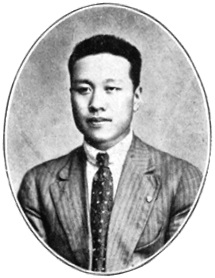
徐雲岳
Xu Yunyue:
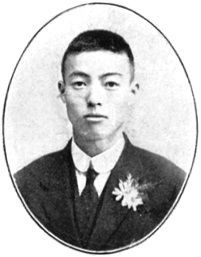
陳士超
Chen Shichao:
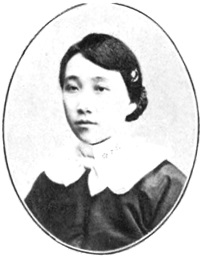
趙連和
Zhao Lianhe:
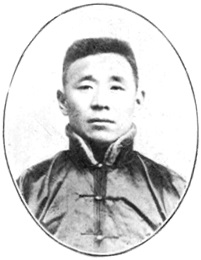
黃賢
Huang Xian:
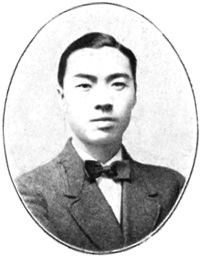
梁少田
Liang Shaotian:
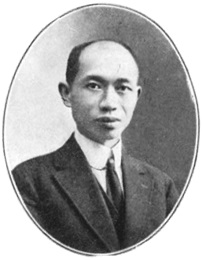
葉書田
Ye Shutian:
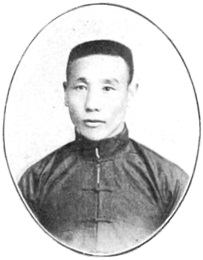
陳維賢
Chen Weixian:
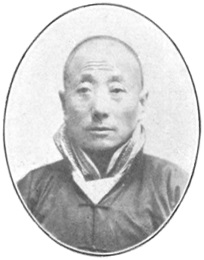
–
教員
Instructors:
霍東閣
Huo Dongge:
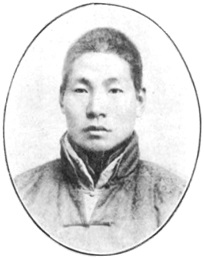
劉致祥
Liu Zhixiang:
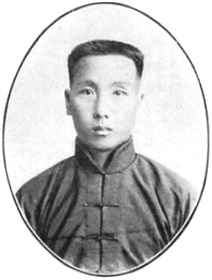
孫贊軒
Sun Zanxuan:
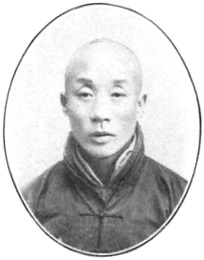
孫玉峯
Sun Yufeng:
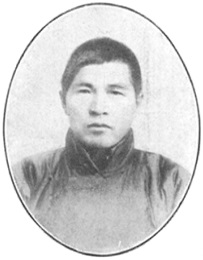
羅光玉
Luo Guangyu:
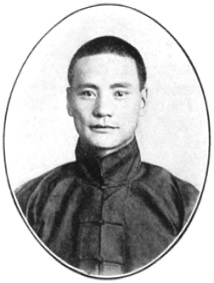
李匯亭
Li Huiting:
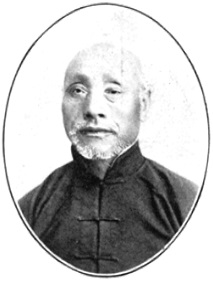
陳子正
Chen Zizheng:
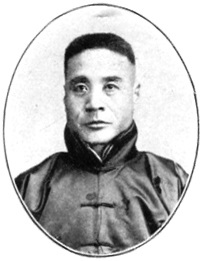
–
民國前兩年之技擊教員
The martial arts instructors in 1910:
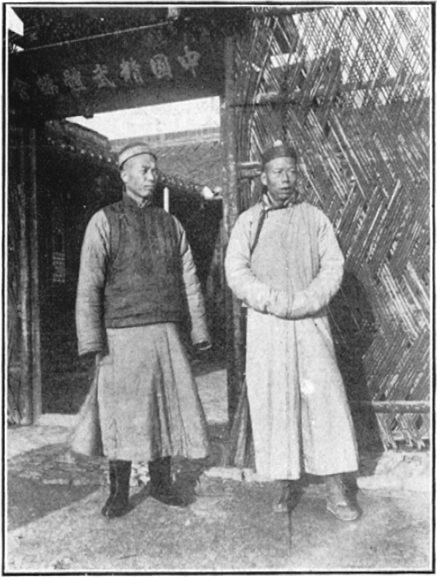
(左劉振聲) (右趙漢傑)
Liu Zhensheng (left) & Zhao Hanjie (right)
–
民國元年之技擊教員
The martial arts instructors in 1912:
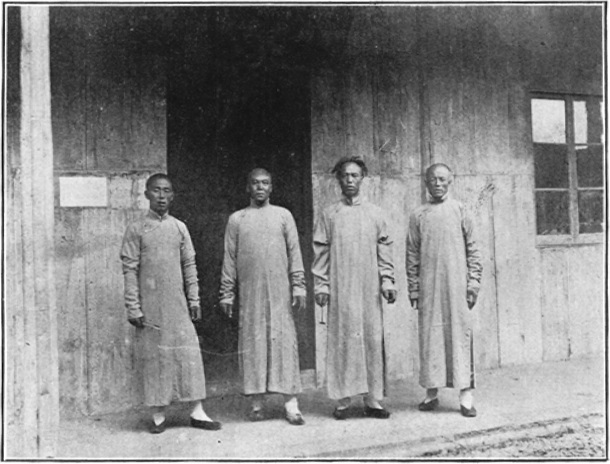
[right to left:]
(一)李健民
1. Li Jianmin
(二)趙漢傑
2. Zhao Hanjie
(三)張富猷
3. Zhang Fuyou
(四)趙連和
4. Zhao Lianhe
–
民國七年之技擊主任與教員
The martial arts directors & instructors in 1918:
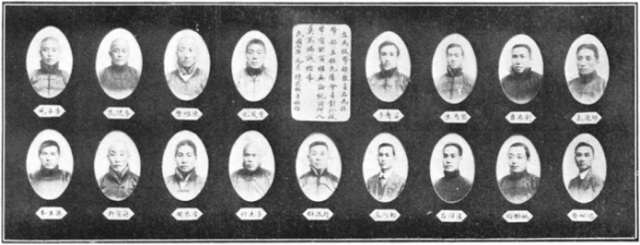
左為技擊部教員右為技擊部主任凡屬會員對於技擊有㪽商榷無論就詢何人莫不竭誠指導
民國七年九月 精武職員部曰
The [nine] on the left are instructors. The [eight] on the right are directors. All of these gentlemen have things to say about martial arts. Regardless of who is asking them, they all give guidance sincerely.
– written by Jingwu staff members, Sep, 1918
李占風 李健民 陳維賢 葉鳳池
[left top row] Li Zhanfeng, Li Jianmin, Chen Weixian, Ye Fengchi
孫玉峯 孫贊軒 霍東閣 李蓮村 趙振群
[left bottom row] Sun Yufeng, Sun Zanxuan, Huo Dongge, Li Liancun, Zhao Zhenqun [Lianhe]
寗竹亭 黎惠生 劉扆臣 邱建亮
[right top row] Ning Zhuting, Li Huisheng, Liu Yichen, Qiu Jianliang [Qiu Liang]
鄭灼辰 盧煒昌 姚蟾伯 陳公哲
[right bottom row] Zheng Zhuochen, Lu Weichang, Yao Chanbo, Chen Gongzhe
–
☉歷任職教員表
LIST OF POSITIONS HELD OVER THE YEARS
民國前兩年
1910:
會長 農勁蓀
President: Nong Jinsun
書記 羅罡
Secretary: Luo Gang
會計 盧煒昌
Bookkeeper: Lu Weichang
技擊教員 劉振聲 趙漢傑
Martial arts instructors: Liu Zhensheng, Zhao Hanjie
民國前一年及民國元年
1911 & 1912:
會長 袁恆之
President: Yuan Hengzhi
坐辦 盧煒昌
Organizer: Lu Weichang
書記 劉扆臣 李迪初
Secretaries: Liu Yichen, Li Dichu
會計 王維藩 邱亮
Bookkeepers: Wang Weifan, Qiu Liang
調查員 農竹 何進賢 蔡香蓀 何曰琰 張卓生
Examiners: Nong Zhu, He Jinxian, Cai Xiangsun, He Yueyan, Zhang Zhuosheng
庶務員 黎惠生
Business-affairs secretary: Li Huisheng
技擊教員 劉振聲 李健民 張富猷 趙連和
Martial arts instructors: Liu Zhensheng, Li Jianmin, Zhang Fuyou, Zhao Lianhe
民國二年
1913:
會長 袁恆之
President: Yuan Hengzhi
副會長 農勁蓀
Vice President: Nong Jinsun
坐辦 姚蟾伯
Organizer: Yao Chanbo
會計 盧煒昌
Bookkeeper: Lu Weichang
書記 劉扆臣
Secretary: Liu Yichen
總幹事 陳公哲
General-affairs secretary: Chen Gongzhe
幹事 李迪初
Secretary-in-charge: Li Dichu
調查員 陳抱一 徐人龍
Examiners: Chen Baoyi, Xu Renlong
技擊教員 趙連和 張富猷
Martial arts instructors: Zhao Lianhe, Zhang Fuyou
民國三年及四年
1914 & 1915:
會長 周金箴
President: Zhou Jinzhen
副會長 陳止瀾
Vice President: Chen Zhilan
董事 袁恆之 傅筱菴 徐一冰 梁麗藻 農勁蓀
Directors: Yuan Hengzhi, Fu Xiaoyan, Xu Yibing, Liang Lizao, Nong Jinsun
坐辦 陳公喆
Organizer: Chen Gongzhe
會計 姚蟾伯
Bookkeeper: Yao Chanbo
書記 盧煒昌
Secretary: Lu Weichang
庶務 馮蘭皋 寧竹亭
Business-affairs secretaries: Feng Lan’gao, Ning Zhuting
調查 鄭灼辰 黎惠生
Examiners: Zheng Zhuochen, Li Huisheng
技擊教員 張富猷 趙漢傑 趙連和
Martial arts instructors: Zhang Fuyou, Zhao Hanjie, Zhao Lianhe
民國五年及六年
1916 & 1917:
會長 王閣臣
President: Wang Gechen
副會長 陳止瀾
Vice President: Chen Zhilan
董事 聶雲台 袁恆之 徐一冰 梁麗藻 農勁蓀
Directors: Nie Yuntai, Yuan Hengzhi, Xu Yibing, Liang Lizao, Nong Jinsun
庶務長 陳公喆
Head of business affairs: Chen Gongzhe
會計 盧煒昌
Bookkeeper: Lu Weichang
國文書記 陳鐵生
Chinese language secretary: Chen Tiesheng
英文書記 周錫三
English language secretary: Zhou Xisan
調查 尹鶴林 寧竹亭
Examiners: Yin Helin, Ning Zhuting
庶務 黃漢佳 吳耀之
Business-affairs secretaries: Huang Hanjia, Wu Yaozhi
會醫 林錦華
Physician: Lin Jinhua
技擊教員 趙連和 李振江 葉鳳岐 陳維賢 孫贊軒 霍元卿
Martial arts instructors: Zhao Lianhe, Li Zhenjiang [Liancun], Ye Fengqi, Chen Weixian, Sun Zanxuan, Huo Yuanqing
兵操教員 鄭灼辰
Army drill instructor: Zheng Zhuochen
音樂教員 武秀奎
Music instructor: Wu Xiukui
軍樂教員 姚祥生
Military band instructor: Yao Xiangsheng
民國七年
1918:
會長 聶雲台
President: Nie Yuntai
副會長 穆藕初
Vice President: Mu Ouchu
董事 袁恆之 王閣臣 陳止瀾 孫新甫 趙灼臣 趙甫臣 朱慶瀾 譚海秋 歐陽星南 梁麗藻 黃季植 張憲堂 簡照南 簡琴石 尹鶴林 王維藩 黎耀墀
Directors: Yuan Hengzhi, Wang Gechen, Chen Zhilan, Sun Xinfu, Zhao Zhuochen, Zhao Fuchen, Zhu Qinglan, Tan Haiqiu, Ouyang Xingnan, Liang Lizao, Huang Jizhi, Zhang Xiantang, Jian Zhaonan, Jian Qinshi, Yin Helin, Wang Weifan, Li Yaochi
理事長 陳公哲
Chairman of the board: Chen Gongzhe
理事員 吳耀之 王漢禮 沈金泰 陳善 黃維慶 程子培 李國荃
Board members: Wu Yaozhi, Wang Hanli, Shen Jintai, Chen Shan, Huang Weiqing, Cheng Zipei, Li Guoquan
會計 盧煒昌 陳鐵生 邵廷玉
Bookkeepers: Lu Weichang, Chen Tiesheng, Shao Tingyu
國文書記 陳鐵生 邵廷玉
Chinese language secretaries: Chen Tiesheng, Shao Tingyu
英文書記 周錫三 翁耀衡
English language secretaries: Zhou Xisan, Weng Yaoheng
會醫 林錦華 羅伯夔
Physicians: Lin Jinhua, Luo Bokui
調查 陳世俊 尹鶴林 陳仁齋 沈季修 黎永錦 曾啓文
Examiners: Chen Shijun, Yin Helin, Chen Renzhai, Shen Jixiu, Li Yongjin, Zeng Qiwen
技擊教員 趙連和 李振江 葉鳳岐 趙連城 李占風 霍東閣 孫玉峯 陳維賢 孫贊軒 鄭灼辰
Martial arts instructors: Zhao Lianhe, Li Zhenjiang [Liancun], Ye Fengqi, Zhao Liancheng, Li Zhanfeng, Huo Dongge, Sun Yufeng, Chen Weixian, Sun Zanxuan, Zheng Zhuochen
音樂教員 武秀奎
Music instructor: Wu Xiukui
軍樂教員 姚祥生
Military band instructor: Yao Xiangsheng
民國八年
1919:
會長 朱慶瀾
President: Zhu Qinglan
副會長 聶雲台 王閣臣
Vice Presidents: Nie Yuntai, Wang Gechen
董事 袁恆之 陳止瀾 簡琴石 穆藕初 陳陞堂 温欽甫 霍守華 譚海秋 王維藩 簡照南 馮少山 劉少筠 胡耀庭 林錦華 尹鶴林 梁麗藻 黃季植 孫新甫 唐耐修 寧竹亭 王晉臣 黃鴻鈞 湯節之 黃伯平 李耀邦
Directors: Yuan Hengzhi, Chen Zhilan, Jian Qinshi, Mu Ouchu, Chen Shengtang, Wen Qinfu, Huo Shouhua, Tan Haiqiu, Wang Weifan, Jian Zhaonan, Feng Shaoshan, Liu Shaoyun, Hu Yaoting, Lin Jinhua, Yin Helin, Liang Lizao, Huang Jizhi, Sun Xinfu, Tang Naixiu, Ning Zhuting, Wang Jinchen, Huang Hongjun, Tang Jiezhi, Huang Boping, Li Yaobang
總務主任 姚蟾伯 陳公喆
General-affairs directors: Yao Chanbo, Chen Gongzhe
國文書記 陳鐵生 劉扆臣 黃維慶 吳見眞 陳啟英
Chinese language secretaries: Chen Tiesheng, Liu Yichen, Huang Weiqing, Wu Jianzhen, Chen Qiying
英文書記 周錫三 翁耀衡 羅克己
English language secretaries: Zhou Xisan, Weng Yaoheng, Luo Keji
會計 盧煒昌 陳鐵生
Bookkeepers: Lu Weichang, Chen Tiesheng
會醫 林錦華 羅伯夔 湯節之
Physicians: Lin Jinhua, Luo Bokui, Tang Jiezhi
糾察員 寧竹亭 葛榮先 金光曜 鄭灼辰
Disciplinary officers: Ning Zhuting, Ge Rongxian, Jin Guangyao, Zheng Zhuochen
稽查員 黎惠生 沈季修 黎永錦 梁少田
Customs officers: Li Huisheng, Shen Jixiu, Li Yongjin, Liang Shaotian
庶務員 陳壽之 吳耀之 勞錫藩 何勉之 楊琛倫 徐雲岳 呂啓明 王松齡
Business-affairs secretaries: Chen Shouzhi, Wu Yaozhi, Lao Xifan, He Mianzhi, Yang Chenlun, Xu Yunyue, Lü Qiming, Wang Songling
調查員 尹鶴林 陳仁齋 浦闊亭 曾啟文
Examiners: Yin Helin, Chen Renzhai, Pu Kuoting, Zeng Qiwen
交際員 郭唯一
Communications secretary: Guo Weiyi
技擊部
Martial Arts Department:
部長 盧煒昌
Department head: Lu Weichang
技擊教員 趙連和 孫玉峯 趙連城 孫贊軒 霍東閣 趙觀永 陳維賢 葉書田 陳子正 羅光玉 李匯亭 劉致祥
Martial arts instructors: Zhao Lianhe, Sun Yufeng, Zhao Liancheng, Sun Zanxuan, Huo Dongge, Zhao Guangyong, Chen Weixian, Ye Shutian, Chen Zizheng, Luo Guangyu, Li Huiting, Liu Zhixiang
技擊主任 費實秋 陳善 羅克己 寧竹亭 鄭灼辰 姚蟾伯 陳公喆 黎惠生 邱亮 劉扆臣 浦闊亭 馮蘭皋 翁耀衡 劉日暄 沈季修 黃漢佳 金光曜 黃維慶
Martial arts directors: Fei Shiqiu, Chen Shan, Luo Keji, Ning Zhuting, Zheng Zhuochen, Yao Chanbo, Chen Gongzhe, Li Huisheng, Qiu Liang, Liu Yichen, Pu Kuoting, Feng Lan’gao, Weng Yaoheng, Liu Rixuan, Shen Jixiu, Huang Hanjia, Jin Guangyao, Huang Weiqing
模範團主任 陳士超 陳兆珽
Exemplary Women Team directors: Chen Shichao, Chen Zhaoting
勵志團主任 寧竹亭 鄭灼辰
Encouragement Club directors: Ning Zhuting, Zheng Zhuochen
安步團主任 王松齡
Walking Club director: Wang Songling
惜陰團主任 鄭福良
Precious-Time Club director: Zheng Fuliang
武器主任 趙連和 邱亮 趙連城 盧煒昌
Weapons directors: Zhao Lianhe, Qiu Liang, Zhao Liancheng, Lu Weichang
袖鑣主任 鄭灼辰
Sleeve darts director: Zheng Zhuochen
弓矢主任 鄭憲成
Archery director: Zheng Xiancheng
健兒團總教 盧煒昌
Valiant Warriors Club main instructor: Lu Weichang
技擊出版部總編輯 陳鐵生
Martial Arts Publishing Department editor-in-chief: Chen Tiesheng
兵操部
Army Drill Department:
部長 鄭灼辰
Department head: Zheng Zhuochen
教授 鄭灼辰 寧竹亭
Instructors: Zheng Zhuochen, Ning Zhuting
被服主任 陳公哲
Supplies director: Chen Gongzhe
軍械主任 李國荃
Armaments director: Li Guoquan
軍樂主任 莫若儉
Military band director: Mo Ruojian
文事部
Literary Studies Department:
部長 周錫三
Department head: Zhou Xisan
國文教授 羅伯夔
Chinese language instructor: Luo Bokui
英文教授 梁麗藻
English language instructor: Liang Lizao
圖畫教授 沈伯誠
Painting instructor: Shen Bocheng
簿記學教授 周錫三
Accounting instructor: Zhou Xisan
國語教授 雲作丞
Mandarin instructor: Yun Zuocheng
攝影學教授 陳公哲 程子培
Photography instructors: Chen Gongzhe, Cheng Zipei
攝影學主任 葉向榮
Photography director: Ye Xiangrong
打字科主任 盧煒昌
Typewriting director: Lu Weichang
雄辯團主任 梁少田
Debating Team director: Liang Shaotian
書報主任 羅克己 黃漢佳 李國荃 沈金泰
Books & periodicals directors: Luo Keji, Huang Hanjia, Li Guoquan, Shen Jintai
臨池會主任 陳鐵生
Calligraphy class director: Chen Tiesheng
臨池會檢察 陳士超
Calligraphy examiner: Chen Shichao
西醫主任 林錦華
Western medicine director: Lin Jinhua
中醫主任 羅伯夔
Chinese medicine director: Luo Bokui
游藝部
Recreational Activities Department:
部長 姚蟾伯
Department head: Yao Chanbo
京樂教授 武秀奎
Beijing opera instructor: Wu Xiukui
歐絃教授 司徒夢岩
European stringed instruments director: Situ Mengyan
西樂教授 梁志忠
Western music director: Liang Zhizhong
京樂主任 唐琼相
Beijing opera director: Tang Qiongxiang
粵樂主任 黃怡生 黃漢佳
Cantonese opera directors: Huang Yisheng, Huang Hanjia
略獵主任 陳公哲 黎永錦
Game hunting directors: Chen Gongzhe, Li Yongjin
足球主任 黃賢 伍保初 莫若儉 羅季侶
Soccer directors: Huang Xian, Wu Baochu, Mo Ruojian, Luo Jilü
網球主任 姚蟾伯 邱亮 唐有源
Tennis directors: Yao Chanbo, Qiu Liang, Tang Youyuan
鐵餅鐵球主任 黃賢
Discus & shot put director: Huang Xian
檯球主任 黎永錦
Billiards director: Li Yongjin
平檯木馬主任 陸象賢
Balancing platform & vaulting horse director: Lu Xiangxian
籃球主任 周錫三
Basketball director: Zhou Xisan
溜冰凌空主任 唐琼相 李國荃
Skating & zip-lining directors: Tang Qiongxiang, Li Guoquan
鑣槍主任 伍保初
Javelin director: Wu Baochu
–
☉派往各團體教授技擊職員記名
LIST OF JINGWU MARTIAL ARTS INSTRUCTORS TEACHING AT VARIOUS ORGANIZATIONS
In Hankou:
漢口精武會 李健民
Hankou Jingwu Association: Li Jianmin
In Guangdong:
廣東精武會 沈季修 楊琛倫 葉鳳岐 李占風
Guangdong Jingwu Association: Shen Jixiu, Yang Chenlun, Ye Fengqi, Li Zhanfeng
廣東省商團 趙連城
Guangdong Business Group: Zhao Liancheng
In Hong Kong:
香港弼志書室 李振江
Hong Kong Local History Office: Li Zhenjiang [Liancun]
In Shanghai:
上海廣東小學 鄭灼辰 霍東閣
Guangdong Primary School: Zheng Zhuochen, Huo Dongge
上海中華工業專門學校(原名中華鐵路學校) 趙連和
Chinese Industry Technical School (previously called the Chinese Railroad School): Zhao Lianhe
松江第三中學 張富猷
Jiangsu 3rd Provincial Secondary School, Songjiang Distrist: Zhang Fuyou
上海培德兩等學校 盧煒昌 霍東閣
Developing Virtue Primary School: Lu Weichang, Huo Dongge
上海澄衷中學 趙連和
Chengzhong Secondary School: Zhao Lianhe
上海復旦大學 趙連和
Fudan University: Zhao Lianhe
上海嶺南中學 姚蟾伯 陳善 黃維慶
Lingnan Secondary School: Yao Chanbo, Chen Shan, Huang Weiqing
上海震亞中學 邱亮
Rousing Asia Secondary School: Qiu Liang
上海培本小學 黎惠生 王松齡
Developing Fundamentals Primary School: Li Huisheng, Wang Songling
上海靑年會 盧煒昌 翁耀衡 黃漢佳
Shanghai YMCA: Lu Weichang, Weng Yaoheng, Huang Hanjia
上海商務印書館工界靑年勵志會 黎惠生
Encouraging-the-Workers’-Children Association of the Commercial Press: Li Huisheng
上海郇光學校 承金培
Xun Guang Secondary School: Cheng Jinpei
上海浴德學校 馮蘭皋
Cultivating Virtue Primary School: Feng Lan’gao
上海愛國女學 寧竹亭 盧煒昌
Patriotic Girls’ School: Ning Zhuting, Lu Weichang
上海中國女子體操學校 盧煒昌
Chinese Women’s Calisthenics School: Lu Weichang
上海崇德女校 陳士超
Chongde Girls’ School: Chen Shichao
上海靑年俱樂部 劉日暄 金光曜
Shanghai Youth Club: Liu Rixuan, Jin Guangyao
上海東亞體育學校 姚蟾伯 葉書田
East Asia Athletic School: Yao Chanbo, Ye Shutian
上海廣肇女學 簡偉卿
Guangzhou-Guangdong Girls’ School: Jian Weiqing
上海晏摩氏女學 陳士超 簡玉鵬
Elize Bates Girls’ School: Chen Shichao, Jian Yupeng [Weiqing]
女子模範團 陳公哲 盧煒昌
Exemplary Women Team: Chen Gongzhe, Lu Weichang
靖港技擊團 趙觀永
Peaceful Harbor Martial Arts Society: Zhao Guangyong
上海聖約翰大學 霍東閣
St. John’s University: Huo Dongge
上海中國公學 劉致祥 羅克己
China Public School: Liu Zhixiang, Luo Keji
上海啟賢學校 鄭福良
Inspiring Virtue School: Zheng Fuliang
上海第十三隊童子軍 程子英
Boy Scouts 13th Troop: Cheng Ziying
上海民生學校 程子英
Livelihood-of-the-People School: Cheng Ziying
上海中華義務小學 健兒團分任
Chinese Duty Primary School: various members of the Valiant Warriors Club
–
三年之精武技擊部會員
Members of the Jingwu martial arts department in 1914:
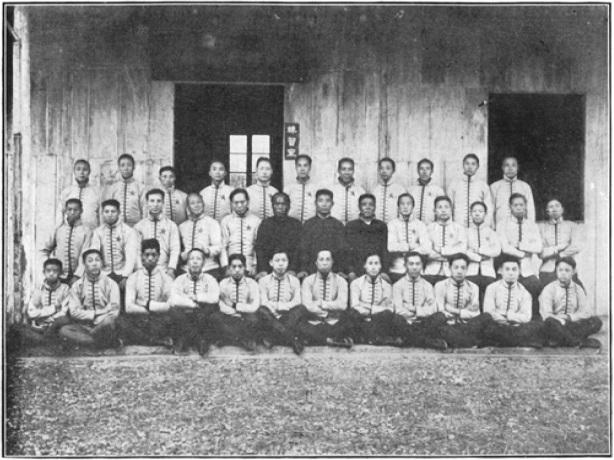
–
四年之精武技擊部會員
Members of the Jingwu martial arts department in 1915:
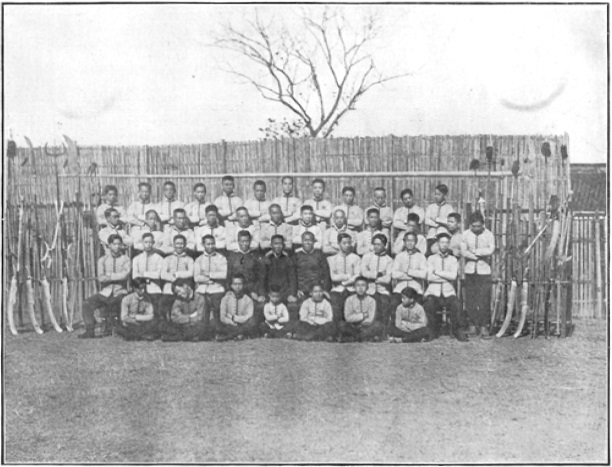
–
技擊部全體會員攝影
Group photo of the members of the martial arts department:
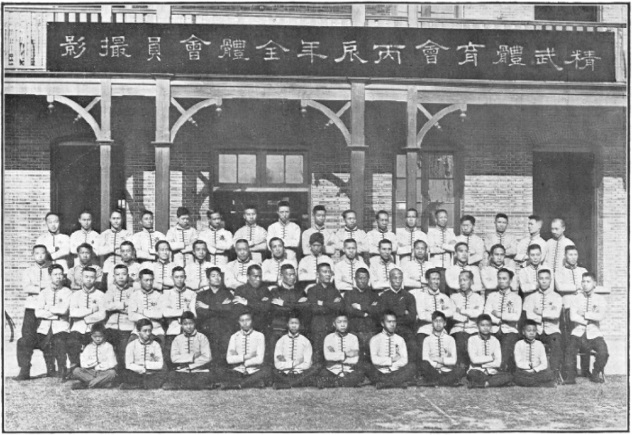
精武體育會丙辰年全體會員撮影
Group photo of the members of the Jingwu Athletic Association, 1916
–
☉上海中國精武體育會會員記名(以姓之筆畫多少為次序)
LIST OF MEMBERS OF THE SHANGHAI JINGWU ATHLETIC ASSOCIATION (arranged by the surname character [as opposed to alphabetically, chronologically, or in number order])
[Chronologically, the first member on this list is dated at June, 1910, and the last at Dec, 1919. The list does not contain any entries for 1915, the year of the typhoon damage. Member numbers missing from the list are: #2–29, #125, #142, #246, #325, #350, #524, #532, #613, #843, #971, #995–998, #1021, #1077, #1135–1137. Three of the member numbers in the list are unaccountably reused: #931, #1007, #1031. It is unsurprising that in this list of one thousand ninety-six names there are some people with the same name, those being two people named 張英甫 Zhang Yingfu, two people named 關聰麟 Guan Conglin, and two people named 顧藩 Gu Fan.]
姓名 第號 民國年 月入會
Name / member number / joined in (month) / (year):
丁德瑞 三〇 三 五 Ding Derui / #30 / May, 1914
丁君才 八二四 七 八 Ding Juncai / #824 / Aug, 1918
山孟芳 四二六 五 九 Shan Mengfang / # 426 / Sep, 1916
于從周 八一五 七 七 Yu Congzhou / #815 / July, 1918
于友齋 九四二 八 六 Yu Youzhai / #942 / June, 1919
王煥文 三一 前二 六 Wang Huanwen / #31 / June, 1910
王祖賡 三二 前二 七 Wang Zugeng / #32 / July, 1910
王維藩 五二八 前二 七 Wang Weifan / #528 / July, 1910
王秋蓀 三三 前一 Wang Qiusun / #33 / 1911
王步賢 三四 前一 Wang Buxian / #34 / 1911
王理和 三五 前一 四 Wang Lihe / #35 / April, 1911
王聯生 三六 一 Wang Liansheng / #36 / 1912
王麐生 三七 一 Wang Linsheng / #37 / 1912
王鈺 三八 一 Wang Yu / #38 / 1912
王懷琪 五六四 二 Wang Huaiqi / #564 / 1913
王生一 三九 二 Wang Shengyi / #39 / 1913
王漢禮 三五四 二 Wang Hanli / #354 / 1913
王寶鏡 四〇 三 二 Wang Baojing / #40 / Feb, 1914
王少虞 四一 三 十 Wang Shaoyu / #41 / Oct, 1914
王熊飛 四二 三 十一 Wang Xiongfei / #42 / Nov, 1914
王閣臣 四二一 五 九 Wang Gechen / #421 / Sep, 1916
王松林 四二五 五 九 Wang Songlin / #425 / Sep, 1916
王宗寬 五三五 六 七 Wang Zongkuan / #535 / July, 1917
王昭舜 五九九 六 七 Wang Zhaoshun / #599 / July, 1917
王宗峻 六〇七 六 九 Wang Zongjun / #607 / Sep, 1917
王竹銘 六四五 六 九 Wang Zhuming / #645 / Sep, 1917
王世珍 六九八 六 十二 Wang Shizhen / #698 / Dec, 1917
王建範 七〇九 七 二 Wang Jianfan / #709 / Feb, 1918
王禮明 七三二 七 三 Wang Liming / #732 / March, 1918
王燕濱 七五六 七 四 Wang Yanbin / #756 / April, 1918
王良才 八二九 七 八 Wang Liangcai / #829 / Aug, 1918
王友三 九〇八 八 三 Wang Yousan / #908 / March, 1919
王仲理 九四〇 八 六 Wang Zhongli / #940 / June, 1919
王鑑淸 九四一 八 六 Wang Jianqing / #941 / June, 1919
王莘田 一〇〇〇 八 八 Wang Shentian / #1000 / Aug, 1919
王根生 一〇一三 八 九 Wang Gensheng / #1013 / Sep, 1919
王仁彝 一〇一九 八 九 Wang Renyi / #1019 / Sep, 1919
王俊甫 一〇五六 八 十 Wang Junfu / #1056 / Oct, 1919
王雅珊 一〇六八 八 十 Wang Yashan / #1068 / Oct, 1919
王家楨 一〇七一 八 十 Wang Jiazhen / #1071 / Oct, 1919
尹肇煦 四三 一 Yin Zhaoxu / #43 / 1912
尹兆許 四四 二 Yin Zhaoxu / #44 / 1913
尹鶴林 三七九 三 Yin Helin / #379 / 1914
尹任先 一〇八四 八 十 Yin Renxian / #1084 / Oct, 1919
孔鏡淸 六八〇 六 十二 Kong Jingqing / #680 / Dec, 1917
文在中 四五 前一 Wen Zaizhong / #45 / 1911
文成康 七八九 七 七 Wen Chengkang / #789 / July, 1918
尤中廉 四六 前一 You Zhonglian / #46 / 1911
毛仲達 四七 一 Mao Zhongda / #47 / 1912
毛瑞卿 六五八 六 十 Mao Ruiqing / #658 / Oct, 1917
毛仁銳 九六八 八 七 Mao Renrui / #968 / July, 1919
方少之 七八八 七 七 Fang Shaozhi / #788 / July, 1918
方樹培 八七三 七 十 Fang Shupei / #873 / Oct, 1918
方善道 九七一 八 七 Fang Shandao / #971 / July, 1919
石寶光 四八 前二 六 Shi Baoguang / #48 / June, 1910
石元鼎 四九 前一 Shi Yuanding / #49 / 1911
石森 五四七 六 七 Shi Sen / #547 / July, 1917
史香南 七九八 七 七 Shi Xiangnan / #798 / July, 1918
史銘三 八三〇 七 八 Shi Mingsan / #830 / Aug, 1918
田永春 五〇 前一 五 Tian Yongchun / #50 / May, 1911
田北平 五一 三 八 Tian Beiping / #51 / Aug, 1914
田道符 六三九 六 十 Tian Daofu / #639 / Oct, 1917
田仲頫 八五三 七 九 Tian Zhongfu / #853 / Sep, 1918
包雲祥 五二 三 二 Bao Yunxiang / #52 / Feb, 1914
丘俊宗 七二七 七 三 Qiu Junzong / #727 / March, 1918
古少棠 四二四 五 九 Gu Shaotang / #424 / Sep, 1916
甘育華 五〇一 六 五 Gan Yuhua / #501 / May, 1917
甘育志 五三八 六 七 Gan Yuzhi / #538 / July, 1917
甘時雨 七三〇 七 三 Gan Shiyu / #730 / March, 1918
甘熾先 八四四 七 六 Gan Chixian / #844 / June, 1918
甘萱蕃 八九六 八 二 Gan Xuanfan / #896 / Feb, 1919
朱伯為 五三 前二 六 Zhu Bowei / #53 / June, 1910
朱鱗 五四 前二 六 Zhu Lin / #54 / June, 1910
朱濂甫 三七四 五 三 Zhu Lianfu / #374 / March, 1916
朱慶三 四一一 五 八 Zhu Qingsan / #411 / Aug, 1916
朱志貴 四九四 六 四 Zhu Zhigui / #494 / April, 1917
朱棨 五三六 六 七 Zhu Qi / #536 / July, 1917
朱穰丞 五四〇 六 七 Zhu Rangcheng / #540 / July, 1917
朱應祥 六二一 六 九 Zhu Yingxiang / #621 / Sep, 1917
朱寅臣 六四八 六 十 Zhu Yinchen / #648 / Oct, 1917
朱勉僊 六四九 六 十 Zhu Mianxian / #649 / Oct, 1917
朱煜生 七一〇 七 二 Zhu Yusheng / #710 / Feb, 1918
朱棟君 七五八 七 四 Zhu Dongjun / #758 / April, 1918
朱進朋 八三五 七 八 Zhu Jinpeng / #835 / Aug, 1918
朱重明 九五九 八 七 Zhu Zhongming / #959 / July, 1919
朱夑臣 一〇七二 八 九 Zhu Xiechen / #1072 / Sep, 1919
成秋農 五五 前二 六 Cheng Qiunong / #55 / June, 1910
江厚昌 五七二 六 八 Jiang Houchang / #572 / Aug, 1917
任洪毅 五六 前二 八 Ren Hongyi / #56 / Aug, 1910
任星五 七四九 七 四 Ren Xingwu / #749 / April, 1918
任揖堂 七八七 七 七 Ren Yitang / #787 / July, 1918
曲景溪 五七 三 二 Qu Jingxi / #57 / Feb, 1914
曲星舫 八六八 七 十 Qu Xingfang / #868 / Oct, 1918
曲志超 九九三 八 八 Qu Zhichao / #993 / Aug, 1919
曲素臣 一〇〇六 八 九 Qu Suchen / #1006 / Sep, 1919
安佩文 七六五 七 五 An Peiwen / #765 / May, 1918
余樹仁 八九一 八 二 Yu Shuren / #891 / Feb, 1919
伍保初 四二二 五 九 Wu Baochu / #422 / Sep, 1916
牟星路 六八二 六 十二 Mou Xinglu / #682 / Dec, 1917
李佩然 五八 前二 六 Li Peiran / #58 / June, 1910
李迪初 五九 前二 六 Li Dichu / #59 / June, 1910
李文光 六〇 前一 五 Li Wenguang / #60 / May, 1911
李紹光 六一 前一 Li Shaoguang / #61 / 1911
李瘦蘭 六二 一 Li Shoulan / #62 / 1912
李錦洞 六三 一 Li Jindong / #63 / 1912
李大年 六四 一 Li Danian / #64 / 1912
李觀濬 六五 三 四 Li Guanjun / #65 / April, 1914
李偉卿 六六 三 五 Li Weiqing / #66 / May, 1914
李國荃 三八四 三 八 Li Guoquan / #384 / Aug, 1914
李維新 三五六 三 十 Li Weixin / #356 / Oct, 1914
李邦賢 四一五 五 八 Li Bangxian / #415 / Aug, 1916
李希如 四三〇 五 九 Li Xiru / #430 / Sep, 1916
李國鎏 四三五 五 十 Li Guoliu / #435 / Oct, 1916
李逢生 四四一 五 十一 Li Fengsheng / #441 / Nov, 1916
李明揚 四四三 五 十一 Li Mingyang / #443 / Nov, 1916
李邵唐 四四八 五 十二 Li Shaotang / #448 / Dec, 1916
李祝民 五〇二 六 五 Li Zhumin / #502 / May, 1917
李淑良 五〇三 六 五 Li Shuliang / #503 / May, 1917
李忍凡 五二六 六 六 Li Renfan / #526 / June, 1917
李少棠 五二七 六 六 Li Shaotang / #527 / June, 1917
李伯衡 五三〇 六 七 Li Boheng / #530 / July, 1917
李定甫 六二二 六 九 Li Dingfu / #622 / Sep, 1917
李香甫 六九〇 六 十二 Li Xiangfu / #690 / Dec, 1917
李家彝 七二五 七 三 Li Jiayi / #725 / March, 1918
李大宸 七六三 七 五 Li Dachen / #763 / May, 1918
李祝華 八一八 七 七 Li Zhuhua / #818 / July, 1918
李叔裕 八五〇 七 九 Li Shuyu / #850 / Sep, 1918
李輯五 八五四 七 九 Li Jiwu / #854 / Sep, 1918
李文麓 八六七 七 十 Li Wenlu / #867 / Oct, 1918
李次圖 八九三 八 二 Li Citu / #893 / Feb, 1919
李廷光 八九八 八 二 Li Tingguang / #898 / Feb, 1919
李銘慈 九三二 八 五 Li Mingci / #932 / May, 1919
李作新 九三五 八 五 Li Zuoxin / #935 / May, 1919
李洪鈞 九五七 八 七 Li Hongjun / #957 / July, 1919
李信孚 九七五 八 七 Li Xinfu / #975 / July, 1919
李興棠 九九四 八 八 Li Xingtang / #994 / Aug, 1919
李澧元 一〇〇八 八 九 Li Liyuan / #1008 / Sep, 1919
李文海 一〇六六 八 十 Li Wenhai / #1066 / Oct, 1919
沈國屛 六七 前二 六 Shen Guoping / #67 / June, 1910
沈廷樑 六八 前二 六 Shen Tingliang / #68 / June, 1910
沈林生 六九 前二 六 Shen Lisheng / #69 / June, 1910
沈寶仙 七〇 前一 Shen Baoxian / #70 / 1911
沈鴻士 七一 一 Shen Hongshi / #71 / 1912
沈伯誠 七二 一 Shen Bocheng / #72 / 1912
沈子芳 七三 一 Shen Zifang / #73 / 1912
沈養源 七四 三 六 Shen Yangyuan / #74 / June, 1914
沈榕芬 七五 三 Shen Rongfen / #75 / 1914
沈季修 二五五 三 十 Shen Jixiu / #255 / Oct, 1914
沈金泰 四三七 五 十 Shen Jintai / #437 / Oct, 1916
沈信成 五一〇 六 五 Shen Xincheng / #510 / May, 1917
沈有福 六二七 六 九 Shen Youfu / #627 / Sep, 1917
沈經原 六三五 六 十 Shen Jingyuan / #635 / Oct, 1917
沈永祿 七八一 七 六 Shen Yonglu / #781 / June, 1918
沈天靈 八〇二 七 七 Shen Tianling / #802 / July, 1918
沈永年 九二八 八 五 Shen Yongnian / #928 / May, 1919
沈一中 一〇二五 八 九 Shen Yizhong / #1025 / Sep, 1919
吳威顯 七六 一 Wu Weixian / #76 / 1912
吳耀之 三五二 一 Wu Yaozhi / #352 / 1912
吳林生 七七 三 Wu Linsheng / #77 / 1914
吳志淸 七八 三 六 Wu Zhiqing / #78 / June, 1914
吳玉山 七九 三 八 Wu Yushan / #79 / Oct, 1914
吳國賢 五三七 六 七 Wu Guoxian / #537 / July, 1917
吳應麟 五四三 六 七 Wu Yinglin / #543 / July, 1917
吳兆坤 六四七 六 十 Wu Zhaokun / #647 / Oct, 1917
吳紹裘 六七三 六 十一 Wu Shaoqiu / #673 / Nov, 1917
吳德榮 七一三 七 二 Wu Derong / #713 / Feb, 1918
吳耀庭 七一八 七 二 Wu Yaoting / #718 / Feb, 1918
吳寶康 七二二 七 二 Wu Baokang / #722 / Feb, 1918
吳玉軒 八〇八 七 七 Wu Yuxuan / #808 / July, 1918
吳滄洲 八四二 七 八 Wu Cangzhou / #842 / Oct, 1918
吳樹藩 九五〇 八 六 Wu Shufan / #950 / June, 1919
吳見眞 九五八 八 七 Wu Jianzhen / #958 / July, 1919
吳瑞祥 九七〇 八 七 Wu Ruixiang / #970 / July, 1919
吳愼之 一〇〇七 八 九 Wu Shenzhi / #1007 / Sep, 1919
吳寶賢 一〇四〇 八 九 Wu Baoxian / #1040 / Sep, 1919
吳達生 一〇五八 八 十 Wu Dasheng / #1058 / Oct, 1919
吳麥田 一〇九一 八 十 Wu Maitian / #1091 / Oct, 1919
岑漢生 一〇七四 八 八 Cen Hansheng / #1074 / Aug, 1919
杜罧叔 八〇 前二 六 Du Shenshu / #80 / June, 1910
杜鐵藩 八一 前二 七 Du Tiefan / #81 / July, 1910
杜金賢 八二 一 Du Jinxian / #82 / 1912
杜德荃 五七〇 六 八 Du Dequan / #570 / Aug, 1917
杜佐臣 八五八 七 九 Du Zuochen / #858 / Sep, 1918
杜耀流 八七〇 七 十一 Du Yaoliu / #870 / Nov, 1918
何玉堂 八三 前二 六 He Yutang / #83 / June, 1910
何進賢 八四 前一 He Jinxian / #84 / 1911
何慶滔 八五 前一 He Qingtao / #85 / 1911
何瑞生 五七七 六 八 He Ruisheng / #577 / Aug, 1917
何程生 五七九 六 八 He Chengsheng / #579 / Aug, 1917
何道存 六三八 六 十 He Daocun / #638 / Oct, 1917
何其森 七五七 七 四 He Qisen / #757 / April, 1918
何勉之 八四七 七 九 He Mianzhi / #847 / Sep, 1918
何善祥 九一六 八 四 He Shanxiang / #916 / April, 1919
何文煒 九八〇 八 七 He Wenwei / #980 / July, 1919
呂遠聲 八六 一 Lü Yuansheng / #86 / 1912
呂世荃 八七 一 Lü Shiquan / #87 / 1912
呂俊臣 八八 一 Lü Junchen / #88 / 1912
呂啟明 四一四 五 八 Lü Qiming / #414 / Aug, 1916
呂仲安 四六九 六 三 Lü Zhong’an / #469 / March, 1917
呂秉桓 七四三 七 三 Lü Binghuan / #743 / March, 1918
呂蔭南 九七三 八 七 Lü Yinnan / #973 / July, 1919
宋啟東 六二九 六 九 Song Qidong / #629 / Sep, 1917
宋益福 七三五 七 三 Song Yifu / #735 / March, 1918
宋嶧山 八四〇 Song Yishan / #840
汪之洋 八九 前一 Wang Zhiyang / #89 / 1911
汪漢雄 九〇 一 Wang Hanxiong / #90 / 1912
汪志倫 三九七 五 六 Wang Zhilun / #397 / June, 1916
汪家祺 四四五 五 十一 Wang Jiaqi / #445 / Nov, 1916
汪家駿 六三七 六 十 Wang Jiajun / #637 / Oct, 1917
汪文憲 一〇三三 八 九 Wang Wenxian / #1033 / Sep, 1919
汪康年 一〇五四 八 九 Wang Kangnian / #1054 / Sep, 1919
但忠剛 九一 前二 六 Dan Zhonggang / #91 / June, 1910
阮麗權 六〇五 六 九 Ruan Liquan / #605 / Sep, 1917
阮神鐸 八〇〇 七 七 Ruan Shenduo / #800 / July, 1918
阮家祚 一〇二二 八 九 Ruan Jiazuo / #1022 / Sep, 1919
貝愛新 九二 一 Bei Aixin / #92 / 1912
余文厚 四六五 六 二 Yu Wenhou / #465 / Feb, 1917
余煥培 五九〇 六 八 Yu Huanpei / #590 / Aug, 1917
余德明 九八五 八 八 Yu Deming / #985 / Aug, 1919
余萍客 一〇一四 八 九 Yu Pingke / #1014 / Sep, 1919
余業 一〇七五 八 十 Yu Ye / #1075 / Oct, 1919
周澤蔭 九三 前一 三 Zhou Zeyin / #93 / March, 1911
周浩如 九四 一 Zhou Haoru / #94 / 1912
周豹元 九五 一 Zhou Baoyuan / #95 / 1912
周心泉 九六 一 Zhou Xinquan / #96 / 1912
周潤龍 九七 二 Zhou Runlong / #97 / 1913
周樹聲 九八 二 Zhou Shusheng / #98 / 1913
周芹如 九九 二 Zhou Qinru / #99 / 1913
周安保 一〇〇 三 五 Zhou Anbao / #100 / May, 1914
周瀚恩 三八七 三 五 Zhou Han’en / #387 / May, 1914
周儀亭 一〇一 三 七 Zhou Yiting / #101 / July, 1914
周錫三 三六五 五 三 Zhou Xisan / #365 / March, 1916
周杏生 三六八 五 四 Zhou Xingsheng / #368 / April, 1916
周恭壽 三六九 五 四 Zhou Gongshou / #369 / April, 1916
周俊生 三七八 五 四 Zhou Junsheng / #378 / April, 1916
周杰三 四〇五 五 七 Zhou Jiesan / #405 / July, 1916
周銘波 四八〇 六 四 Zhou Mingbo / #480 / April, 1917
周本達 四九七 六 四 Zhou Benda / #497 / April, 1917
周劍膽 五一八 六 六 Zhou Jiandan / #518 / June, 1917
周子鈞 五六〇 六 七 Zhou Zijun / #560 / July, 1917
周慶恩 七一一 七 二 Zhou Qing’en / #711 / Feb, 1918
周昌瑞 七九三 七 七 Zhou Changrui / #793 / July, 1918
周平衡 八〇三 七 七 Zhou Pingheng / #803 / July, 1918
周明正 八三一 七 八 Zhou Mingzheng / #831 / Aug, 1918
周柏祥 八七七 七 十一 Zhou Boxiang / #877 / Nov, 1918
周若虛 九〇〇 八 二 Zhou Ruoxu / #900 / Feb, 1919
周邦彥 九一五 八 三 Zhou Bangyan / #915 / March, 1919
周仲達 九三三 八 五 Zhou Zhongda / #933 / May, 1919
周福昌 一〇三六 八 九 Zhou Fuchang / #1036 / Sep, 1919
周越然 一〇四一 八 九 Zhou Yueran / #1041 / Sep, 1919
周潤松 一〇九五 八 十 Zhou Runsong / #1095 / Oct, 1919
林錦華 一〇二 前二 六 Lin Jinhua / #102 / June, 1910
林廷杰 一〇三 前一 Lin Tingjie / #103 / 1911
林醒華 一〇四 前一 Lin Xinghua / #104 / 1911
林可棠 一〇五 一 Lin Ketang / #105 / 1912
林拔 一〇六 一 Lin Ba / #106 / 1912
林逸雲 三九一 三 八 Lin Yiyun / #391 / Aug, 1914
林均重 三九八 五 六 Lin Junzhong / #398 / June, 1916
林成根 五四四 六 七 Lin Chenggen / #544 / July, 1917
林鳳苞 五九五 六 八 Lin Fengbao / #595 / Aug, 1917
林書甫 七六四 七 五 Lin Shufu / #764 / May, 1918
林煥廷 八〇七 七 七 Lin Huanting / #807 / July, 1918
林春生 九六〇 八 七 Lin Chunsheng / #960 / July, 1919
林澤生 一〇七八 八 十 Lin Zesheng / #1078 / Oct, 1919
卓仁機 四五〇 前一 Zhuo Renji / #450 / 1911
卓福南 一〇七 一 Zhuo Funan / #107 / 1912
卓天才 一〇八 一 Zhuo Tiancai / #108 / 1912
卓愷畊 四四四 五 十一 Zhuo Kaigeng / #444 / Nov, 1916
卓德 六四一 六 十 Zhuo De / #641 / Oct, 1917
卓文豪 八二二 七 七 Zhuo Wenhao / #822 / July, 1918
邵爾康 一〇九 一 Shao Erkang / #109 / 1912
邵春泉 一一〇 二 Shao Chunquan / #110 / 1913
邵文炳 三九二 五 五 Shao Wenbing / #392 / May, 1916
邵星樵 四七三 六 三 Shao Xingqiao / #473 / March, 1917
邵雲孫 八七六 七 十一 Shao Yunsun / #876 / Nov, 1918
邵引發 九七六 八 七 Shao Yinfa / #976 / July, 1919
邵香蓀 一〇〇一 八 八 Shao Xiangsun / #1001 / Aug, 1919
金福山 一一一 一 Jin Fushan / #111 / 1912
金光曜 四一二 三 三 Jin Guangyao / #412 / March, 1914
金克剛 五三九 Jin Kegang / #539
金蓉堂 六八三 六 十二 Jin Tongtang / #683 / Dec, 1917
金彬如 七〇七 七 二 Jin Binru / #707 / Feb, 1918
金金聲 七八六 七 七 Jin Jinsheng / #786 / July, 1918
金紹章 八七九 七 十二 Jin Shaozhang / #879 / Dec, 1918
邱亮 三四二 前二 六 Qiu Liang / #342 / June, 1910
邱承修 七九九 七 七 Qiu Chengxiu / #799 / July, 1918
季約靑 一一二 前二 六 Ji Yueqing / #112 / June, 1910
季雲章 一〇八一 八 十 Ji Yunzhang / #1081 / Oct, 1919
竺寶卿 一一三 前二 六 Zhu Baoqing / #113 / June, 1910
屈啟龍 一一四 前二 六 Qu Qilong / #114 / June, 1910
屈義高 一〇八九 八 十 Qu Yigao / #1089 / Oct, 1919
孟廣銘 一一五 前二 七 Meng Guangming / #115 / July, 1910
房澤臣 六五五 六 十 Fang Zechen / #655 / Oct, 1917
胡星垣 一一六 前二 六 Hu Xingyuan / #116 / June, 1910
胡允昌 一一七 前二 六 Hu Yunchang / #117 / June, 1910
胡偉臣 一一八 前二 六 Hu Weichen / #118 / June, 1910
胡武和 一一九 前二 六 Hu Wuhe / #119 / June, 1910
胡先達 一二〇 前一 Hu Xianda / #120 / 1911
胡仲齡 一二一 一 Hu Zhongling / #121 / 1912
胡正方 一二二 一 Hu Zhengfang / #122 / 1912
胡孝華 一二三 一 Hu Xiaohua / #123 / 1912
胡儒生 一二四 一 Hu Rusheng / #124 / 1912
胡佑民 六六七 Hu Youmin / #667
胡宏勳 八八八 八 一 Hu Hongxun / #888 / Jan, 1919
胡文蔚 九一二 八 三 Hu Wenwei / #912 / March, 1919
胡毓麟 一〇八八 八 十 Hu Yulin / #1088 / Oct, 1919
施季誠 八三六 七 八 Shi Jicheng / #836 / Aug, 1918
施雍 八六九 七 十一 Shi Yong / #869 / Nov, 1918
姚智洲 一二六 前二 八 Yao Zhizhou / #126 / Aug, 1910
姚福祥 一二七 前一 Yao Fuxiang / #127 / 1911
姚天生 一二八 前一 Yao Tiansheng / #128 / 1911
姚蟾伯 三四五 前二 七 Yao Chanbo / #345 / July, 1910
姚瑞安 一二九 一 Yao Rui’an / #129 / 1912
姚君才 一三〇 二 Yao Juncai / #130 / 1913
姚叔剛 三七五 五 三 Yao Shugang / #375 / March, 1916
姚貴源 六四四 六 九 Yao Guiyuan / #644 / Sep, 1917
姚啟豐 六四六 六 九 Yao Qifeng / #646 / Sep, 1917
姚祥夫 六五三 六 十 Yao Xiangfu / #653 / Oct, 1917
姚振華 一〇一二 八 九 Yao Zhenhua / #1012 / Sep, 1919
洪彬史 一三一 前一 四 Hong Binshi / #131 / April, 1911
洪懶僧 一三二 前一 五 Hong Lanseng / #132 / April, 1911
兪鴻潤 一三三 三 五 Yu Hongrun / #133 / April, 1914
兪耀培 一三四 三 七 Yu Yaopei / #134 / July, 1914
兪耀堃 三九三 五 六 Yu Yaokun / #393 / June, 1916
兪福康 四三一 五 十 Yu Fukang / #431 / Oct, 1916
兪銘巽 四三九 五 十一 Yu Mingxun / #439 / Nov, 1916
兪大絜 四五四 六 二 Yu Daxie / #454 / Feb, 1917
兪塏高 四八四 六 三 Yu Kaigao / #484 / March, 1917
兪希稷 六三三 六 九 Yu Xiji / #633 / Sep, 1917
兪錫林 八一三 七 七 Yu Xilin / #813 / July, 1918
兪體慈 九二六 八 四 Yu Tici / #926 / April, 1919
兪豈能 九三五 八 六 Yu Qineng / #935 [953] / June, 1919
宣夑臣 一三五 前二 八 Xuan Xiechen / #135 / Aug, 1910
宣蔭周 一三六 一 Xuan Yinzhou / #136 / 1912
哈元龍 六六八 六 十一 Ha Yuanlong / #668 / Nov, 1917
哈成壽 八三九 七 八 Ha Chengshou / #839 / Aug, 1918
郁麗生 一三七 前一 Yu Lisheng / #137 / 1911
郁瘦梅 九一一 八 三 Yu Shoumei / #911 / March, 1919
姜斗華 四五九 六 二 Jiang Douhua / #459 / Feb, 1917
姜斗微 六一一 六 九 Jiang Douwei / #611 / Sep, 1917
姜子敏 一〇〇五 八 九 Jiang Zimin / #1005 / Sep, 1919
姜健庵 一〇八二 八 十 Jiang Jian’an / #1082 / Oct, 1919
范德銘 一三八 一 Fan Deming / #138 / 1912
侯夢石 四三三 五 十 Hou Mengshi / #433 / Oct, 1916
祝雨亭 五九三 六 八 Zhu Yuting / #593 / Aug, 1917
祝寶鴻 九四九 八 六 Zhu Baohong / #949 / June, 1919
徐赳年 一三九 前二 六 Xu Jiunian / #139 / June, 1910
徐雲賓 一四〇 前二 六 Xu Yunbin / #140 / June, 1910
徐人龍 一四一 前二 七 Xu Renlong / #141 / July, 1910
徐振漢 一 前二 六 Xu Zhenhan / #1 / June, 1910
徐春生 一四三 前一 Xu Chunsheng / #143 / 1911
徐宗達 一四四 前一 Xu Zongda / #144 / 1911
徐耀曾 一四五 一 Xu Yaoceng / #145 / 1912
徐守浩 一四六 一 Xu Shouhao / #146 / 1912
徐崙源 一四七 一 Xu Lunyuan / #147 / 1912
徐一冰 一四八 二 Xu Yibing / #148 / 1913
徐勁行 一四九 三 三 Xu Jinxing / #149 / March, 1914
徐子祥 一五〇 三 五 Xu Zixiang / #150 / May, 1914
徐寶善 一五一 三 七 Xu Baoshan / #151 / July, 1914
徐鶴章 一五二 三 八 Xu Hezhang / #152 / Aug, 1914
徐祁 四一七 五 八 Xu Qi / #417 / Aug, 1916
徐頌華 四一九 五 八 Xu Songhua / #419 / Aug, 1916
徐超英 四四二 五 十一 Xu Chaoying / #442 / Nov, 1916
徐光裕 四五一 六 二 Xu Guangyu / #451 / Feb, 1917
徐應昶 四五六 六 二 Xu Yingchang / #456 / Feb, 1917
徐鴻卿 四九九 六 五 Xu Hongqing / #499 / May, 1917
徐通海 五〇〇 六 五 Xu Tonghai / #500 / May, 1917
徐宗穀 五〇七 六 五 Xu Zonggu / #507 / May, 1917
徐耀甫 五一九 六 六 Xu Yaofu / #519 / June, 1917
徐雲岳 五三三 六 七 Xu Yunyue / #533 / July, 1917
徐志皋 五五四 六 七 Xu Zhigao / #554 / July, 1917
徐浣鹿 五六五 六 七 Xu Huanlu / #565 / July, 1917
徐權 五八四 六 八 Xu Quan / #584 / Aug, 1917
徐維鴻 七二四 七 三 Xu Weihong / #724 / March, 1918
徐維麟 七二六 七 三 Xu Weilin / #726 / March, 1918
徐憲堂 七九一 七 七 Xu Xiantang / #791 / July, 1918
徐鴻章 八一六 七 七 Xu Hongzhang / #816 / July, 1918
徐潤生 八二七 七 八 Xu Runsheng / #827 / Aug, 1918
徐復榮 八九五 六 七 Xu Furong / #895 / July, 1917
徐祥麟 九六三 八 七 Xu Xianglin / #963 / July, 1919
徐保如 九九一 八 八 Xu Baoru / #991 / Aug, 1919
徐維善 九九九 八 八 Xu Weishan / #999 / Aug, 1919
徐慶華 一〇六三 八 十 Xu Qinghua / #1063 / Oct, 1919
徐煜堃 一〇九四 八 十 Xu Yukun / #1094 / Oct, 1919
孫浩 一五三 前一 Sun Hao / #153 / 1911
孫榮貴 一五四 一 Sun Ronggui / #154 / 1912
孫夔石 一五五 一 Sun Kuishi / #155 / 1912
孫榮軒 一五六 二 Sun Rongxuan / #156 / 1913
孫弘 三五八 三 Sun Hong / #358 / 1914
孫夑臣 一五七 三 二 Sun Xiechen / #157 / Feb, 1914
孫毓庭 一五八 三 四 Sun Yuting / #158 / April, 1914
疏家斌 一五九 三 四 Shu Jiabin / #159 / April, 1914
孫卓臣 一六〇 三 四 Sun Zhuochen / #160 / April, 1914
孫瀛洲 三六六 五 三 Sun Yingzhou / #366 / March, 1916
孫新甫 六六一 六 十 Sun Xinfu / #661 / Oct, 1917
孫具三 六八九 六 十二 Sun Jusan / #689 / Dec, 1917
孫寶衍 七三四 七 三 Sun Baoyan / #734 / March, 1918
孫浩然 七四七 七 四 Sun Haoran / #747 / April, 1918
孫藝芳 七六七 七 五 Sun Yifang / #767 / May, 1918
孫奭山 八〇九 七 七 Sun Shishan / #809 / July, 1918
孫東川 八六三 七 十 Sun Dongchuan / #863 / Oct, 1918
孫秉均 九八九 八 八 Sun Bingjun / #989 / Aug, 1919
孫祚型 一〇二七 八 九 Sun Zuoxing / #1027 / Aug, 1919
孫寶峯 一〇四三 八 九 Sun Baofeng / #1043 / Aug, 1919
孫聞遠 一〇六七 八 十 Sun Wenyuan / #1067 / Oct, 1919
唐蔚濃 一六一 前二 六 Tang Weinong / #161 / June, 1910
唐少章 一六二 一 Tang Shaozhang / #162 / 1912
唐瑞華 一六三 一 Tang Ruihua / #163 / 1912
唐少芝 一六四 三 七 Tang Shaozhi / #164 / July, 1914
唐有如 四〇一 五 七 Tang Youru / #401 / July, 1916
唐瓊相 四七九 六 四 Tang Qiongxiang / #479 / April, 1917
唐少華 四八五 六 四 Tang Shaohua / #485 / April, 1917
唐文琦 五一二 六 五 Tang Wenqi / #512 / May, 1917
唐文槐 五七一 六 八 Tang Wenhuai / #571 / Aug, 1917
唐伯耆 六八四 六 十二 Tang Boqi / #684 / Dec, 1917
唐悅鸞 六八五 六 十二 Tang Yueluan / #685 / Dec, 1917
唐鳳儀 七八〇 七 六 Tang Fengyi / #780 / June, 1918
唐槐 八一二 七 七 Tang Huai / #812 / July, 1918
唐應鏗 九一四 八 三 Tang Yingkeng / #914 / March, 1919
唐寶書 一〇六〇 八 十 Tang Baoshu / #1060 / Oct, 1919
袁志滔 一六五 一 Yuan Zhitao / #165 / 1912
袁孟琴 一六六 二 Yuan Mengqin / #166 / 1913
袁志慶 一六七 三 十一 Yuan Zhiqing / #167 / Nov, 1914
袁鶴文 五七三 六 七 Yuan Hewen / #573 / July, 1917
袁柏卿 六七二 六 十一 Yuan Boqing / #672 / Nov, 1917
秦寅官 一六八 前二 六 Qin Yinguan / #168 / June, 1910
秦欣之 一六九 前一 Qin Xinzhi / #169 / 1911
秦公望 三九四 三 五 Qin Gongwang / #394 / May, 1914
秦少周 一〇六九 八 十 Qin Shaozhou / #1069 / Oct, 1919
翁桂森 一七〇 前一 Weng Guisen / #170 / 1911
翁耀堂 一七一 二 Weng Yaotang / #171 / 1913
翁耀衡 三五五 三 三 Weng Yaoheng / #355 / March, 1914
翁達方 三八二 五 四 Weng Dafang / #382 / April, 1916
翁益明 四九六 六 四 Weng Yiming / #496 / April, 1917
翁國梁 一〇四四 八 九 Weng Guoliang / #1044 / Sep, 1919
浦闊亭 四九〇 一 Pu Kuoting / #490 / 1912
浦志聲 一七二 三 Pu Zhisheng / #172 / 1914
高堯夫 一七三 前二 六 Gao Yaofu / #173 / June, 1910
高啓元 一七四 一 Gao Qiyuan / #174 / 1912
高渭初 五四一 六 七 Gao Weichu / #541 / July, 1917
高子受 八五九 七 十 Gao Zishou / #859 / Oct, 1918
高仁葆 九九〇 八 八 Gao Renbao / #990 / Aug, 1919
高子貞 一〇〇七 八 九 Gao Zizhen / #1007 [reused] / Sep, 1919
高伯謙 一一〇〇 八 十 Gao Boqian / #1100 / Oct, 1919
郝春官 一七五 前二 六 Hao Chunguan / #175 / June, 1910
郝伯陽 一〇一五 八 九 Hao Boyang / #1015 / Sep, 1919
凌仲莘 一七六 前二 六 Ling Zhongshen / #176 / June, 1910
馬恆榮 一七七 前一 Ma Hengrong / #177 / 1911
馬子英 六五九 六 十 Ma Ziying / #659 / Oct, 1917
馬承鑫 六六三 六 十一 Ma Chengxin / #663 / Nov, 1917
馬湘 七七七 七 六 Ma Xiang / #777 / June, 1918
馬白 九七二 八 七 Ma Bo / #972 / July, 1919
馬之駿 一〇〇三 八 八 Ma Zhijun / #1003 / Aug, 1919
殷韻笙 一七八 一 Yin Yunsheng / #178 / 1912
殷文琳 七三六 七 三 Yin Wenlin / #736 / March, 1918
韋觀琛 六二五 六 九 Wei Guanchen / #625 / Sep, 1917
韋其康 八六〇 七 十 Wei Qikang / #860 / Oct, 1918
韋卓然 八六二 七 十 Wei Zhuoran / #862 / Oct, 1918
柴俊 一七九 一 Chai Jun / #179 / 1912
柴志明 八〇四 七 七 Chai Zhiming / #804 / July, 1918
益永年 一八〇 一 Yi Yongnian / #180 / 1912
原樂岩 七二八 七 三 Yuan Leyan / #728 / March, 1918
容受之 三九六 三 五 Rong Shouzhi / #396 / May, 1914
容麟生 七八五 七 六 Rong Lisheng / #785 / June, 1918
容尊五 九八一 八 七 Rong Zunwu / #981 / July, 1919
夏國樑 四〇八 五 七 Xia Guoliang / #408 / July, 1916
夏廷耀 五三四 六 七 Xia Tingyao / #534 / July, 1917
奚幼學 五六一 六 七 Xi Youxue / #561 / July, 1917
奚順興 六四二 六 十 Xi Shunxing / #642 / Oct, 1917
陳硯傳 一八一 前二 六 Chen Yanchuan / #181 / June, 1910
陳良玉 一八二 前二 六 Chen Liangyu / #182 / June, 1910
陳其美 一八三 前二 八 Chen Qimei / #183 / Aug, 1910
陳均亮 一八四 前一 Chen Junliang / #184 / 1911
陳龍光 一八五 前一 三 Chen Longguang / #185 / March, 1911
陳雨人 一八六 前一 Chen Yuren / #186 / 1911
陳維良 一八七 前一 四 Chen Weiliang / #187 / April, 1911
陳笠珊 一八八 前一 四 Chen Lishan / #188 / April, 1911
陳庭瑤 一八九 前一 Chen Tingyao / #189 / 1911
陳興生 一九〇 前一 Chen Xingsheng / #190 / 1911
陳抱一 一九一 一 Chen Baoyi / #191 / 1912
陳秉琪 一九二 一 Chen Bingqi / #192 / 1912
陳秉琋 一九三 一 Chen Bingxi / #193 / 1912
陳一亭 一九四 一 Chen Yiting / #194 / 1912
陳琴軒 一九五 一 Chen Qinxuan / #195 / 1912
陳仲垣 一九六 一 Chen Zhongyuan / #196 / 1912
陳憲 一九七 一 Chen Xian / #197 / 1912
陳國光 一九八 一 Chen Guoguang / #198 / 1912
陳蓮生 一九九 一 Chen Liansheng / #199 / 1912
陳其松 二〇〇 一 Chen Qisong / #200 / 1912
陳大襄 二〇一 一 Chen Daxiang / #201 / 1912
陳公哲 三四四 前二 六 Chen Gongzhe / #344 / June, 1910
陳學敬 二〇二 二 Chen Xuejing / #202 / 1913
陳紹昌 二〇三 二 Chen Shaochang / #203 / 1913
陳輔庭 二〇四 二 Chen Futing / #204 / 1913
陳善 三七二 二 Chen Shan / #372 / 1913
陳敏 六一六 二 Chen Min / #616 / 1913
陳奎生 二〇五 三 二 Chen Kuisheng / #205 / Feb, 1914
陳瑞岐 二〇六 三 三 Chen Ruiqi / #206 / March, 1914
陳叔達 二〇七 三 三 Chen Shuda / #207 / March, 1914
陳白卿 二〇八 三 四 Chen Baiqing / #208 / April, 1914
陳元眞 二〇九 三 五 Chen Yuanshen / #209 / May, 1914
陳漢欽 三五一 三 十 Chen Hanqin / #351 / Oct, 1914
陳國衡 三八六 三 Chen Guoheng / #386 / 1914
陳世俊 四〇六 三 十一 Chen Shijun / #406 / Nov, 1914
陳其浩 四一〇 五 八 Chen Qihao / #410 / Aug, 1916
陳仲倫 四三四 五 十 Cheng Zhonglun / #434 / Oct, 1916
陳敬讓 四五七 六 二 Chen Jingrang / #457 / Feb, 1917
陳耕垚 四六七 六 三 Chen Gengyao / #467 / March, 1917
陳伯逵 四八二 六 四 Chen Bokui / #482 / April, 1917
陳仁齋 五〇九 六 五 Chen Renzhai / #509 / May, 1917
陳仲堯 五二三 六 六 Chen Zhongyao / #523 / June, 1917
陳白濤 五二五 六 六 Chen Baitao / #525 / June, 1917
陳子學 五二九 六 七 Chen Zixue / #529 / July, 1917
陳文山 五三一 六 七 Chen Wenshan / #531 / July, 1917
陳其鏡 五五二 六 七 Chen Qijing / #552 / July, 1917
陳壽之 五八五 六 八 Chen Shouzhi / #585 / Aug, 1917
陳君來 六〇〇 六 八 Chen Junlai / #600 / Aug, 1917
陳君寶 六〇一 六 八 Chen Junbao / #601 / Aug, 1917
陳友梅 六〇六 六 九 Chen Youmei / #606 / Sep, 1917
陳鐵生 六一七 五 六 Chen Tiesheng / #617 / June, 1916
陳相周 六二三 六 九 Chen Xiangzhou / #623 / Sep, 1917
陳普庶 六四三 六 十 Chen Pushu / #643 / Oct, 1917
陳善初 六五六 六 十 Chen Shanchu / #656 / Oct, 1917
陳玉書 六五七 六 十 Chen Yushu / #657 / Oct, 1917
陳忠五 六六二 六 十 Chen Zhongwu / #662 / Oct, 1917
陳兆開 六七〇 六 十一 Chen Zhaokai / #670 / Nov, 1917
陳健魂 六七六 六 十二 Chen Jianhun / #676 / Dec, 1917
陳達 六七九 六 十二 Chen Da / #679 / Dec, 1917
陳延年 六九六 七 十二 Chen Yannian / #696 / Dec, 1918
陳文俊 七〇三 七 一 Chen Wenjun / #703 / Jan, 1918
陳次平 七二〇 七 二 Chen Ciping / #720 / Feb, 1918
陳永祥 七二一 七 二 Chen Yongxiang / #721 / Feb, 1918
陳福耕 七三一 七 三 Chen Fugeng / #731 / March, 1918
陳海澄 七四一 七 三 Chen Haideng / #741 / March, 1918
陳慶昌 七六九 七 五 Chen Qingchang / #769 / May, 1918
陳椒山 七七五 七 六 Chen Jiaoshan / #775 / June, 1918
陳少薰 七七九 七 六 Chen Shaoxun / #779 / June, 1918
陳受昌 八〇五 七 七 Chen Shouchang / #805 / July, 1918
陳維淞 八三四 七 七 Chen Weisong / #834 / July, 1918
陳榮樞 八九〇 八 二 Chen Rongshu / #890 / Feb, 1919
陳明 八九四 七 五 Chen Ming / #894 / May, 1918
陳竹生 九二五 八 四 Chen Zhusheng / #925 / April, 1919
陳啓英 九二九 八 五 Chen Qiying / #929 / May, 1919
陳慶生 九八八 八 八 Chen Qingsheng / #988 / Aug, 1919
陳廉椲 一〇〇九 八 九 Chen Lianwei / #1009 / Sep, 1919
陳嘉賢 一〇一〇 八 九 Chen Jiaxian / #1010 / Sep, 1919
陳文龍 一〇二八 八 九 Chen Wenlong / #1028 / Sep, 1919
陳炳勳 一〇三四 八 九 Chen Bingxun / #1034 / Sep, 1919
陳澤民 一〇四七 八 九 Chen Zemin / #1047 / Sep, 1919
陳斗垣 一〇七三 八 十 Chen Douyuan / #1073 / Oct, 1919
陳思誠 一〇九二 八 十 Chen Sicheng / #1092 / Oct, 1919
陳惠民 一〇九七 八 十 Chen Huimin / #1097 / Oct, 1919
陳君夏 一一〇三 八 十 Chen Junxia / #1103 / Oct, 1919
張景暉 二一〇 前一 六 Zhang Jinghui / #210 / June, 1911
張兆堂 二一一 前二 六 Zhang Zhaotang / #211 / June, 1910
張光裕 二一二 前二 六 Zhang Guangyu / #212 / June, 1910
張子震 二一三 前二 七 Zhang Zizhen / #213 / July, 1910
張卓身 二一四 前二 八 Zhang Zhuoshen / #214 / Aug, 1910
張世旋 二一五 一 Zhang Shixuan / #215 / 1912
張彦昭 二一六 一 Zhang Yanzhao / #216 / 1912
張夢飛 二一七 一 Zhang Mengfei / #217 / 1912
張仲堅 二一八 一 Zhang Zhongjian / #218 / 1912
張德先 二一九 一 Zhang Dexian / #219 / 1912
張光 二二〇 三 七 Zhang Guang / #220 / July, 1914
張英甫 三三一 三 九 Zhang Yingfu / #331 / Sep, 1914 [same name as #704]
張倬卿 三六七 五 四 Zhang Zhuoqing / #367 / April, 1916
張庚拜 三七七 五 三 Zhang Gengbai / #377 / March, 1916
張勤益 三八一 五 四 Zhang Qinyi / #381 / April, 1916
張持長 三八五 五 四 Zhang Chichang / #385 / April, 1916
張文貴 四三二 五 十 Zhang Wengui / #432 / Oct, 1916
張庠馥 四八八 六 四 Zhang Xiangfu / #488 / April, 1917
張晉馥 四八九 六 四 Zhang Jinfu / #489 / April, 1917
張國屛 四九五 六 四 Zhang Guoping / #495 / April, 1917
張善師 五五一 六 七 Zhang Shanshi / #551 / July, 1917
張平山 五五三 六 七 Zhang Pingshan / #553 / July, 1917
張子玉 五五九 六 七 Zhang Ziyu / #559 / July, 1917
張國粹 五六二 六 七 Zhang Guocui / #562 / July, 1917
張仲賓 五九二 六 八 Zhang Zhongbin / #592 / Aug, 1917
張尊五 六〇四 六 九 Zhang Zunwu / #604 / Sep, 1917
張憲堂 六二〇 六 九 Zhang Xiantang / #620 / Sep, 1917
張錫九 六二四 六 九 Zhang Xijiu / #624 / Sep, 1917
張子良 六七四 六 十一 Zhang Ziliang / #674 / Nov, 1917
張英甫 七〇四 七 二 Zhang Yingfu / #704 / Feb, 1918 [same name as #331]
張振甫 七三七 七 三 Zhang Zhenfu / #737 / March, 1918
張言珍 七五〇 七 四 Zhang Yanzhen / #750 / April, 1918
張石泉 八二三 七 八 Zhang Shiquan / #823 / Aug, 1918
張仁武 八四一 七 八 Zhang Renwu / #841 / Aug, 1918
張子育 八五五 七 九 Zhang Ziyu / #855 / Sep, 1918
張瀛海 八五七 七 九 Zhang Yinghai / #857 / Sep, 1918
張懋 八七四 七 十一 Zhang Mao / #874 / Nov, 1918
張墨園 八七五 七 十一 Zhang Moyuan / #875 / Nov, 1918
張遂興 八八二 七 十二 Zhang Suixing / #882 / Dec, 1918
張上之 八八九 八 一 Zhang Shangzhi / #889 / Jan, 1919
張雨沾 九〇三 八 三 Zhang Yuzhan / #903 / March, 1919
張葵五 九一三 八 三 Zhang Kuiwu / #913 / March, 1919
張德甫 九二二 八 四 Zhang Defu / #922 / April, 1919
張文開 九三一 八 五 Zhang Wenkai / #931 / May, 1919
張和風 九三七 八 五 Zhang Hefeng / #937 / May, 1919
張梓良 九六一 八 七 Zhang Ziliang / #961 / July, 1919
張文斌 九七四 八 七 Zhang Wenbin / #974 / July, 1919
張芷薌 九八四 八 八 Zhang Zhixiang / #984 / Aug, 1919
張畹薌 一〇三八 八 九 Zhang Wanxiang / #1038 / Sep, 1919
張鼎華 一〇五二 八 十 Zhang Dinghua / #1052 / Oct, 1919
張序賓 一〇七六 八 十 Zhang Xubin / #1076 / Oct, 1919
張永礽 一〇九〇 八 十 Zhang Yongreng / #1090 / Oct, 1919
梁仲權 三三二 一 Liang Zhongquan / #332 / 1912
梁棣荃 三三三 一 Liang Diquan / #333 / 1912
梁樂天 三三四 二 Liang Letian / #334 / 1913
梁晉 三三五 三 三 Liang Jin / #335 / March, 1914
梁成 三三六 三 四 Liang Chen / #336 / April, 1914
梁肇昌 三三七 三 四 Liang Zhaochang / #337 / April, 1914
梁肇明 三三八 三 四 Liang Zhaoming / #338 / April, 1914
梁麗藻 三九五 五 六 Liang Lizao / #395 / June, 1916
梁少田 四四七 五 七 Liang Shaotian / #447 / July, 1916
梁文棟 四五二 六 二 Liang Wendong / #452 / Feb, 1917
梁煜榮 四五五 六 二 Liang Yurong / #455 / Feb, 1917
梁官輝 四六一 六 二 Liang Guanhui / #461 / Feb, 1917
梁古臣 四九二 六 四 Liang Guchen / #492 / April, 1917
梁志忠 五八六 六 八 Liang Zhizhong / #586 / Aug, 1917
梁官松 七一六 七 二 Liang Guansong / #716 / Feb, 1918
梁官英 七一七 七 二 Liang Guanying / #717 / Feb, 1918
梁其芬 八八一 七 十二 Liang Qifen / #881 / Dec, 1918
梁子行 九〇四 八 三 Liang Zixing / #904 / March, 1919
梁英倫 九四四 八 六 Liang Yinglun / #944 / June, 1919
梁濟銘 九五二 八 六 Liang Jiming / #952 / June, 1919
梁國楨 九九二 八 八 Liang Guozhen / #992 / Aug, 1919
梁鍾麟 一〇三五 八 十 Liang Zhonglin / #1035 / Oct, 1919
梁善佳 一〇九九 八 十 Liang Shanjia / #1099 / Oct, 1919
許良弼 三三九 前二 六 Xu Liangbi / #339 / June, 1910
許冰石 三四〇 前一 Xu Bingshi / #340 / 1911
許文亮 二二一 二 Xu Wenliang / #221 / 1913
許頌葵 三七一 五 四 Xu Songkui / #371 / April, 1916
許聯蓀 四五八 六 二 Xu Liansun / #458 / Feb, 1917
許文彬 四八一 六 四 Xu Wenbin / #481 / April, 1917
許君謨 六三六 六 十 Xu Junmo / #636 / Oct, 1917
許重勳 七四一 七 二 Xu Zhongxun / #741 [714] / Feb, 1918
許懋績 七三三 七 三 Xu Maoji / #733 / March, 1918
陶少英 二二二 前一 Tao Shaoying / #222 / 1911
陶鳴岐 三五九 三 十一 Tao Mingqi / #359 / Nov, 1914
陶天鳶 三七三 五 三 Tao Tianyuan / #373 / March, 1916
陶業超 四八六 六 四 Tao Yechao / #486 / April, 1917
陶文元 五〇五 六 五 Tao Wenyuan / #505 / May, 1917
陶笑舫 八七二 七 十一 Tao Xiaofang / #872 / Nov, 1918
陶汝匡 二二三 一 Tao Rukuang / #223 / 1912
陸顏蒸 二二四 一 Tao Yanzheng / #224 / 1912
陸肇基 四七五 六 三 Lu Zhaoji / #475 / March, 1917
陸象賢 六八六 六 十二 Lu Xiangxian / #686 / Dec, 1917
陸耀庭 六九三 六 十二 Lu Yaoting / #693 / Dec, 1917
陸師郭 八六五 七 十 Lu Shiguo / #865 / Oct, 1918
陸儲幹 八六六 七 十 Lu Chugan / #866 / Oct, 1918
紹崧山 二二五 前二 六 Shao Songshan / #225 / June, 1910
屠殿臣 九六二 八 六 Tu Dianchen / #962 / June, 1919
萃福綬 二二六 前二 七 Cui Fushou / #226 / July, 1910
盛治恆 九五五 八 六 Sheng Zhiheng / #955 / June, 1919
盛剛 九五四 八 六 Sheng Gang / #954 / June, 1919
莊尚淸 二二七 前二 七 Zhuang Shangqing / #227 / July, 1910
莊則敬 六九二 六 十二 Zhuang Zejing / #692 / Dec, 1917
倪錫元 九六四 八 七 Ni Xiyuan / #964 / July, 1919
章金林 二二八 前二 八 Zhang Jinlin / #228 / Aug, 1910
章頌仁 六八七 六 十二 Zhang Songren / #687 / Dec, 1917
章錫彭 七三八 七 三 Zhang Xipeng / #738 / March, 1918
章素民 一〇〇二 八 八 Zhang Sumin / #1002 / Aug, 1919
麥博文 六〇二 六 八 Mai Bowen / #602 / Aug, 1917
麥應生 八四五 七 六 Mai Yingsheng / #845 / June, 1918
麥翥雲 一〇六一 八 九 Mai Zhuyun / #1061 / Sep, 1919
郭文瀾 二二九 前一 Guo Wenlan / #229 / 1911
郭健霄 三五七 五 七 Guo Jianxiao / #357 / July, 1916
郭八銘 六九七 六 十二 Guo Baming / #697 / Dec, 1917
郭愼之 七七三 七 五 Guo Shenzhi / #773 / May, 1918
郭唯一 九〇九 八 三 Guo Weiyi / #909 / March, 1919
郭建侯 一〇三一 八 九 Guo Jianhou / #1031 / Sep, 1919
戚茂昌 二三〇 前一 Qi Maochang / #230 / 1911
戚菊三 七四八 七 四 Qi Jusan / #748 / April, 1918
區世始 六八一 六 十二 Qu Shishi / #681 / Dec, 1917
連聲凱 二三一 一 Lian Shengkai / #231 / 1912
連均度 六一四 六 九 Lian Jundu / #614 / Sep, 1917
連炎川 九七七 八 七 Lian Yanchuan / #977 / July, 1919
崔沛鑾 七四二 七 三 Cui Peiluan / #742 / March, 1918
崔伯懿 七五三 七 四 Cui Boyi / #753 / April, 1918
常陶甫 二三二 一 Chang Taofu / #232 / 1912
莫甘棠 六九四 六 十二 Mo Gantang / #694 / Dec, 1917
莫儉 六九五 六 十二 Mo Jian / #695 / Dec, 1917
曹建封 二三三 三 二 Cao Jianfeng / #233 / Feb, 1914
曹傑臣 四一六 五 八 Cao Jiechen / #416 / Aug, 1916
曹文萃 四三八 五 十一 Cao Wencui / #438 / Nov, 1916
曹德樾 四四〇 五 十一 Cao Deyue / #440 / Nov, 1916
曹永祥 四六二 六 二 Cao Yongxiang / #462 / Feb, 1917
曹紀生 四六六 六 三 Cao Jisheng / #466 / March, 1917
曹奏鈞 四八三 六 三 Cao Zoujun / #483 / March, 1917
曹仲斌 七七〇 七 五 Cao Zhongbin / #770 / May, 1918
虛吾 二三四 二 Xu Wu / #234 / 1913
接燕臣 七六二 七 五 Jie Yanchen / #762 / May, 1918
黃昭文 二三五 前二 七 Huang Zhaowen / #235 / July, 1910
黃昭臨 二三六 前一 Huang Zhaolin / #236 / 1911
黃本初 二三七 前一 Huang Benchu / #237 / 1911
黃珍庠 二三八 前一 Huang Zhenxiang / #238 / 1911
黃賢 四二三 一 Huang Xian / #423 / 1912
黃雨亭 二三九 一 Huang Yuting / #239 / 1912
黃注東 二四〇 二 Huang Zhudong / #240 / 1913
黃漢佳 三五三 二 Huang Hanjia / #353 / 1913
黃英 二四一 二 Huang Ying / #241 / 1913
黃錦章 二四二 三 一 Huang Jinzhang / #242 / Jan, 1914
黃得慧 二四三 三 七 Huang Dehui / #243 / July, 1914
黃攷求 二四四 三 十一 Huang Kaoqiu / #244 / Nov, 1914
黃怡生 三七六 五 三 Huang Yisheng / #376 / March, 1916
黃鳴岐 三八〇 五 四 Huang Mingqi / #380 / April, 1916
黃善祥 三八三 五 四 Huang Shanxiang / #383 / April, 1916
黃天星 四〇〇 七 七 Huang Tianxing / #400 / July, 1918
黃維慶 四一三 五 八 Huang Weiqing / #413 / Aug, 1916
黃楚才 四二〇 五 八 Huang Chucai / #420 / Aug, 1916
黃灝 四八七 六 四 Huang Hao / #487 / April, 1917
黃漢章 四九三 六 四 Huang Hanzhang / #493 / April, 1917
黃積善 五一二 六 六 Huang Jishan / #512 [521] / June, 1917
黃中成 五五〇 六 七 Huang Zhongcheng / #550 / July, 1917
黃蔭生 五五五 六 七 Huang Yinsheng / #555 / July, 1917
黃仲彬 五六六 六 七 Huang Zhongbin / #566 / July, 1917
黃兆棠 五六九 六 八 Huang Zhaotang / #569 / Aug, 1917
黃癡 五八一 六 八 Huang Chi / #581 / Aug, 1917
黃英廣 五八二 六 八 Huang Yingguang / #582 / Aug, 1917
黃守成 五九一 六 八 Huang Shoucheng / #591 / Aug, 1917
黃振 七六八 七 五 Huang Zhen / #768 / May, 1918
黃惠龍 七七八 七 六 Huang Huilong / # 778 / June, 1918
黃伯揚 七八二 七 六 Huang Boyang / #782 / June, 1918
黃漢昭 七九〇 七 七 Huang Hanzhao / #790 / July, 1918
黃兆康 八〇一 七 七 Huang Zhaokang / #801 / July, 1918
黃首民 八三三 七 六 Huang Shoumin / #833 / June, 1918
黃強亞 八八三 七 十二 Huang Qiangya / #883 / Dec, 1918
黃福培 九〇一 八 三 Huang Fupei / #901 / March, 1919
黃仲五 九〇七 八 三 Huang Zhongwu / #907 / March, 1919
黃澤堅 九七八 八 七 Huang Zejian / #978 / July, 1919
黃宇平 一〇四五 八 九 Huang Yupeng / #1045 / Sep, 1919
黃漢忠 一〇四九 八 九 Huang Hanzhong / #1049 / Sep, 1919
黃秉剛 一〇六二 八 九 Huang Binggang / #1062 / Sep, 1919
黃搏九 一〇八三 八 十 Huang Bojiu / #1083 / Oct, 1919
黃寶良 一一〇二 八 十 Huang Baoliang / #1102 / Oct, 1919
馮鎭盛 二四五 一 六 Feng Zhencheng / #245 / June, 1912
馮鐵魂 三四九 三 四 Feng Tiehun / #349 / April, 1914
馮志銘 二四七 五 二 Feng Zhiming / #247 / Feb, 1916
馮蘭皋 三四八 一 二 Feng Lan’gao / #348 / Feb, 1912
馮松添 五四九 六 七 Feng Songtian / #549 / July, 1917
馮中權 五九四 六 九 Feng Zhongquan / #594 / Sep, 1917
馮寶墀 八三八 七 八 Feng Baochi / #838 / Sep, 1918
馮梓才 九三四 八 五 Feng Zicai / #934 / May, 1919
傅淑嶠 二四八 前二 六 Fu Shujiao / #248 / June, 1910
傅心田 二四九 前二 六 Fu Xintian / #249 / June, 1910
傅綏初 二五〇 前二 七 Fu Suichu / #250 / July, 1910
傅學大 六〇八 六 九 Fu Xueda / #608 / Sep, 1917
傅志昂 七一九 七 二 Fu Zhi’ang / #719 / Feb, 1918
傅景蘇 七四四 七 三 Fu Jingsu / #744 / March, 1918
傅星如 七四五 七 三 Fu Xingru / #745 / March, 1918
傅增祥 七四六 七 四 Fu Zengxiang / #746 / April, 1918
傅蓮舫 八一一 七 六 Fu Lianfang / #811 / June, 1918
傅三榮 八九九 八 二 Fu Sanrong / #899 / Feb, 1919
温麟書 五八七 六 八 Wen Linshu / #587 / Aug, 1917
温朝書 五八八 六 八 Wen Chaoshu / #588 / Aug, 1917
温定先 八二五 七 九 Wen Dingxian / #825 [852] / Sep, 1918
温宗禹 一〇四六 八 九 Wen Zongyu / #1046 / Sep, 1919
温藎臣 一〇九六 八 十 Wen Jinchen / #1096 / Oct, 1919
華近山 九八七 八 八 Hua Jinshan / #987 / Aug, 1919
閔康甫 二五一 前一 Min Kangfu / #251 / 1911
彭幼典 六三〇 六 九 Peng Youdian / #630 / Sep, 1917
彭仲川 六六四 六 十一 Peng Zhongchuan / #664 / Nov, 1917
曾汝禧 二五二 前一 Zeng Ruxi / #252 / 1911
曾啓文 四一八 五 八 Zeng Qiwen / #418 / Aug, 1916
曾兆鹿 四六八 六 三 Zeng Zhaolu / #468 / March, 1917
曾景堯 七〇五 七 二 Zeng Jingyao / #705 / Feb, 1918
曾景昌 七〇六 七 二 Zeng Jingchang / #706 / Feb, 1918
曾景輝 七八三 七 六 Zeng Jinghui / #783 / June, 1918
寗竹亭 三四六 前一 二 Ning Zhuting / #346 / Feb, 1911
焦耕亭 八六四 七 十 Jiao Gengting / #864 / Oct, 1918
湯景潛 二五三 一 Tang Jingqian / #253 / 1912
湯聖裁 四二八 五 九 Tang Shengcai / #428 / Sep, 1916
湯作霖 九四三 八 六 Tang Zuolin / #943 / June, 1919
項之瑞 七〇二 七 一 Xiang Zhirui / #702 / Jan, 1918
勞璟 二五四 二 Lao Jing / #254 / 1913
勞錫藩 八四九 七 九 Lao Xifan / #849 / Sep, 1918
勞傑榮 八八六 八 一 Lao Jierong / #886 / Jan, 1919
賀日三 六〇九 六 九 He Risan / #609 / Sep, 1917
費實秋 四〇二 三 三 Fei Shiqiu / #402 / March, 1914
遇夑南 六一〇 六 九 Yu Xienan / #610 / Sep, 1917
舒勝殘 二五六 三 六 Shu Shengcan / #256 / June, 1914
童錫甫 九一七 八 四 Tong Xifu / #917 / April, 1919
童立章 九一九 八 四 Tong Lizhang / #919 / April, 1919
童連甫 九二三 八 四 Tong Lianfu / #923 / April, 1919
單子玳 七九二 七 七 Shan Zidai / #792 / July, 1918
程紹熙 五四二 六 七 Cheng Shaoxi / #542 / July, 1917
程鏞 五五八 六 七 Cheng Yong / #558 / July, 1917
程錦芳 五九八 六 九 Cheng Jinfang / #598 / Sep, 1917
程振球 六七一 六 十一 Cheng Zhenqiu / #671 / Nov, 1917
程仙洲 七五二 七 四 Cheng Xianzhou / #752 / April, 1918
程韻泉 七九四 七 七 Cheng Yunquan / #794 / July, 1918
程鏡川 八八〇 七 十二 Cheng Jingchuan / #880 / Dec, 1918
楊龔 二五七 前二 六 Yang Gong / #257 / June, 1910
楊德陞 二五八 前一 六 Yang Desheng / #258 / June, 1911
楊鍾翰 二五九 一 Yang Zhonghan / #259 / 1912
楊邦璽 二六〇 一 Yang Bangxi / #260 / 1912
楊其湛 二六一 三 三 Yang Qizhan / #261 / March, 1914
楊逢源 五八三 三 六 Yang Fengyuan / #583 / June, 1914
楊志沂 三七〇 五 四 Yang Zhiyi / #370 / April, 1916
楊壽圻 四六〇 六 二 Yang Shouqi / #460 / Feb, 1917
楊康齡 四七〇 六 三 Yang Kangling / #470 / March, 1917
楊明遠 五〇四 六 五 Yang Mingyuan / #504 / May, 1917
楊蒿華 五八〇 六 八 Yang Haohua / #580 / Aug, 1917
楊厚華 六一八 六 九 Yang Houhua / #618 / Sep, 1917
楊岳華 六一九 六 九 Yang Yuehua / #619 / Sep, 1917
楊學南 六四〇 六 十 Yang Xuenan / #640 / Oct, 1917
楊實生 六五二 六 十 Yang Shisheng / #652 / Oct, 1917
楊春時 六六五 六 十一 Yang Chunshi / #665 / Nov, 1917
楊翔雲 六六九 六 十一 Yang Xiangyun / #669 / Nov, 1917
楊斌魂 六七七 六 十二 Yang Binhun / #677 / Dec, 1917
楊琛倫 六八八 六 十二 Yang Chenlun / #688 / Dec, 1917
楊仲綽 七六〇 七 四 Yang Zhongchuo / #760 / April, 1918
楊恩烋 八四八 七 九 Yang Enxiu / #848 / Sep, 1918
楊其森 八九二 八 二 Yang Qisen / #892 / Feb, 1919
楊明山 一〇〇四 八 九 Yang Mingshan / #1004 / Sep, 1919
葉威之 二六二 前一 Ye Weizhi / #262 / 1911
葉少英 二六三 一 Ye Shaoying / #263 / 1912
葉其森 二六四 一 Ye Qisen / #264 / 1912
葉子華 五一七 二 Ye Zihua / #517 / 1913
葉衍鴻 五一六 二 Ye Yanhong / #516 / 1913
葉棣瑄 四〇九 三 十二 Ye Dixuan / #409 / Dec, 1914
葉有德 二六五 三 五 Ye Youde / #265 / May, 1914
葉棣昌 五六三 六 七 Ye Dichang / #563 / July, 1917
葉向榮 五七八 六 七 Ye Xiangrong / #578 / July, 1917
葉良 六七八 六 十二 Ye Liang / #678 / Dec, 1917
葉培枝 八一四 七 七 Ye Peizhi / #814 / July, 1918
葉味腴 九六五 八 七 Ye Weiyu / #965 / July, 1919
過焜侯 二六六 二 Guo Kunhou / #266 / 1913
過輝 二六七 三 三 Guo Hui / #267 / March, 1914
雷翁 八二六 七 八 Lei Weng / #826 / Aug, 1918
虞可傳 四三六 五 十 Yu Kechuan / #436 / Oct, 1916
董瀛高 二六八 一 Dong Yinggao / #268 / 1912
裘國樑 七三九 七 三 Qiu Guoliang / #739 / March, 1918
裘松泉 八三二 七 八 Qiu Songquan / #832 / Aug, 1918
葛哲蓀 二六九 前一 Ge Zhesun / #269 / 1911
葛興德 四九八 六 四 Ge Xingde / #498 / April, 1917
葛榮先 七〇八 七 二 Ge Rongxian / #708 / Feb, 1918
葛友于 九三一 八 五 Ge Youyu / #931 [reused] / May, 1919
葛知五 九三九 八 六 Ge Zhiwu / #939 / June, 1919
萬景雲 二七〇 前二 八 Wan Jingyun / #270 / Aug, 1910
萬年康 三九九 五 六 Wan Niankang / #399 / June, 1916
鄒毓芝 六二八 六 九 Zou Yuzhi / #628 / Sep, 1917
趙敬其 二七一 一 Zhao Jingqi / #271 / 1912
趙時新 二七二 一 Zhao Shixin / #272 / 1912
趙甫臣 五九六 六 八 Zhao Fuchen / #596 / Aug, 1917
趙汝樑 五九七 六 八 Zhao Ruliang / #597 / Aug, 1917
趙可莊 六〇三 六 九 Zhao Kezhuang / #603 / Sep, 1917
趙鎡民 六九一 六 十二 Zhao Zimin / #691 / Dec, 1917
趙景如 九〇六 八 三 Zhao Jingru / #906 / March, 1919
趙玉庭 九一〇 八 三 Zhao Yuting / #910 / March, 1919
趙憲章 一〇五五 八 九 Zhao Xianzhang / #1055 / Sep, 1919
趙希賢 一〇七九 八 十 Zhao Xixian / #1079 / Oct, 1919
蒲美中 七五五 七 四 Pu Meizhong / #755 / April, 1918
翟士琦 八八七 八 一 Zhai Shiqi / #887 / Jan, 1919
裴正回 五一四 六 五 Pei Zhenghui / #514 / May, 1917
榮善成 七一二 七 二 Rong Shancheng / #712 / Feb, 1918
榮廣裕 一〇二四 八 九 Rong Guangyu / #1024 / Sep, 1919
綦億軒 六九九 六 十二 Qi Yixuan / #699 / Dec, 1917
樓恩普 七二三 七 二 Lou Enpu / #723 / Feb, 1918
劉酬聲 二七三 前一 Liu Chousheng / #273 / 1911
劉桂滿 二七四 前一 Liu Guiman / #274 / 1911
劉生淇 二七五 前一 Liu Shengqi / #275 / 1911
劉顯臣 二七六 前一 Liu Xianchen / #276 / 1911
劉日宣 四九一 一 Liu Rixuan / #491 / 1912
劉冠山 二七七 一 Liu Guanshan / #277 / 1912
劉扆臣 三八八 前二 七 Liu Yichen / #388 / July, 1910
劉飛熊 二七八 三 五 Liu Feixiong / #278 / May, 1914
劉祝勳 二七九 三 七 Liu Zhuxun / #279 / July, 1914
劉世昌 三六一 五 三 Liu Shichang / #361 / March, 1916
劉昌熊 四〇七 五 七 Liu Changxiong / #407 / July, 1916
劉蘭坡 六一二 六 九 Liu Lanpo / #612 / Sep, 1917
劉兆銘 六一五 六 九 Liu Zhaoming / #615 / Sep, 1917
劉子鴻 六五四 六 十 Liu Zihong / #654 / Oct, 1917
劉德臣 七五一 七 四 Liu Dechen / #751 / April, 1918
劉惠和 七七四 七 五 Liu Huihe / #774 / May, 1918
劉伯言 八二〇 七 七 Liu Boyan / #820 / July, 1918
劉寶餘 八六一 七 十 Liu Baoyu / #861 / Oct, 1918
劉瑞堂 八七八 七 十一 Liu Ruitang / #878 / Nov, 1918
劉澤熙 九一八 八 四 Liu Zexi / #918 / April, 1919
劉順符 九二三 八 四 Liu Shunfu / #923 [924] / April, 1919
劉陟雲 九三六 八 五 Liu Zhiyun / #936 / May, 1919
劉書堂 九三八 八 五 Liu Shutang / #938 / May, 1919
劉永康 九四七 八 六 Liu Yongkang / #947 / June, 1919
劉文藻 九四八 八 六 Liu Wenzao / #948 / June, 1919
劉漢升 九八二 八 八 Liu Hansheng / #982 / Aug, 1919
劉筱軒 一〇四二 八 九 Liu Xiaoxuan / #1042 / Sep, 1919
鄭子香 二八〇 前一 Zheng Zixiang / #280 / 1911
鄭朝宗 二八一 Zheng Chaozong / #281
鄭炳銘 二八二 一 Zheng Bingming / #282 / 1912
鄭灼辰 三四七 一 Zheng Zhuochen / #347 / 1912
鄭耀荃 二八三 三 七 Zheng Yaoquan / #283 / July, 1914
鄭保卿 二八四 三 十一 Zheng Baoqing / #284 / Nov, 1914
鄭謙谷 三六四 五 三 Zheng Qiangu / #364 / March, 1916
鄭世根 四七四 六 三 Zheng Shigen / #474 / March, 1917
鄭亮熙 四七八 六 四 Zheng Liangxi / #478 / April, 1917
鄭福良 五〇六 六 五 Zheng Fuliang / #506 / May, 1917
鄭關乾 五四五 六 七 Zheng Guanqian / #545 / July, 1917
鄭禮卿 五八九 六 八 Zheng Liqing / #589 / Aug, 1917
鄭輝如 七〇一 七 一 Zheng Huiru / #701 / Jan, 1918
鄭培興 七七一 七 五 Zheng Peixing / #771 / May, 1918
鄭扆臣 七八四 七 六 Zheng Yichen / #784 / June, 1918
鄭啓光 八二五 七 八 Zheng Qiguang / #825 / Aug, 1918
鄭經伯 八五六 八 三 Zheng Jingbo / #856 / March, 1919
鄭小乾 九〇二 八 三 Zheng Xiaoqian / #902 [920] / March, 1919
鄭仲華 九〇二 八 四 Zheng Zhonghua / #902 / April, 1919
鄭澤倫 九五一 八 六 Zheng Zelun / #951 / June, 1919
鄭鋈華 九六六 八 七 Zheng Wuhua / #966 / July, 1919
鄭兆鴻 九六七 八 七 Zheng Zhaohong / #967 / July, 1919
鄭銘山 九八六 八 八 Zheng Mingshan / #986 / Aug, 1919
鄭振武 一〇一六 八 九 Zheng Zhenwu / #1016 / Sep, 1919
鄭犖夫 一〇三二 八 九 Zheng Luofu / #1032 / Sep, 1919
鄭漢武 一〇五三 八 十 Zheng Hanwu / #1053 / Oct, 1919
鄭福載 一〇五九 八 十 Zheng Fuzai / #1059 / Oct, 1919
蔡雲林 二八五 一 Cai Yunlin / #285 / 1912
蔡志賢 二八六 一 Cai Zhixian / #286 / 1912
蔡正志 二八七 二 Cai Zhengzhi / #287 / 1913
蔡少然 二八八 二 Cai Shaoran / #288 / 1913
蔡連塘 二八九 三 二 Cai Liantang / #289 / Feb, 1914
蔡月堂 四七一 六 三 Cai Yuetang / #471 / March, 1917
蔡景麟 七六一 七 五 Cai Jinglin / #761 / May, 1918
蔡子榮 八九七 八 二 Cai Zirong / #897 / Feb, 1919
蔡正瑞 一〇一一 八 九 Cai Zhengrui / #1011 / Sep, 1919
蔡富元 一〇九三 八 十 Cai Fuyuan / #1093 / Oct, 1919
諸昌齡 一〇四八 八 九 Zhu Changling / #1048 / Sep, 1919
鄧志谷 二九〇 三 七 Deng Zhigu / #290 / July, 1914
鄧葆鎏 五五六 三 七 Deng Baoliu / #556 / July, 1914
鄧平喬 二九一 三 八 Deng Pingqiao / #291 / Aug, 1914
鄧雨農 三六二 五 三 Deng Yunong / #362 / March, 1916
鄧少甫 三六三 五 三 Deng Shaofu / #363 / March, 1916
鄧鐵航 五五七 六 七 Deng Tiehang / #557 / July, 1917
鄧軒銳 五六七 六 七 Deng Xuanrui / #567 / July, 1917
鄧偉奇 七四〇 七 三 Deng Weiqi / #740 / March, 1918
鄧文獻 九二一 八 四 Deng Wenxian / #921 / April, 1919
魯兆祥 一〇二三 八 九 Lu Zhaoxiang / #1023 / Sep, 1919
魯國鼐 一〇二六 八 九 Lu Guonai / #1026 / Sep, 1919
蔣天鵬 二九二 前二 六 Jiang Tianpeng / #292 / June, 1910
蔣尚武 二九三 前二 六 Jiang Shangwu / #293 / June, 1910
蔣達 二九四 一 Jiang Da / #294 / 1912
蔣賢藩 五二〇 六 六 Jiang Xianfan / #520 / June, 1917
蔣超 九六九 八 七 Jiang Chao / #969 / July, 1919
甄少珊 一〇三七 八 九 Zhen Shaoshan / #1037 / Sep, 1919
黎邦士 二九五 前二 六 Li Bangshi / #295 / June, 1910
黎惠生 三四三 前二 六 Li Huisheng / #343 / June, 1910
黎永錦 五一一 六 五 Li Yongjin / #511 / May, 1917
黎耀墀 五七六 八 二 Li Yaochi / #576 / Feb, 1919
黎祖茂 八八四 七 十二 Li Zumao / #884 / Dec, 1918
潘明新 二九六 前二 六 Pan Mingxin / #296 / June, 1910
潘肇封 二九七 前一 四 Pan Zhaofeng / #297 / April, 1911
潘銘新 二九八 一 Pan Mingxin / #298 / 1912
潘麗甫 五二二 六 六 Pan Lifu / #522 / June, 1917
潘文植 五四八 六 七 Pan Wenzhi / #548 / July, 1917
潘文培 八一九 七 七 Pan Wenpei / #819 / July, 1918
潘炳桂 一〇一七 八 九 Pan Binggui / #1017 / Sep, 1919
潘緒晃 一〇九八 八 十 Pan Xuhuang / #1098 / Oct, 1919
樊振康 二九九 三 十一 Fan Zhenkang / #299 / Nov, 1914
樂致遠 八二八 七 八 Le Zhiyuan / #828 / Aug, 1918
歐陽鴻鈞 五六八 六 八 Ouyang Hongjun / #568 / Aug, 1917
歐偉國 五七四 六 八 Ou Weiguo / #574 / Aug, 1917
歐陽顯國 五七五 六 八 Ouyang Xianguo / #575 / Aug, 1917
歐陽惠鏘 六六〇 六 十 Ouyang Huiqiang / #660 / Oct, 1917
歐維一 八一七 七 七 Ou Weiyi / #817 / July, 1918
歐陽漗 八二一 七 七 Ouyang Cong / #821 / July, 1918
盧國傑 三〇〇 前一 Lu Guojie / #300 / 1911
盧桐森 三〇一 前一 Lu Tongsen / #301 / 1911
盧師諦 三〇二 一 Lu Shidi / #302 / 1912
盧璧臣 三〇三 一 Lu Bichen / #303 / 1912
盧少芝 三〇四 一 Lu Shaozhi / #304 / 1912
盧煒昌 三四一 前二 六 Lu Weichang / #341 / June, 1910
盧恩明 三〇五 三 十一 Lu Enming / #305 / Nov, 1914
盧仲虔 四六四 六 三 Lu Zhongqian / #464 / March, 1917
盧義敷 五一五 六 五 Lu Yifu / #515 / May, 1917
盧玉璇 六二六 六 九 Lu Yuxuan / #626 / Sep, 1917
盧邦建 七〇〇 七 一 Lu Bangjian / #700 / Jan, 1918
盧國安 九二七 八 五 Lu Guo’an / #927 / May, 1919
盧東承 一〇一八 八 九 Lu Dongcheng / #1018 / Sep, 1919
蕭廷均 三〇六 前二 七 Xiao Tingjun / #306 / July, 1910
蕭壽南 三〇七 三 六 Xiao Shounan / #307 / June, 1914
蕭楚南 八四六 七 六 Xiao Chunan / #846 / June, 1918
蕭華臣 一〇八五 八 十 Xiao Huachen / #1085 / Oct, 1919
錢世琛 三〇八 前二 六 Qian Shichen / #308 / June, 1910
錢林一 六六六 六 十一 Qian Linyi / #666 / Nov, 1917
錢亢夫 七七二 七 五 Qian Kangfu / #772 / May, 1918
錢樹森 八八五 八 三 Qian Shusen / #885 / March, 1919
錢福如 九八三 八 八 Qian Furu / #983 / Aug, 1919
鮑顯 三〇九 一 Bao Xian / #309 / 1912
鮑劍民 六七五 六 十二 Bao Jianmin / #675 / Dec, 1917
戴兆龍 一〇六五 八 十 Dai Zhaolong / #1065 / Oct, 1919
燕潤齡 三一〇 二 Yan Runling / #310 / 1913
穆藕初 六五〇 六 十 Mu Ouchu / #650 / Oct, 1917
應仁龍 九五六 八 七 Ying Renlong / #956 / July, 1919
謝培華 三一一 前二 六 Xie Peihua / #311 / June, 1910
謝士英 三一二 前二 七 Xie Shiying / #312 / July, 1910
謝俊健 三一三 前一 五 Xie Junjian / #313 / May, 1911
謝瑞秉 四四六 五 十 Xie Ruibing / #446 / Oct, 1916
謝蓂塍 八〇六 七 七 Xie Mingcheng / #806 / July, 1918
謝振聲 八三七 七 七 Xie Zhensheng / #837 / July, 1918
謝永柏 一〇五一 八 十 Xie Yongbo / #1051 / Oct, 1919
鍾壽淇 三一四 一 Zhong Shouqi / #314 / 1912
鍾文標 三九〇 五 五 Zhong Wenbiao / #390 / May, 1916
鍾文耀 四〇三 五 七 Zhong Wenyao / #403 / July, 1916
鍾杏圃 一〇五〇 八 十 Zhong Xingpu / #1050 / Oct, 1919
薛鞏初 三六〇 三 二 Xue Gongchu / #360 / Feb, 1914
薛培坤 七五九 七 四 Xue Peikun / #759 / April, 1918
韓翔 五〇八 六 五 Han Xiang / #508 / May, 1917
韓和齋 五一三 六 五 Han Hezhai / #513 / May, 1917
瞿鴻祚 三一五 一 Qu Hongzuo / #315 / 1912
瞿益生 一〇五七 八 十 Qu Yisheng / #1057 / Oct, 1919
瞿文勛 一〇八〇 八 十 Qu Wenxun / #1080 / Oct, 1919
魏肇基 三一六 三 Wei Zhaoji / #316 / 1914
聶光圻 四四九 五 十二 Nie Guangqi / #449 / Dec, 1916
聶光堃 四五三 六 二 Nie Guangkun / #453 / Feb, 1917
聶光均 四六三 六 三 Nie Guangjun / #463 / March, 1917
聶光堅 五四六 六 七 Nie Guangjian / #546 / July, 1917
聶光坻 一〇八六 八 十 Nie Guangdi / #1086 / Oct, 1919
聶其悛 一〇八七 八 十 Nie Qiquan / #1087 / Oct, 1919
簡月華 四七六 六 三 Jian Yuehua / #476 / March, 1917
簡實卿 六三一 六 九 Jian Shiqing / #631 / Sep, 1917
簡情曼 六三二 六 九 Jian Qingman / #632 / Sep, 1917
羅澤 三一七 前二 六 Luo Ze / #317 / June, 1910
羅紹池 三一八 前二 六 Luo Shaochi / #318 / June, 1910
羅錦瑩 三一九 二 Luo Jinying / #319 / 1913
羅克己 四〇四 五 七 Luo Keji / #404 / July, 1916
羅立軒 四二七 五 九 Luo Lixuan / #427 / Sep, 1916
羅葆琛 七一五 七 二 Luo Baochen / #715 / Feb, 1918
羅叔羲 七二九 七 三 Luo Shuxi / #729 / March, 1918
羅季呂 七七六 七 六 Luo Jilü / #776 / June, 1918
羅善磋 八一五 七 九 Luo Shancuo / #815 [851] / Sep, 1918
羅文亮 一〇三一 八 九 Luo Wenliang / #1031 [reused] / Sep, 1919
羅平磋 九四六 八 六 Luo Pingcuo / #946 / June, 1919
譚海秋 三二〇 前一 Tan Haiqiu / #320 / 1911
譚耀明 三二一 一 Tan Yaoming / #321 / 1912
譚鳳池 三二二 三 三 Tan Fengchi / #322 / March, 1914
譚瑞銘 七五四 七 四 Tan Ruiming / #754 / April, 1918
譚瑞和 八七一 七 十一 Tan Ruihe / #871 / Nov, 1918
關聰麟 四七七 Guan Conglin / #477 [same name as #1121]
關璞侯 一〇三九 八 九 Guan Puhou / #1039 / Sep, 1919
嚴康侯 三二三 前一 Yan Kanghou / #323 / 1911
嚴殿祥 三二四 三 八 Yan Dianxiang / #324 / Aug, 1914
嚴文元 四二九 五 九 Yan Wenyuan / #429 / Sep, 1916
嚴鏡宇 六三四 六 十 Yan Jingyu / #634 / Oct, 1917
嚴素 七六六 七 五 Yan Su / #766 / May, 1918
嚴吉蓀 七九五 七 七 Yan Jisun / #795 / July, 1918
嚴良惠 七九六 七 七 Yan Lianghui / #796 / July, 1918
嚴慶齡 七九七 七 七 Yan Qingling / #797 / July, 1918
嚴湛銓 九七九 八 七 Yan Zhanquan / #979 / July, 1919
嚴聯五 一〇二〇 八 九 Yan Lianwu / #1020 / Sep, 1919
嚴慶祺 一〇二九 八 九 Yan Qingqi / #1029 / Sep, 1919
龐醒躍 一〇六四 八 十 Pan Xingyue / #1064 / Oct, 1919
竇耀庭 三八九 五 五 Dou Yaoting / #389 / May, 1916
蘇漢雲 九四五 八 六 Su Hanyun / #945 / June, 1919
蘇棣華 一〇三〇 八 九 Su Dihua / #1030 / Sep, 1919
顧芝榮 三二六 前二 六 Gu Zhirong / #326 / June, 1910
顧錫祺 三二七 前二 六 Gu Xiqi / #327 / June, 1910
顧藩 三二八 前一 Gu Fan / #328 / 1911 [same name as #1070]
顧叔廉 三二九 一 Gu Shulian / #329 / 1912
顧琢如 三三〇 一 Gu Zuoru / #330 / 1912
顧心毅 九〇五 八 三 Gu Xinyi / #905 / March, 1919
顧琅 九三十 八 五 Gu Lang / #930 / May, 1919
顧藩 一〇七〇 八 十 Gu Fan / #1070 / Oct, 1919 [same name as #328]
龔維鏞 四七二 六 三 Gong Weiyong / #472 / March, 1917
龔颺生 六五一 六 十 Gong Yangsheng / #651 / Oct, 1917
會員姓名補載
Additional [i.e. most recent] members:
邵博強 一一〇一 八 十 Shao Boqiang / #1101 / Oct, 1919
陳恩培 一一〇五 八 十一 Chen Enpei / #1105 / Nov, 1919
黃善鎭 一一〇七 八 十一 Huang Shanzhen / #1107 / Nov, 1919
張成安 一一〇九 八 十一 Zhang Cheng’an / #1109 / Nov, 1919
鮑慶甲 一一一一 八 十一 Bao Qingjia / #1111 / Nov, 1919
潘澄 一一一三 八 十一 Pan Cheng / #1113 / Nov, 1919
姚繼唐 一一一五 八 十一 Yao Jitang / #1115 / Nov, 1919
施熙春 一一〇四 八 十一 Shi Xichun / #1104 / Nov, 1919
陳坤福 一一〇六 八 十一 Chen Kunfu / #1106 / Nov, 1919
徐雲甫 一一〇八 八 十一 Xu Yunfu / #1108 / Nov, 1919
郁仲華 一一一〇 八 十一 Yu Zhonghua / #1110 / Nov, 1919
蔣千 一一一二 八 十一 Jiang Qian / #1112 / Nov, 1919
淩希陶 一一一四 八 十一 Ling Xitao / #1114 / Nov, 1919
陳蒓馥 一一一六 八 十一 Chen Chunfu / #1116 / Nov, 1919
黎祖武 一一一七 八 十一 Li Zuwu / #1117 / Nov, 1919
蔡鵬年 一一一九 八 十一 Cai Pengnian / #1119 / Nov, 1919
關聰麟 一一二一 八 十一 Guan Conglin / #1121 / Nov, 1919 [same name as #477]
劉錫範 一一二三 八 十一 Liu Xifan / #1123 / Nov, 1919
何祟階 一一二五 八 十一 He Suijie / #1125 / Nov, 1919
韋伯遜 一一二七 八 十一 Wei Boxun / #1127 / Nov, 1919
朱揖庭 一一二九 八 十一 Zhu Yiting / #1129 / Nov, 1919
羅伍 一一三一 八 十一 Luo Wu / #1131 / Nov, 1919
侯蘊山 一一三三 八 十一 Hou Yunshan / #1133 / Nov, 1919
陳伯森 一一一八 八 十一 Chen Bosen / #1118 / Nov, 1919
何秉臣 一一二〇 八 十一 He Bingchen / #1120 / Nov, 1919
倪靄祥 一一二二 八 十一 Ni Aixiang / #1122 / Nov, 1919
林慕婁 一一二四 八 十一 Lin Mulou / #1124 / Nov, 1919
何鎭揚 一一二六 八 十一 He Zhenyang / #1126 / Nov, 1919
宋思賢 一一二八 八 十一 Song Sixian / #1128 / Nov, 1919
羅錦全 一一三〇 八 十一 Luo Jinquan / #1130 / Nov, 1919
周邦彦 一一三二 八 十一 Zhou Bangyan / #1132 / Nov, 1919
陸鴻飛 一一三四 八 十一 Lu Hongfei / #1134 / Nov, 1919
黃桂辰 一一三八 八 十二 Huang Guichen / #1138 / Dec, 1919
三百四十號以前係在王家宅第二會址之前入會者然當時辦事人屢有更易辦法亦未完備故遷入新會時將連續不斷到會之會員更編新號碼自三百四十一號起計其在三百四十號之前者或付缺如或有錯亂是所不免矣
The first three hundred and forty member numbers are from when the Jingwu Association was located in the Wang Family Neighborhood, before the opening of the new location. But in that transition period, the staff often had to change some things, as well as leave some things unfinished. Therefore when the Jingwu Association moved to its new location, some members who had joined earlier were given brand new membership numbers, starting from three hundred forty-one. Thus for those with the first three hundred and forty numbers, there are unavoidably some gaps and confusions [though this does not explain all the gaps and confusions for numbers higher than #340].
–
–
–
–
